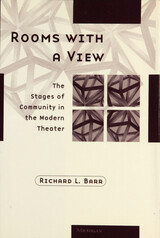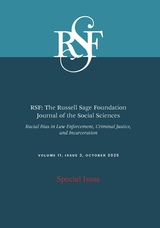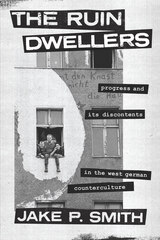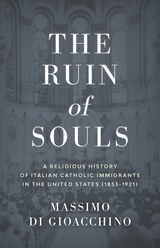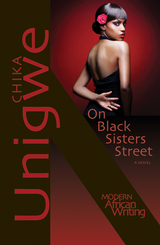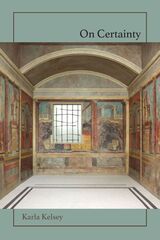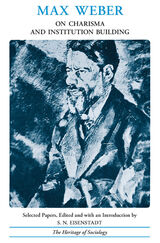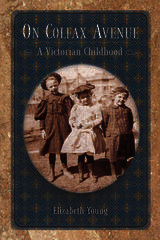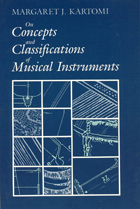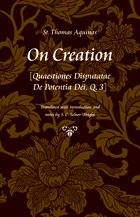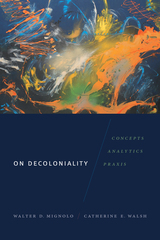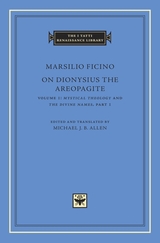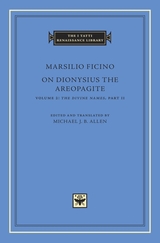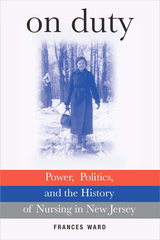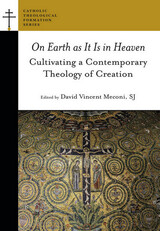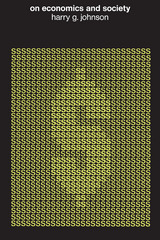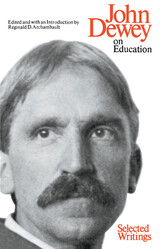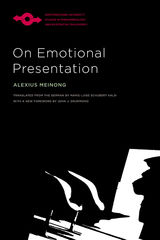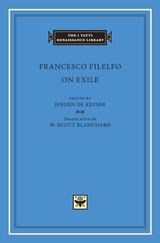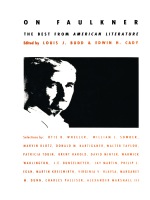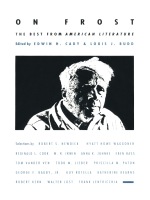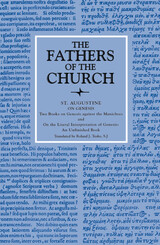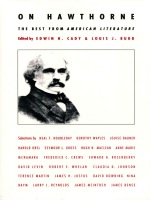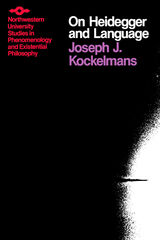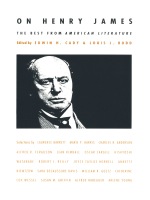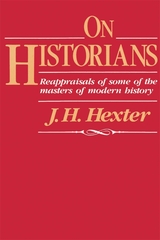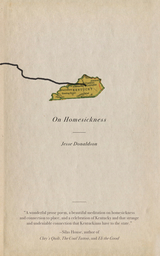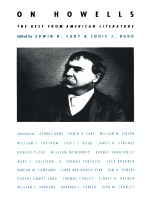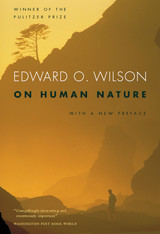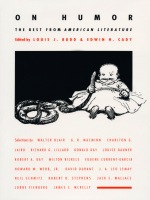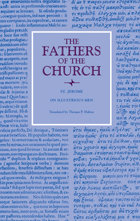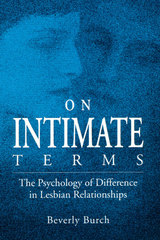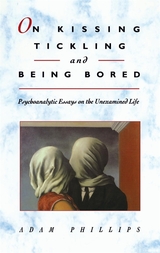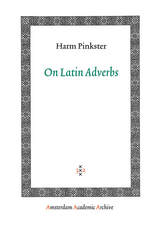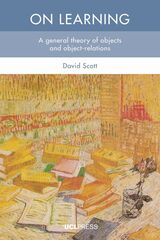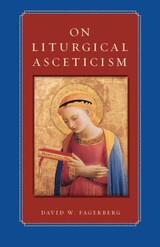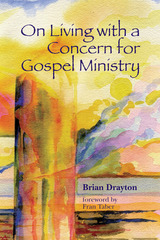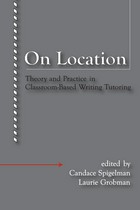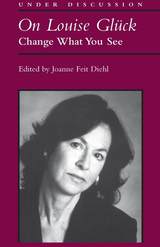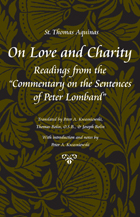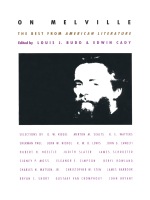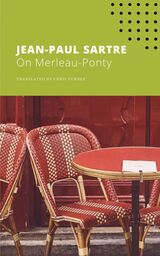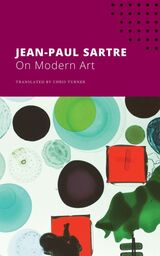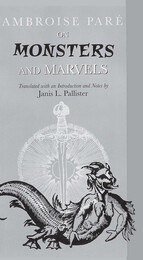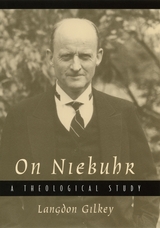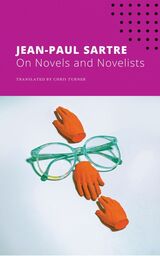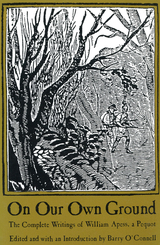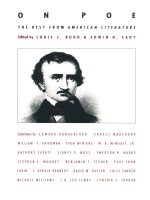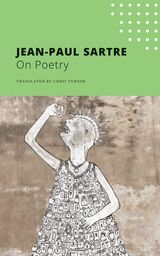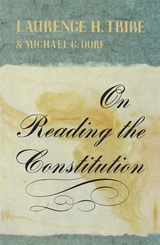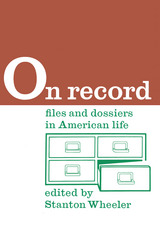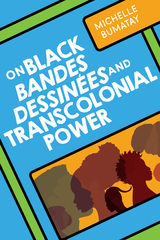 On Black Bandes Dessinées and Transcolonial Power
Michelle Bumatay
Ohio State University Press, 2025 On Black Bandes Dessinées and Transcolonial Power is the first book-length study in English about Black francophone cartoonists and their work. Michelle Bumatay decenters Eurocentric conceptions of francophone comic art and foregrounds the ubiquity of Western racial stereotypes encoded in mainstream French and Belgian bandes dessinées as well as the imbalance of power between the Global North and the Global South carried over from the colonial era. By examining a diversity of Black cartoonists’ aesthetic and material responses to the colonially inherited medium of bandes dessinées, she argues that their innovations constitute important reparative work that combats racial stereotypes and challenges transcolonial power imbalances.
Bumatay demonstrates how Barly Baruti, Papa Mfumu’Eto, Marguerite Abouet, Japhet Miagotar, and other Black cartoonists throughout the francophone world employ a range of tactics to tell their own stories. Through a balance of historical context and close readings, she shows how these artists represent and comment on their everyday lives in a postcolonial reality, expose and critique racial capitalism and exploitation, and provide new ways of seeing and understanding Black francophone peoples and cultures.
On Black Sisters Street: A Novel
Chika Unigwe
Ohio University Press, 2012 On Black Sisters Street tells the haunting story of four very different women who have left their African homeland for the riches of Europe—and who are thrown together by bad luck and big dreams into a sisterhood that will change their lives. Each night, Sisi, Ama, Efe, and Joyce stand in the windows of Antwerp’s red-light district, promising to make men’s desires come true—if only for half an hour. They offer their bodies to strangers but their hearts to no one, each focused on earning enough to get herself free, to send money home, or to save up for her own future. Drawn together by Sisi’s murder, the women must choose between their secrets and their safety. This first paperback edition of On Black Sisters Street celebrates the U.S. publication debut of Chika Unigwe, a brilliant new writer and a standout voice among contemporary African authors.
 ON BOARD THE USS MASON: THE WORLD WAR II DIARY OF JAMES A. DUNN
MANSEL G. BLACKFORD
Ohio State University Press, 2016 James A. Dunn was a signalman on the USS Mason, a destroyer escort during World War II, the only oceangoing warship in the navy to employ African Americans in positions other than cook or messmate. Manned by African American seamen (and commanded by white officers), the ship made ten crossings of the Atlantic from 1944 to 1945, escorting convoys of merchant ships to and from the United Kingdom and North Africa and operating in hunter-killer groups searching for German submarines.
Dunn kept a day-to-day diary during his spare time on board the Mason. Such diaries are a rarity, for the navy (and other armed services) forbade the keeping of diaries, fearful lest secret information fall into enemy hands. The diary chronicles the Mason’s wartime activities, from the first convoy to the final return to the United States. It captures the feeling and meaning of life on board with an immediacy not fully found in retrospective accounts. The diary accurately records the mortal danger Dunn and his shipmates were in while attacking enemy submarines or dealing with extreme weather conditions in the North Atlantic. It conveys the boredom the men encountered while confined on long, tedious convoys and the joy of shore leaves. Here is the daily life aboard ship—the duties and the pastimes that made shipboard life endurable.
Equally interesting, the diary reveals what it meant to be an African American in a white navy within a segregated American society, the shipboard tensions, and the shipboard cooperation and sense of unity. It also portrays the life of an African American onshore in the United States, Great Britain, and North Africa and the love story that unfolded between James and his wife, Jane.
Supplemented by additional sources, including interviews with Dunn, this diary is a personal view into an important part of American history. Like the Tuskegee airmen, the men of the USS Mason paved the way for desegregation in America’s armed forces, contributing to a civil rights movement that changed the face of a nation.
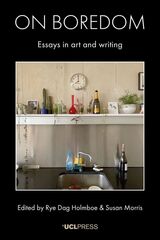 On Boredom: Essays in Art and Writing
Edited by Rye Dag Holmboe and Susan Morris
University College London, 2021 An idiosyncratic volume featuring artwork and essays on the history of boredom.
What do we mean when we say that we are bored? Contributors to this volume, which include artists, art historians, psychoanalysts, and a novelist, examine boredom in its manifold and uncertain reality. Each part of the book takes up a crucial moment in the history of boredom and presents it in a new light, taking the reader from the trials of the consulting room to the experience of hysteria in the nineteenth century. The book pays particular attention to boredom’s relationship with the sudden and rapid advances in technology that have occurred in recent decades, specifically technologies of communication, surveillance, and automation. On Boredom is idiosyncratic for its combination of image and text, and the artworks included in its pages—featuring Mathew Hale, Martin Creed, and Susan Morris—help turn this volume into a material expression of boredom itself. It will appeal to readers in the fields of art history, literature, cultural studies, and visual culture.
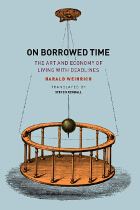 On Borrowed Time: The Art and Economy of Living with Deadlines
Harald Weinrich
University of Chicago Press, 2008 Life is short. This indisputable fact of existence has driven human ingenuity since antiquity, whether through efforts to lengthen our lives with medicine or shorten the amount of time we spend on work using technology. Alongside this struggle to manage the pressure of life’s ultimate deadline, human perception of the passage and effects of time has also changed. In On Borrowed Time, Harald Weinrich examines an extraordinary range of materials—from Hippocrates to Run Lola Run—to put forth a new conception of time and its limits that, unlike older models, is firmly grounded in human experience.
Weinrich’s analysis of the roots of the word time connects it to the temples of the skull, demonstrating that humans first experienced time in the beating of their pulses. Tracing this corporeal perception of time across literary, religious, and philosophical works, Weinrich concludes that time functions as a kind of sixth sense—the crucial sense that enables the other five.
Written with Weinrich’s customary narrative elegance, On Borrowed Time is an absorbing—and, fittingly, succinct—meditation on life’s inexorable brevity.
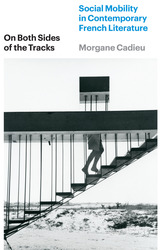 On Both Sides of the Tracks: Social Mobility in Contemporary French Literature
Morgane Cadieu
University of Chicago Press, 2024 An analysis of social mobility in contemporary French literature that offers a new perspective on figures who move between social classes.
Social climbers have often been the core characters of novels. Their position between traditional tiers in society makes them touchstones for any political and literary moment, including our own. Morgane Cadieu’s study looks at a certain kind of social climber in contemporary French literature whom she calls the parvenant. Taken from the French term parvenu, which refers to one who is newly arrived, a parvenant is a character who shuttles between social groups. A parvenant may become part of a new social class but devises literary ways to come back, constantly undoing any fixed idea of social affiliation.
Focusing on recent French novels and autobiographies, On Both Sides of the Tracks speaks powerfully to issues of emancipation and class. Cadieu offers a fresh critical look at tales of social mobility in the work of Annie Ernaux, Kaoutar Harchi, Michel Houellebecq, Édouard Louis, and Marie NDiaye, among others, shedding fascinating light on upward mobility today as a formal, literary problem.
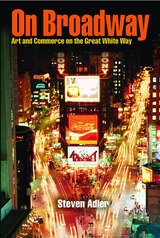 On Broadway: Art and Commerce on the Great White Way
Steven Adler
Southern Illinois University Press, 2004 At a critical, transitional moment in the history of Broadway—and, by extension, of American theatre itself—former Broadway stage manager Steven Adlerenlists insider perspectives from sixty-six practitioners and artists to chronicle the recent past and glimpse the near future of the Great White Way. From marquee names to behind-the-scenes power brokers, Adler has assembled a distinctly knowledgeable cast of theatre’s elite, including Stephen Sondheim, Arthur Laurents, Des McAnuff, Frank Rich, Robin Wagner, Rocco Landesman, Robert Longbottom, Todd Haimes, Bernard Gersten, and Alan Eisenberg. On Broadway: Art and Commerce on the Great White Way spotlights the differing vantage points of performers, artists, writers, managers, producers, critics, lawyers, theatre owners, union leaders, city planners, and other influential players. Each details his or her firsthand account of the creative and economic forces that have wrought extraordinary changes in the way Broadway theatre is conceived, produced, marketed, and executed. Once the paramount site of American theatre, Broadway today is becoming a tourist-driven, family-friendly, middle-class entertainment oasis in Midtown, an enterprise inextricably bound to the larger mosaic of national and international professional theatre. Accounting for this transformation and presaging Broadway’s identity for the twenty-first century, Adler and his interviewees assess the impact of the advent of corporate producers, the ascendance of not-for-profit theatres on Broadway, and the growing interdependence between regional and Broadway productions. Also critiqued are the important roles of the radical urban redevelopment staged in Times Square and the changing demographics and appetites of contemporary theatre audiences in New York and around the globe. Actors and administrators, performers and producers, theatre students and theatregoers will all benefit from the perceptive insights in this authoritative account of theatre making for the new millennium.
 On Building Peace: Rescuing the Nation-state and Saving the United Nations
Michael von der Schulenburg
Amsterdam University Press, 2017 Only 25 years after the end of the Cold War, the Western-dominated global order is fading and our hopes that liberal democracy would spread and bring world peace are evaporating.
While the West is increasingly preoccupied with its internal problems, threats to global peace have fundamentally changed: wars among nation-states and their alliances, once the dominant scourge of humankind, have almost disappeared and are replaced by a triple threat from intra-state armed conflicts, the failing of nation-states and the rise of belligerent non-state actors. The global peace we felt within our reach in 1991, is escaping us.
On Building Peace seeks the answers that the UN Charter can no longer provide. Once meant as a guarantor for peace, the Charter was never designed to deal with intra-state conflicts and today its core principles are eroded. The book makes two rather simple, but possibly unpopular suggestions for preserving future peace: first, we must rescue the nation-state, not despite but because of globalization, and second, we must not further undermine the United Nations, but expand its Charter for dealing collectively with this triple threat.
The struggle for survival in a world of limited resources and environmental degradation will deepen intra-state conflicts. We must prevent slipping back into a new round of Cold War-type confrontations and focus on finding collective solutions for building peace. For the sake of billions of people of future generations, we cannot get this wrong.
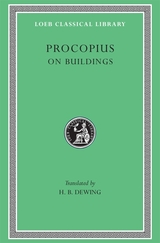 On Buildings
Procopius
Harvard University Press Late antique architecture.
Procopius, born at Caesarea in Palestine late in the fifth century, became a lawyer. In AD 527 he was made legal adviser and secretary of Belisarius, commander against the Persians, and went with Belisarius again in 533 against the Vandals and in 535 against the Ostrogoths. Sometime after 540 he returned to Constantinople. He may have been that Procopius who was prefect of Constantinople in 562, but the date of his death (after 558) is unknown.
Procopius’ History of the Wars in 8 books recounts the Persian Wars of emperors Justinus and Justinian down to 550 (2 books); the Vandalic War and after-events in Africa 532–546 (2 books); the Gothic War against the Ostrogoths in Sicily and Italy 536–552 (3 books); and a sketch of events to 554 (1 book). The whole consists largely of military history, with much information about peoples and places as well, and about special events. He was a diligent, careful, judicious narrator of facts and developments and shows good powers of description. He is just to the empire’s enemies and boldly criticizes emperor Justinian. Other works by Procopius are the Anecdota or Secret History—vehement attacks on Justinian, Theodora, and others; and the Buildings of Justinian (down to AD 558) including roads and bridges as well as churches, forts, hospitals, and so on in various parts of the empire.
The Loeb Classical Library edition of Procopius is in seven volumes.
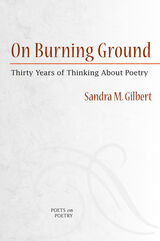 On Burning Ground: Thirty Years of Thinking About Poetry
Sandra M. Gilbert
University of Michigan Press, 2009 The highly esteemed literary critic and poet Sandra M. Gilbert is best known for her feminist literary collaborations with Susan Gubar, with whom she coauthored The Madwoman in the Attic: The Woman Writer and the Nineteenth-Century Literary Imagination, as well as the three-volume No Man's Land: The Place of the Woman Writer in the Twentieth Century. The essays assembled in On Burning Ground display Gilbert's astonishing range and explore poetics, personal identity, feminism, and modern and contemporary literature. Among the pieces gathered here are essays on D. H. Lawrence, Robert Lowell, Sylvia Plath, and Louise Glück, as well as reviews and previously unpublished articles. Sandra M. Gilbert is Distinguished Professor of English Emerita at the University of California, Davis. She is the recipient of Guggenheim, Rockefeller, NEH, and Soros Foundation fellowships and is the author of seven collections of poetry, including Kissing the Bread: New and Selected Poems 1969-1999 and, most recently, Belongings. Praise for Sandra M.Gilbert "Sandra Gilbert's poems are beautifully situated at the intersection of craft and feeling. Belongings is a stellar collection by a virtuoso with heart."
---Billy Collins ". . . brilliantly combines literary and cultural criticism with the intimacy of memoir."
---Joyce Carol Oates "An enduring contribution to the literature of grief."
---New York Times Book Review Poets on Poetry collects critical works by contemporary poets, gathering together the articles, interviews, and book reviews by which they have articulated the poetics of a new generation.
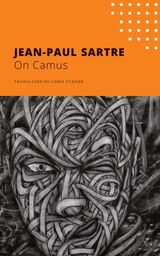 On Camus
Jean-Paul Sartre
Seagull Books, 2021 A window onto one of the most consequential friendships in philosophical history, that of Sartre and Camus—and on its end.
Iconic French novelist, playwright, and essayist Jean-Paul Sartre is widely recognized as one of the most important philosophers of the twentieth century, and his work has remained relevant and thought-provoking through the decades. The Seagull Sartre Library now presents some of his most incisive philosophical, cultural, and literary critical essays in twelve newly designed and affordable editions.
Sartre met Albert Camus in Occupied France in 1943, and from the start, they were an odd pair: one from the upper reaches of French society; the other, a pied-noir born into poverty in Algeria. The love of “freedom,” however, quickly bound them in friendship, while their fight for justice united them politically. But in 1951 the two writers fell out spectacularly over their literary and political views, their split a media sensation in France. This volume holds up a remarkable mirror to that fraught relationship. It features an early review by Sartre of Camus’s The Stranger; his famous 1952 letter to Camus that begins, “Our friendship was not easy, but I shall miss it”; and a moving homage written after Camus’s sudden death in 1960.
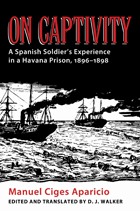 On Captivity: A Spanish Soldier's Experience in a Havana Prison, 1896-1898
Manuel Ciges Aparicio
University of Alabama Press, 2012 Normal0falsefalsefalseEN-USX-NONEX-NONEMicrosoftInternetExplorer4 On Captivity is the first translation into English of Del Cautiverio, Manuel Ciges Aparicio’s account of his imprisonment in the notorious La Cabaña fortress in Havana during the Cuban War of Independence (1895–98). Ciges enlisted in the Spanish army in 1893 at the age of twenty. He served in Africa and then in Cuba, where he opposed Spanish General Valeriano Weyler’s policies in Cuba as well as the war itself. Ciges soon found himself imprisoned and facing execution for treason as punishment for an article critical of Weyler’s conducting of the war that was intercepted by Spanish authorities before it could be published in the pro-Cuban Parisian paper L’Intransigeant. First published in book form in 1903, Ciges’s account includes detailed observations concerning prison organization, perceptions of political events and personalities of the time, as well as graphic descriptions of the daily life of the men confined in the infamous prison. Ciges is the only one of the so-called Generation of 1898—writers considered to have been deeply marked by el desastre (the loss of the colonies)—who was in Cuba during the war years. His witness to events there, colored by his stance as a freethinker and political skeptic, constitutes a significant historical document. Following his release from prison, Ciges returned to Spain where he resumed his career as an activist journalist and also earned acclaim as a translator and novelist. In time, his political allegiances shifted from socialism to liberal republicanism. He was acting as provincial governor of Avila when he was killed by unidentified assassins on August 4, 1936—eighteen days after the Falangist uprising against the Second Republic.
On Certainty
Karla Kelsey
Omnidawn, 2023 Lyrical poems that tell the story of a nameless woman navigating a technological dystopia.
In the poems of On Certainty, an unnamed woman in a strangely familiar dystopia narrates a story of power and decline, where the Tyrant has gained ascendency and the Philosopher is dying. Here, the Tyrant rules over a decimated ecology filled with android deer, burnt towns, and exhausted individuals dependent on virtual reality augmentation. In choosing whether to take the Philosopher’s place in a struggle against the Tyrant, the narrator must consider how her decision may perpetuate the currently existing catastrophic systems.
Weaving together speculative fiction, philosophical aphorism, lyric fragment, and documentary technique, On Certainty echoes the contemporary world that can feel simultaneously quotidian and strange.
 On Chantal Akerman
Patricia White, special issue editor
Duke University Press The milestone 100th issue of Camera Obscura recognizes the work and legacy of Belgian filmmaker Chantal Akerman (1950–2015). Arguably the most important figure in feminist film culture, Akerman is central to Camera Obscura's own legacy, and her film Jeanne Dielman, 23 quai du Commerce, 1080 Bruxelles was covered in one of the first issues of the journal. The contributors to this special issue return to Akerman's work, illuminating her films, writings, and installations through new criticism and discussion. The issue includes a rich collection of newly published photographs, scholarly essays by leading Akerman scholars, a filmography and installation list, and rare interviews with Akerman's close collaborators.
Contributors. Claire Atherton, Janet Bergstrom, Kelley Conway, Sandy Flitterman-Lewis, Ute Holl, Heike Klippel, Eva Kuhn, Matias Lavin, Alisa Lebow, Brenda Longfellow, Babette Mangolte, Ivone Margulies, Michael Mazière, Eva Meyer, Sandra Percival, Jane Stein, Cécile Tourneur, Maureen Turim, Sonia Wieder-Atherton, Patricia White
On Charisma and Institution Building: Selected Writings
Max Weber
University of Chicago Press, 1968 This selection from Max Weber's writings presents his variegated work from one central focus, the relationship between charisma on the one hand, and the process of institution building in the major fields of the social order such as politics, law, economy, and culture and religion on the other. That the concept of charisma is crucially important for understanding the processes of institution building is implicit in Weber's own writings, and the explication of this relationship is perhaps the most important challenge which Weber's work poses for modern sociology.
Max Weber on Charisma and Institution Building is a volume in "The Heritage of Sociology," a series edited by Morris Janowitz. Other volumes deal with the writings of George Herbert Mead, William F. Ogburn, Louis Wirth, W. I. Thomas, Robert E. Park, and the Scottish Moralists—Adam Smith, David Hume, Adam Ferguson, and others.
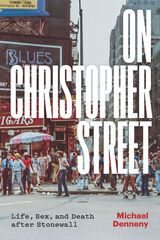 On Christopher Street: Life, Sex, and Death after Stonewall
Michael Denneny
University of Chicago Press, 2023 Through the eyes of publishing icon Michael Denneny, this cultural autobiography traces the evolution of the US’s queer community in the three decades post-Stonewall.
The Stonewall Riots of 1969 and the AIDS crisis of the 1980s have been captured in minute detail, and rightly memorialized in books, on tv, and in film as pivotal and powerful moments in queer history. Yet what about the moments in between—the tumultuous decade post-Stonewall when the queer community’s vitality and creativity exploded across the country, even as the AIDS crisis emerged?
Michael Denneny was there for it all. As a founder and editor of the wildly influential magazine Christopher Street and later as the first openly gay editor at a major publishing house, Denneny critically shaped publishing around gay subjects in the 1970s and beyond. At St. Martin’s Press, he acquired a slew of landmark titles by gay authors—many for his groundbreaking Stonewall Inn Editions—propelling queer voices into the mainstream cultural conversation. On Christopher Street is Denneny’s time machine, going back to that heady period to lay out the unfolding geographies and storylines of gay lives and capturing the raw immediacy of his and his contemporaries’ daily lives as gay people in America. Through forty-one micro-chapters, he uses his journal writings, articles, interviews, and more from the 1970s and ‘80s to illuminate the twists and turns of a period of incomparable cultural ferment.
One of the few surviving voices of his generation, Denneny transports us back in time to share those vibrant in-between moments in gay lives—the joy, sorrow, ecstasy, and energy—across three decades of queer history.
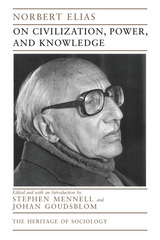 On Civilization, Power, and Knowledge: Selected Writings
Norbert Elias
University of Chicago Press, 1997 Nobert Elias (1897-1990) is among the great sociologists of the twentieth century. Born in Germany, Elias earned a doctorate in philosophy and then turned to sociology, working with Max Weber's younger brother, Alfred Weber, and with Karl Mannheim. He later fled the Nazi regime in 1935 and spent most of his life in Britain. He is best known for his book, The Civilizing Process, wherein he traces the subtle changes in manners among the European upper classes since the Middle Ages, and shows how those seemingly innocuous changes in etiquette reflected profound transformations of power relations in society. He later applied these insights to a wide range of subjects, from art and culture to the control of violence, the sociology of sports, the development of knowledge and the sciences, and the methodology of sociology.
This volume is a carefully chosen collection of Elias's most important writings and includes many of his most brilliant ideas. The development of Elias's thinking during the course of his long career is traced along with a discussion of how his work relates to other major sociologists and how the various selections are interconnected. The result is a consistent and stimulating look at one of sociology's founding thinkers.
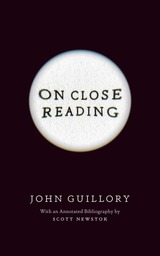 On Close Reading
John Guillory
University of Chicago Press, 2025 John Guillory considers close reading within the larger history of reading and writing as cultural techniques.
At a time of debate about the future of “English” as a discipline and the fundamental methods of literary study, few terms appear more frequently than “close reading,” now widely regarded as the core practice of literary study. But what exactly is close reading, and where did it come from? Here John Guillory, author of the acclaimed Professing Criticism, takes up two puzzles. First, why did the New Critics—who supposedly made close reading central to literary study—so seldom use the term? And second, why have scholars not been better able to define close reading?
For Guillory, these puzzles are intertwined. The literary critics of the interwar period, he argues, weren’t aiming to devise a method of reading at all. These critics were most urgently concerned with establishing the judgment of literature on more rigorous grounds than previously obtained in criticism. Guillory understands close reading as a technique, a particular kind of methodical procedure that can be described but not prescribed, and that is transmitted largely by demonstration and imitation.
Guillory’s short book will be essential reading for all college teachers of literature. An annotated bibliography, curated by Scott Newstok, provides a guide to key documents in the history of close reading along with valuable suggestions for further research.
On Colfax Avenue: A Victorian Childhood
Elizabeth Young
University Press of Colorado, 2004 "Everyone was moving to Denver, which was mushrooming all over the prairie and giving every evidence of becoming a metropolis of real proportion" - so recalls Elizabeth Young of her childhood on Colfax Avenue. Her youth ran parallel to that of her hometown: she grew up in the 1890s in the midst of Denver's rapid metamorphosis from frontier town to modern city. Young's memoir provides vivid glimpses of the people and events of this heady era, along with the adventuresome spirit that animated them. On Colfax Avenue captures the sense of joyful self-discovery that comes with childhood - both the author's and Denver's.
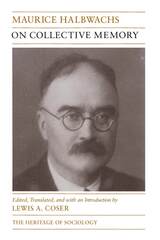 On Collective Memory
Maurice Halbwachs
University of Chicago Press, 1992 How do we use our mental images of the present to reconstruct our past? Maurice Halbwachs (1877-1945) addressed this question for the first time in his work on collective memory, which established him as a major figure in the history of sociology. This volume, the first comprehensive English-language translation of Halbwach's writings on the social construction of memory, fills a major gap in the literature on the sociology of knowledge. Halbwachs' primary thesis is that human memory can only function within a collective context. Collective memory, Halbwachs asserts, is always selective; various groups of people have different collective memories, which in turn give rise to different modes of behavior. Halbwachs shows, for example, how pilgrims to the Holy Land over the centuries evoked very different images of the events of Jesus' life; how wealthy old families in France have a memory of the past that diverges sharply from that of the nouveaux riches; and how working class construction of reality differ from those of their middle-class counterparts.
With a detailed introduction by Lewis A. Coser, this translation will be an indispensable source for new research in historical sociology and cultural memory.
Lewis A. Coser is Distinguished Professor of Sociology Emeritus at the State University of New York and Adjunct Professor of Sociology at Boston College.
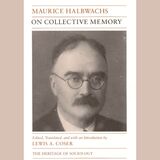 On Collective Memory
Maurice Halbwachs
University of Chicago Press, 1992 This is an auto-narrated audiobook version of this book.
How do we use our mental images of the present to reconstruct our past? Maurice Halbwachs (1877-1945) addressed this question for the first time in his work on collective memory, which established him as a major figure in the history of sociology. This volume, the first comprehensive English-language translation of Halbwach's writings on the social construction of memory, fills a major gap in the literature on the sociology of knowledge. Halbwachs' primary thesis is that human memory can only function within a collective context. Collective memory, Halbwachs asserts, is always selective; various groups of people have different collective memories, which in turn give rise to different modes of behavior. Halbwachs shows, for example, how pilgrims to the Holy Land over the centuries evoked very different images of the events of Jesus' life; how wealthy old families in France have a memory of the past that diverges sharply from that of the nouveaux riches; and how working class construction of reality differ from those of their middle-class counterparts.
With a detailed introduction by Lewis A. Coser, this translation will be an indispensable source for new research in historical sociology and cultural memory.
Lewis A. Coser is Distinguished Professor of Sociology Emeritus at the State University of New York and Adjunct Professor of Sociology at Boston College.
On Concepts and Classifications of Musical Instruments
Margaret J. Kartomi
University of Chicago Press, 1990 Kartomi first moves through a culture-specific inspection of several societies in Europe, Asia, and Africa, and then, synthesizing current ethnomusicological trends, proceeds to make a large-scale comparative study of classification schemes and the concepts which govern them.
 On Consciousness
Ted Honderich
University of Pittsburgh Press, 2004
Where does consciousness exist? In the mind? In the external world? On Consciousness features the most up-to-date considerations of the subject by the internationally renowned philosopher Ted Honderich. In this series of meditations, he systematically contemplates the very nature of consciousness as well as the separate question of how consciousness is related to the brain.
His careful, if not conventional, argument begins with Anomalous Monism, a doctrine that holds that mind and brain are one thing with two kinds of properties not lawfully connected. Honderich goes on to consider the thinking of neuroscientists and functionalists who suppose conscious events are caught for us by their causes and effects. He reconsiders humble truths about the mind as well as his own Union Theory, and the anti-individualism that disconnects the mind from the brain.
Honderich examines each of these beliefs in terms of whether they satisfy agreed criteria for acceptable accounts of consciousness. Because each is found wanting, he puts forth a radically new theory of consciousness as experience. Rather than explaining consciousness in terms of awareness, he develops a new kind of materialism, which transcends the traditional labels given to it by philosophers.
On Consciousness respects the most resilient proposition in the history of the philosophy of mind-that consciousness is not just cellular. Honderich's concept of perceptual consciousness consists in a world that is not merely mental, for it is spatial and contains physical objects. This shift to a near-physicalism asserts that all of consciousness is open to science. Proceeding logically through his arguments, Honderich offers a clearly written, refreshing dose of persuasive realism.
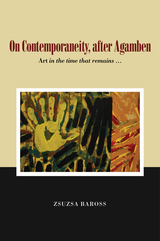 On Contemporaneity, after Agamben: Art in the time that remains ...
Zsuzsa Baross
Sussex Academic Press, 2022 If the philosopher Alain Badiou asks of what present are we the living witnesses in philosophy today, the writing in this second volume of essays addresses a related question to works of art today: what art can (still) be at the time of a global existential crisis, in a world living at the edge of, if not inexorably moving toward, a final ecological catastrophe? In four essays the author turns to works of art she considers critical with regard to this question of art situating itself at the limit: the last film of Jean-Luc Godard, Adieu au langage;; Pasolini's faux documentary, La Rabbia (Rage);, a fragment of a Paul Celan poem, as questioned by Jacques Derrida, the plastic art of Abdel Abdemassad and Anselm Kiefer. She interrogates these chronologically disparate works neither as representations or diagnoses of a present in a change of epoch, a word in crisis or at the edge of a catastrophe, nor as works that are symptomatic of such times and worlds. Instead, the writing metaphorically 'listens to' voices that arrive from inside a world without an exit as exemplary responses to the question: what art can (still) be at such times, in such worlds? What creation new gesture or performative or language can be commensurate with the intensity of forces pressing against such presents? These are some of the questions that this second volume, under a borrowed sub-title from Giorgio Agamben, addresses to Art. In four essays punctuated by shorter texts on Derrida's letters and Cixous' recent auto-fictional works the writing patiently observes how each work in the small corpus gives a new sense to the term and is a singular creation of a unique instance of contemporaneity.
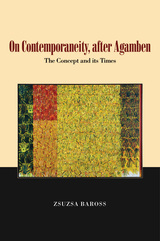 On Contemporaneity, after Agamben: The Concept and its Times
Zsuzsa Baross
Sussex Academic Press, 2022 Who are our contemporaries today? Alain Badiou, Jean-Luc Nancy, or Giorgio Agamben, or the already neglected Althusser or Lacoue-Labarthe? From among the thinkers of the last great generationof the past century, who are the precursors whose voice is strong enough to speak to our present today? when the nature of time itself is uncertain: a time of mutation(Nancy), a change of epoch(Blanchot), an epoch without an epoch(Stiegler), or more catastrophically, the time of the geocide (Deguy)? Is it Bataille (Inner Experience) or Blanchot (The Writing of the Disaster) who anticipates the future that is already our present? Or Derrida who announced the unsurpassable dilemma of the law of hospitality? Announced a future to be presented only as a monstrosity? Or is it rather Deleuze, whose geo-philosophy already dispenses with the subject, privileges matter over spirit, and subordinates the great movements of peoples and animals of history and revolution, the political and the social as relative to the de- re-territorializing powers of the forces of the Earth? Or again, is it not philosophy but rather art that measures up to the intensity of the forces pressing against us in the present? The exhausted prose of Beckett, the broken verse of Celan? The stammer of Artaud?
 On Course: A Week-by-Week Guide to Your First Semester of College Teaching
James M. Lang
Harvard University Press, 2008 You go into teaching with high hopes: to inspire students, to motivate them to learn, to help them love your subject. Then you find yourself facing a crowd of expectant faces on the first day of the first semester, and you think “Now what do I do?”
Practical and lively, On Course is full of experience-tested, research-based advice for graduate students and new teaching faculty. It provides a range of innovative and traditional strategies that work well without requiring extensive preparation or long grading sessions when you’re trying to meet your own demanding research and service requirements. What do you put on the syllabus? How do you balance lectures with group assignments or discussions—and how do you get a dialogue going when the students won’t participate? What grading system is fairest and most efficient for your class? Should you post lecture notes on a website? How do you prevent cheating, and what do you do if it occurs? How can you help the student with serious personal problems without becoming overly involved? And what do you do about the student who won’t turn off his cell phone?
Packed with anecdotes and concrete suggestions, this book will keep both inexperienced and veteran teachers on course as they navigate the calms and storms of classroom life.
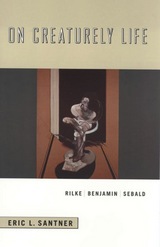 On Creaturely Life: Rilke, Benjamin, Sebald
Eric L. Santner
University of Chicago Press, 2006 In his Duino Elegies, Rainer Maria Rilke suggests that animals enjoy direct access to a realm of being—the open—concealed from humans by the workings of consciousness and self-consciousness. In his own reading of Rilke, Martin Heidegger reclaims the open as the proper domain of human existence but suggests that human life remains haunted by vestiges of an animal-like relation to its surroundings. Walter Benjamin, in turn, was to show that such vestiges—what Eric Santner calls the creaturely—have a biopolitical aspect: they are linked to the processes that inscribe life in the realm of power and authority.
Santner traces this theme of creaturely life from its poetic and philosophical beginnings in the first half of the twentieth century to the writings of the enigmatic German novelist W. G. Sebald. Sebald’s entire oeuvre, Santner argues, can be seen as an archive of creaturely life. For Sebald, the work on such an archive was inseparable from his understanding of what it means to engage ethically with another person’s history and pain, an engagement that transforms us from indifferent individuals into neighbors.
An indispensable book for students of Sebald, On Creaturely Life is also a significant contribution to critical theory.
 On Cultural Freedom: An Exploration of Public Life in Poland and America
Jeffrey C. Goldfarb
University of Chicago Press, 1983 In this timely study, Jeffrey C. Goldfarb explores the nature and prospects of cultural freedom by examining the conditions that favor or threaten its development in the political East and West.
Goldfarb—who examines conditions in the Soviet Union, the United States, and their respective European allies—focuses most closely upon Poland and the United States. He investigates a wide range of concrete cases, including the Polish opposition movement and Solidarity, the migration of artists, the American television and magazine industries, American philanthropy, and communist cultural conveyor belts.
From these cases, Goldfarb derives a definitive set of sociological conditions for cultural freedom: critical creativity which resists systematic constraints, continuity of cultural tradition, and a relatively autonomous public realm for the reception of culture. Cultural freedom, Goldfarb shows, is not a static state but a process of achievement. Its parameters and content are determined by social practice in cultural institutions and by their relations with other components and the totality of social structure.
So defined, cultural freedom is transformed from an ideological concept into one with real critical and analytical power. Through it we can appreciate the invisible nature of constraint in the West and the unapparent but acting supports of cultural freedom existing in socialist countries. Most importantly, Goldfarb's conclusions provide a framework for understanding more clearly than before the circumstance of cultural freedom in both East and West so that citizens may utilize their full creative abilities as they address the problems of the present day.
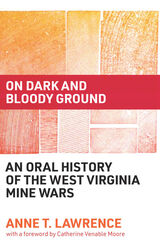 On Dark and Bloody Ground: An Oral History of the West Virginia Mine Wars
Anne T. Lawrence
West Virginia University Press, 2021 An oral history of the West Virginia Mine Wars published to coincide with the centennial of the Battle of Blair Mountain.
In 1972 Anne Lawrence came to West Virginia at the invitation of the Miners for Democracy movement to conduct interviews with participants in, and observers of, the Battle of Blair Mountain and other Appalachian mine wars of the 1920s and ’30s. The set of oral histories she collected—the only document of its kind—circulated for many years as an informal typescript volume, acquiring an almost legendary status among those intrigued by the subject. Key selections from it appear here for the first time as a published book, supplemented with introductory material, maps, and photographs. The volume’s vivid, conversational mode invites readers into miners’ lived experiences and helps us understand why they took up arms to fight anti-union forces in some of the nation’s largest labor uprisings.
Published to coincide with the celebration of the Blair Mountain centennial in 2021, On Dark and Bloody Ground includes a preface by public historian Catherine Venable Moore and an afterword by Cecil E. Roberts of the United Mine Workers of America.
On Decoloniality: Concepts, Analytics, Praxis
Walter D. Mignolo and Catherine E. Walsh
Duke University Press, 2018 In On Decoloniality Walter D. Mignolo and Catherine E. Walsh explore the hidden forces of the colonial matrix of power, its origination, transformation, and current presence, while asking the crucial questions of decoloniality's how, what, why, with whom, and what for. Interweaving theory-praxis with local histories and perspectives of struggle, they illustrate the conceptual and analytic dynamism of decolonial ways of living and thinking, as well as the creative force of resistance and re-existence. This book speaks to the urgency of these times, encourages delinkings from the colonial matrix of power and its "universals" of Western modernity and global capitalism, and engages with arguments and struggles for dignity and life against death, destruction, and civilizational despair.
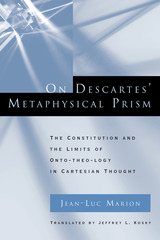 On Descartes' Metaphysical Prism: The Constitution and the Limits of Onto-theo-logy in Cartesian Thought
Jean-Luc Marion
University of Chicago Press, 1999 Does Descartes belong to metaphysics? What do we mean when we say "metaphysics"? These questions form the point of departure for Jean-Luc Marion's groundbreaking study of Cartesian thought. Analyses of Descartes' notion of the ego and his idea of God show that if Descartes represents the fullest example of metaphysics, he no less transgresses its limits. Writing as philosopher and historian of philosophy, Marion uses Heidegger's concept of metaphysics to interpret the Cartesian corpus—an interpretation strangely omitted from Heidegger's own history of philosophy. This interpretation complicates and deepens the Heideggerian concept of metaphysics, a concept that has dominated twentieth-century philosophy. Examinations of Descartes' predecessors (Aristotle, Augustine, Aquinas, and Suarez) and his successors (Leibniz, Spinoza, and Hegel) clarify the meaning of the Cartesian revolution in philosophy.
Expertly translated by Jeffrey Kosky, this work will appeal to historians of philosophy, students of religion, and anyone interested in the genealogy of contemporary thought and its contradictions.
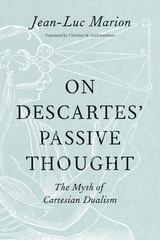 On Descartes’ Passive Thought: The Myth of Cartesian Dualism
Jean-Luc Marion
University of Chicago Press, 2018 On Descartes’ Passive Thought is the culmination of a life-long reflection on the philosophy of Descartes by one of the most important living French philosophers. In it, Jean-Luc Marion examines anew some of the questions left unresolved in his previous books about Descartes, with a particular focus on Descartes’s theory of morals and the passions.
Descartes has long been associated with mind-body dualism, but Marion argues here that this is a historical misattribution, popularized by Malebranche and popular ever since both within the academy and with the general public. Actually, Marion shows, Descartes held a holistic conception of body and mind. He called it the meum corpus, a passive mode of thinking, which implies far more than just pure mind—rather, it signifies a mind directly connected to the body: the human being that I am. Understood in this new light, the Descartes Marion uncovers through close readings of works such as Passions of the Soul resists prominent criticisms leveled at him by twentieth-century figures like Husserl and Heidegger, and even anticipates the non-dualistic, phenomenological concepts of human being discussed today. This is a momentous book that no serious historian of philosophy will be able to ignore.
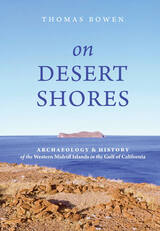 On Desert Shores: Archaeology and History of the Western Midriff Islands in the Gulf of California
Thomas Bowen
University of Utah Press, 2022 Hot, arid, and uninhabited, the western Midriff Islands lie in the Gulf of California, surrounded by an often-treacherous sea. Given these conditions, why would ancient people go there, and why would anybody go there today? Thomas Bowen addresses these questions in the first comprehensive history of these islands.
Bowen draws on a wide range of sources, including the first archaeological field work ever conducted on the islands, written accounts dating back to the sixteenth century, oral histories of native people, contemporary interviews, and his own firsthand experiences. Among those cast in the islands’ historical drama are the Seri (Comcaac) people of Sonora, the extinct Cochimís of Baja California, Spanish explorers, Jesuit missionaries, pearl fishers, egg collectors, guano miners, hydrographers, cartographers, small-scale Mexican fishermen, recreational anglers, writers, photographers, ecotourists, shipwreck victims, and, most importantly, scientists. The final chapter documents the impact of this human activity on the islands’ ecosystems and examines conservation efforts now underway. Compelling and richly illustrated, this broadly based work provides a unique picture of these extraordinary islands.
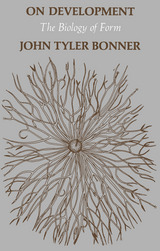 On Development: The Biology of Form
John Tyler Bonner
Harvard University Press, 1974 On Development is, as John Tyler Bonner says, “a book on ideas,” the ideas at stake in the contest to unravel the mechanisms of life. This fluent discussion of developmental biology synthesizes decades of intensive progress in specialized areas of the science: from the dramatic deciphering of the genetic code to detailed analyses of animal behavior patterns. Placing these discoveries in an evolutionary context, Bonner explores the continuities and the transitoriness of individual lives and individual forms.
He begins by discussing the ubiquity among organisms of developmental cycles and their universal properties, including senescence and death. He argues that the life cycle itself is an object of natural selection and shows how, in any species, it reflects the evolutionary tradeoff between energy requirements of the individual and reproductive efficiency of the species. Although nucleic acids are thought to be the ultimate and fundamental source of genetic regulation, Bonner points out that a massive amount of information required for normal development is not directly controlled by nuclear DNA during the life cycle. Each life cycle is governed by some immediate instructions from the genes and by many gene-initiated instructions that were given in previous life cycles and have accumulated in various parts of the fertilized egg. All of these instructions taken together govern the development of a new organism.
Acknowledging the great value of reductionist theories in biology, Bonner constructs his synthetic view of development without resorting to vitalist concepts or to hand-waving explanations. He draws examples and evidence from more than half a century of biological research, from sources as diverse as Spemann and Spiegelman. Certain organisms, such as the cellular slime molds, upon which Bonner himself has conducted a number of original experiments, and the social insects provide crucial examples of dramatic evolutionary increments in biological complexity and offer insight into the control mechanisms that make such advances possible.
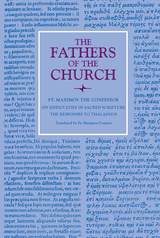 On Difficulties in Sacred Scripture: The Responses to Thalassios
St. Maximos the Confessor
Catholic University of America Press, 2018 Maximos the Confessor (ca. 580-662) is now widely recognized as one of the greatest theological thinkers, not simply in the entire canon of Greek patristic literature, but in the Christian tradition as a whole. A peripatetic monk and prolific writer, his penetrating theological vision found expression in an unparalleled synthesis of biblical exegesis, ascetic spirituality, patristic theology, and Greek philosophy, which is as remarkable for its conceptual sophistication as for its labyrinthine style of composition. On Difficulties in Sacred Scripture, presented here for the first time in a complete English translation (including the 465 scholia), contains Maximos’s virtuosic theological interpretations of sixty-five difficult passages from the Old and New Testaments. Because of its great length, along with its linguistic and conceptual difficulty, the work as a whole has been largely neglected. Yet alongside the Ambigua to John, On Difficulties in Sacred Scripture: The Responses to Thalassios deserves to be ranked as the Confessor’s greatest work and one of the most important patristic treatises on the interpretation of Scripture, combining the interconnected traditions of monastic devotion to the Bible, the biblical exegesis of Origen, the sophisticated symbolic theology of Dionysius the Areopagite, and the rich spiritual anthropology of Greek Christian asceticism inspired by the Cappadocian Fathers.
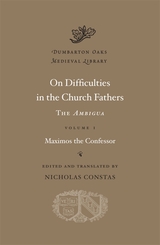 On Difficulties in the Church Fathers: The Ambigua
Maximos the Confessor
Harvard University Press, 2014 Maximos the Confessor (580–662) occupies a unique position in the history of Byzantine philosophy, theology, and spirituality. His profound spiritual experiences and penetrating theological vision found complex and often astonishing expression in his unparalleled command of Greek philosophy, making him one of the most challenging and original Christian thinkers of all time. So thoroughly did his thought come to influence the Byzantine theological tradition that it is impossible to trace the subsequent history of Orthodox Christianity without knowledge of his work.
The Ambigua (or “Book of Difficulties”) is Maximos’s greatest philosophical and doctrinal work, in which his daring originality, prodigious talent for speculative thinking, and analytical acumen are on lavish display. In the Ambigua, a broad range of theological topics—cosmology, anthropology, the philosophy of mind and language, allegory, asceticism, and metaphysics—are transformed in a synthesis of Aristotelian logic, Platonic metaphysics, Stoic psychology, and the arithmetical philosophy of a revived Pythagoreanism. The result is a labyrinthine map of the mind’s journey to God that figured prominently in the Neoplatonic revival of the Komnenian Renaissance and the Hesychast Controversies of the Late Byzantine period.
This remarkable work has never before been available in a critically-based edition or English translation.
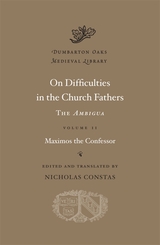 On Difficulties in the Church Fathers: The Ambigua
Maximos the Confessor
Harvard University Press, 2014 Maximos the Confessor (580–662) occupies a unique position in the history of Byzantine philosophy, theology, and spirituality. His profound spiritual experiences and penetrating theological vision found complex and often astonishing expression in his unparalleled command of Greek philosophy, making him one of the most challenging and original Christian thinkers of all time. So thoroughly did his thought come to influence the Byzantine theological tradition that it is impossible to trace the subsequent history of Orthodox Christianity without knowledge of his work.
The Ambigua (or “Book of Difficulties”) is Maximos’s greatest philosophical and doctrinal work, in which his daring originality, prodigious talent for speculative thinking, and analytical acumen are on lavish display. In the Ambigua, a broad range of theological topics—cosmology, anthropology, the philosophy of mind and language, allegory, asceticism, and metaphysics—are transformed in a synthesis of Aristotelian logic, Platonic metaphysics, Stoic psychology, and the arithmetical philosophy of a revived Pythagoreanism. The result is a labyrinthine map of the mind’s journey to God that figured prominently in the Neoplatonic revival of the Komnenian Renaissance and the Hesychast Controversies of the Late Byzantine period.
This remarkable work has never before been available in a critically-based edition or English translation.
On Dionysius the Areopagite
Marsilio Ficino
Harvard University Press, 2015 In 1490/92 Marsilio Ficino, the Florentine scholar-philosopher-magus who was largely responsible for the Renaissance revival of Plato, made new translations of, with running commentaries on, two treatises he believed were the work of Dionysius the Areopagite, the disciple of St. Paul mentioned in the Acts of the Apostles. His aim was to show how these two treatises (in fact the achievement of a sixth-century Christian follower of the Neoplatonist Proclus) had inspired pagan thinkers in the later Platonic tradition like Plotinus and Iamblichus. These major products of fifteenth-century Christian Platonism are here presented in new critical editions accompanied by English translations, the first into any modern language.
On Dionysius the Areopagite
Marsilio Ficino
Harvard University Press, 2015 In 1490/92 Marsilio Ficino, the Florentine scholar-philosopher-magus who was largely responsible for the Renaissance revival of Plato, made new translations of, with running commentaries on, two treatises he believed were the work of Dionysius the Areopagite, the disciple of St. Paul mentioned in the Acts of the Apostles. His aim was to show how these two treatises (in fact the achievement of a sixth-century Christian follower of the Neoplatonist Proclus) had inspired pagan thinkers in the later Platonic tradition like Plotinus and Iamblichus. These major products of fifteenth-century Christian Platonism are here presented in new critical editions accompanied by English translations, the first into any modern language.
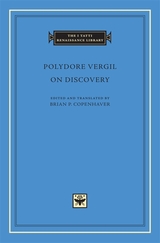 On Discovery
Polydore VergilEdited and translated by Brian P. Copenhaver
Harvard University Press, 2002 The Italian humanist Polydore Vergil (1470-1555) was born in Urbino but spent most of his life in early Tudor England. His most popular work, On Discovery (De inventoribus rerum, 1499), was the first comprehensive account of discoveries and inventions written since antiquity. Thirty Latin editions of this work were published in Polydore's lifetime, and by the eighteenth century more than a hundred editions had appeared in eight languages, including Russian. On Discovery became a key reference for anyone who wanted to know about "firsts" in theology, philosophy, science, technology, literature, language, law, material culture, and other fields. Polydore took his information from dozens of Greek, Roman, biblical, and Patristic authorities. His main point was to show that many Greek and Roman claims for discovery were false and that ancient Jews or other Asian peoples had priority. This is the first English translation of a critical edition based on the Latin texts published in Polydore Vergil's lifetime.
 On Doubt
Vilém Flusser
University of Minnesota Press, 2014 In On Doubt, Vilém Flusser refines Martin Heidegger’s famous declaration that “language is the dwelling of Being.” For Flusser, “the word is the dwelling of being,” because in fact, in the beginning, there was the word. On Doubt is a treatise on the human intellect, its relation to language, and the reality-forming discourses that subsequently emerge. For Flusser, the faith that the modern age places in Cartesian doubt plays a role similar to the one that faith in God played in previous eras—a faith that needs to be challenged. Descartes doubts the world through his proposition cogito ergo sum, but leaves doubt itself untouched as indubitable and imperious. His cogito ergo sum may have proved to the Western intellect that thoughts exist, but it did not prove the existence of that which thinks: one can eliminate thinking and yet continue being. Therefore, should we not doubt doubt itself? Should we not try to go beyond this last step of Cartesian doubt and look for a new faith? The twentieth century has seen many attempts to defeat Cartesian doubt, however, this doubt of doubt has instead generated a complete loss of faith, which the West experiences as existential nihilism. Hence, the emergent emptying of values that results from such extreme doubt. Everything loses its meaning. Can this climate be overcome? Will the West survive the modern age?
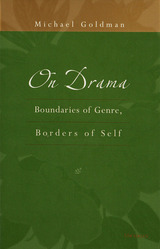 On Drama: Boundaries of Genre, Borders of Self
Michael Goldman
University of Michigan Press, 2000 The latest book by noted critic and scholar Michael Goldman provides fresh and unexpected insights into the role played by genre in the experience of drama. Challenging the view that genre is by definition exclusion, and that its policing of boundaries is out of place in the neighborhood of art, Michael Goldman suggests that the lens of genre can provide keen insights for our understanding and appreciation of drama. For Goldman, it is important to consider drama as an exper-ience, an ongoing moment-to-moment process for audiences or readers. Everything changes, says Goldman, when we stop to think of genre as not entirely unlike rhyme or ambiguity--features whose primary interest for readers or audiences is as something that happens to us in a poem or play, as it happens. It is valuable to see that--as it operates in drama--the instability of the subject of genre has a specific and unique texture, one that can offer useful insights into our experience as viewers of and participants in drama. In this light, discussions of genre can help us to understand what drama as a special kind of social practice does for and with our lives. It is important that we work toward understanding the process of thinking about drama in this light--that we understand the power and complexity of drama--and Michael Goldman aims to do so in this book. Michael Goldman is Professor of English, Princeton University. He is author of a number of books, including Acting and Action in Shakespearean Tragedy, Shakespeare and the Energies of Drama, Ibsen: The Dramaturgy of Fear, and The Actor's Freedom: Toward a Theory of Drama.
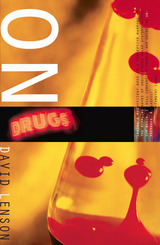 On Drugs
David Lenson
University of Minnesota Press, 1995 A critical exploration of the user’s perspective on drug consciousness-now in paperback! Engaging, articulate, and brilliantly argued, On Drugs is destined to become a revolutionary classic that redefines what it means to be “high.” Calling for the acceptance of a “diversity of consciousness,” Lenson delivers a searing critique of the War on Drugs as an effort based, like all attempts to eradicate “getting high,” on an incomplete understanding of human nature. In lucid prose, Lenson ventures outside the conventional genres of drug writing and offers a new look at the drug debate from a lost, and often forbidden, point of view: the user’s. Walking a fine line between the antidrug hysteria of the 1980s and an uncritical advocacy of drug use, he describes in provocative detail the experiences and dynamics of drugs of pleasure and desire-from nicotine to marijuana, alcohol to LSD, and caffeine to cocaine.From lotus-eaters to hippies to crackheads, history has shown the state’s inability to legislate the bloodstreams of its citizens. After considering several specific issues associated with drug use-including sex, violence, and money-On Drugs asks what drugs really do and challenges society’s accepted notions of sobriety and addiction. Lenson concludes with his vision of the end of the War on Drugs by questioning the sense in condemning millions of Americans to lives of concealment and deceit.
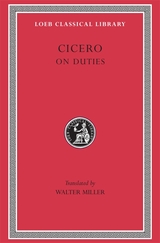 On Duties
Cicero
Harvard University Press The ethics of a statesman.
Cicero (Marcus Tullius, 106–43 BC), Roman lawyer, orator, politician, and philosopher, of whom we know more than of any other Roman, lived through the stirring era that saw the rise, dictatorship, and death of Julius Caesar in a tottering republic. In his political speeches especially and in his correspondence we see the excitement, tension and intrigue of politics and the part he played in the turmoil of the time. Of about 106 speeches, delivered before the Roman people or the Senate if they were political, before jurors if judicial, fifty-eight survive (a few of them incompletely). In the fourteenth century Petrarch and other Italian humanists discovered manuscripts containing more than 900 letters of which more than 800 were written by Cicero and nearly 100 by others to him. These afford a revelation of the man all the more striking because most were not written for publication. Six rhetorical works survive and another in fragments. Philosophical works include seven extant major compositions and a number of others; and some lost. There is also poetry, some original, some as translations from the Greek.
The Loeb Classical Library edition of Cicero is in twenty-nine volumes.
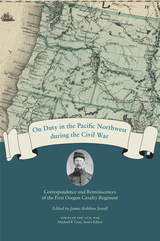 On Duty in the Pacific Northwest during the Civil War: Correspondence and Reminiscences of the First Oregon Cavalry Regiment
James Robbins Jewell
University of Tennessee Press, 2018 From 1862 to 1865, twenty-six hundred miles away from the seat of the federal government in Washington, DC, the First Oregon Volunteer Cavalry Regiment offered aid to the Union cause in the American Civil War. The First Oregon Cavalry confronted a host of complex challenges unseen by their counterparts serving in a more traditional role in the East. Their battles were more often with Native Americans—and often more concerned with their own status in the territory than with the Civil War rending the nation—while searching for pro Confederate spies and sympathizers. However unsung during the war, the regiment carried out their responsibilities successfully, managing to expedite the development of the Pacific Northwest in the process.
On Duty in the Pacific Northwest during the Civil War introduces readers to the first regiment from the Pacific Northwest to serve the Union cause. James Robbins Jewell offers a glimpse into the lives of these soldiers, presenting their wartime letters to various northwesterners to share their experiences with loved ones at home.
Complete with a series of reminiscences and excerpts from memoirs by First Oregon Cavalry officers and soldiers, On Duty in the Pacific Northwest during the Civil War is the first collection of primary source materials from soldiers serving in this Far Western territory. Jewell’s first-rate collection enables readers to step directly into the Pacific Northwest of the early 1860s and experience the Civil War from a different perspective.
On Duty: Power, Politics, and the History of Nursing in New Jersey
Ward, Frances
Rutgers University Press, 2009 In 1886, Newark City Hospital opened a training school for nurses in New Jersey. With the dawn of a new century women began to demand rights that had been denied them, and nurses too demanded changes in health care and higher education. For the first time, On Duty offers a highly readable account of the struggle for professional autonomy by New Jersey nurses and reveals how their political and legislative battles mirrored the struggle of women throughout the country to redefine their roles in society.
On Earth as it is in Heaven: Cultivating a Contemporary Theology of Creation
David Meconi
Saint Paul Seminary Press , 2021 With the 2015 publication of Pope Francis’s encyclical Laudato Si’, many people of faith have found themselves challenged to seek new ways of addressing serious ecological questions — issues essential to the flourishing of all creatures and not just human beings. This volume brings together fifteen select scholars to consider pressing contemporary environmental concerns through the lens of Catholic theology.
Drawing from the early church fathers and other authoritative voices in the Christian tradition, the contributors to On Earth as It Is in Heaven show how ancient, creedal Christianity offers significant insights into our current ecological dilemmas and speaks powerfully about what it means for us today to care well for God’s good creation.
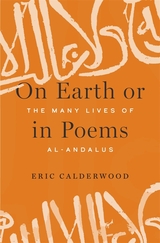 On Earth or in Poems: The Many Lives of al-Andalus
Eric Calderwood
Harvard University Press, 2023 Finalist, Sheikh Zayed Book Award
“With extraordinary linguistic range, Calderwood brings us the voices of Arabs and Muslims who have turned to the distant past of Spain to imagine their future.”
—Hussein Fancy, Yale University
How the memory of Muslim Iberia shapes art and politics from New York and Cordoba to Cairo and the West Bank.
During the Middle Ages, the Iberian Peninsula was home not to Spain and Portugal but rather to al-Andalus. Ruled by a succession of Islamic dynasties, al-Andalus came to be a shorthand for a legendary place where people from the Middle East, North Africa, and Europe; Jews, Christians, and Muslims lived together in peace. That reputation is not entirely deserved, yet, as On Earth or in Poems shows, it has had an enduring hold on the imagination, especially for Arab and Muslim artists and thinkers in Europe, the Middle East, and North Africa.
From the vast and complex story behind the name al-Andalus, Syrians and North Africans draw their own connections to history’s ruling dynasties. Palestinians can imagine themselves as “Moriscos,” descended from Spanish Muslims forced to hide their identities. A Palestinian flamenco musician in Chicago, no less than a Saudi women’s rights activist, can take inspiration from al-Andalus. These diverse relationships to the same past may be imagined, but the present-day communities and future visions those relationships foster are real.
Where do these notions of al-Andalus come from? How do they translate into aspiration and action? Eric Calderwood traces the role of al-Andalus in music and in debates about Arab and Berber identities, Arab and Muslim feminisms, the politics of Palestine and Israel, and immigration and multiculturalism in Europe. The Palestinian poet Mahmud Darwish once asked, “Was al-Andalus / Here or there? On earth … or in poems?” The artists and activists showcased in this book answer: it was there, it is here, and it will be.
On Economics and Society: Selected Essays
Harry G. Johnson
University of Chicago Press, 1982 These essays, which make the science of economics intelligible to a general audience, are grouped into six areas: the relevance of economics; the "Keynesian revolution"; economics and the university; economics and contemporary problems; world inflation, money, trade, growth, and investment; and economics and the environment.
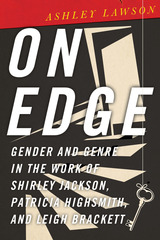 On Edge: Gender and Genre in the Work of Shirley Jackson, Patricia Highsmith, and Leigh Brackett
Ashley Lawson
Ohio State University Press, 2024 Honorable Mention, 2025 PCA Emily Toth Award For Best Single Work In Women’s Studies
Finalist, 2025 Mystery Writers of America's Edgar Awards, Best Critical/Biographical Category
Finalist, Bouchercon New Orleans 2025 Anthony Awards, Best Critical/Non-Fiction
Nominated for the 2025 Macavity Awards, Best Mystery-related Nonfiction/Critical
Ashley Lawson’s On Edge presents a new picture of postwar American literature, arguing that biases against genre fiction have unfairly disadvantaged the legacies of authors like Shirley Jackson, Patricia Highsmith, and Leigh Brackett. Each of these women navigated a male-dominated postwar publishing world without compromising their values. Their category-defying treatment of gender roles and genre classifications created suspense in their work that spoke to the tensions of the “Age of Anxiety.” Lawson engages with foundational voices in American literature, genre theory, and feminism to argue that, by merging the dominant mode of literary realism with fantastical or heightened elements, Brackett, Jackson, and Highsmith responded to the big questions of their era with startling and unnerving answers. By elevating genre play to a marker of literary skill, Lawson contends, we can secure these writers a more prominent place within the canon of midcentury American literature and open the door for the recovery of their similarly innovative peers.
On Education: Selected Writing
John Dewey
University of Chicago Press, 1974 In this collection, Reginald D. Archambault has assembled John Dewey's major writings on education. He has also included basic statements of Dewey's philosophic position that are relevant to understanding his educational views. These selections are useful not only for understanding Dewey's pedagogical principles, but for illustrating the important relation between his educational theory and the principles of his general philosophy.
On Emerson: The Best from American Literature
Edwin H. Cady and Louis J. Budd, eds.
Duke University Press, 1988 From 1929 to the latest issue, American Literature has been the foremost journal expressing the findings of those who study our national literature. The journal has published the best work of literary historians, critics, and bibliographers, ranging from the founders of the discipline to the best current critics and researchers. The longevity of this excellence lends a special distinction to the articles in American Literature.
Presented in order of their first appearance, the articles in each volume constitute a revealing record of developing insights and important shifts of critical emphasis. Each article has opened a fresh line of inquiry, established a fresh perspective on a familiar topic, or settled a question that engaged the interest of experts.
On Emotional Presentation
Alexius Meinong, translated from the German by Marie-Luise Schubert Kalsi and with a new foreword by John J. Drummond
Northwestern University Press, 2020 On Emotional Presentation, first published in German in 1917, contains the Austrian philosopher Alexius Meinong’s clearest and most developed account of the emotions and their relation to values. In this work, written toward the end of his life, Meinong argues that values are given in and through emotions but are also ontologically independent of these emotions or any subjective attitude.
Available again in English, with a new foreword by John J. Drummond that situates Meinong’s account within contemporary discussions of the emotions, this translation will be welcome to those interested in Meinong and his theory of objects as well as those interested in the philosophy of the emotions and values.
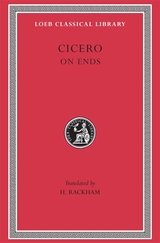 On Ends
Cicero
Harvard University Press The philosopher-statesman on Epicureanism, Stoicism, and the Old Academy.
Cicero (Marcus Tullius, 106–43 BC), Roman lawyer, orator, politician, and philosopher, of whom we know more than of any other Roman, lived through the stirring era that saw the rise, dictatorship, and death of Julius Caesar in a tottering republic. In his political speeches especially and in his correspondence we see the excitement, tension, and intrigue of politics and the part he played in the turmoil of the time. Of about 106 speeches, delivered before the Roman people or the Senate if they were political, before jurors if judicial, fifty-eight survive (a few of them incompletely). In the fourteenth century Petrarch and other Italian humanists discovered manuscripts containing more than 900 letters of which more than 800 were written by Cicero and nearly 100 by others to him. These afford a revelation of the man all the more striking because most were not written for publication. Six rhetorical works survive and another in fragments. Philosophical works include seven extant major compositions and a number of others; and some lost. There is also poetry, some original, some as translations from the Greek.
The Loeb Classical Library edition of Cicero is in twenty-nine volumes.
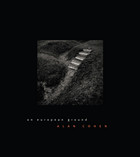 On European Ground
Alan Cohen
University of Chicago Press, 2001 A profound visual meditation on the trauma that scars twentieth-century Europe, Alan Cohen's On European Ground considers the battlefields of World War I, the Nazi death camps, and the Berlin Wall, and records the distance between what we remember about these places and what we can still observe in them today. By walking these sites and photographing the very ground in which their history has dissolved, Cohen opens a space for reflection on their complex gravity and legacy.
Cohen's images achieve a solemn beauty even as they engage history at its most topical. Pictures of trenches and bunkers at the battlefields of Somme and Verdun explore the tension between the violence of the past and the inscrutability of its remnants. Photographs from the grounds of Dachau and Auschwitz solicit a provocative dialogue between the ordinariness of these sites today and their haunting memory. They teach us, as the New Art Examiner notes, "that the living perceptual connection to the Holocaust is vanishing." Images of the Berlin Wall show only the footprint of the barricade that once separated two hostile ideologies. They record the physical erosion and looming disappearance of the Wall while capturing its reappearance as a memorialized abstraction.
Accompanying the photographs in On European Ground are essays by Sander Gilman and Jonathan Bordo, as well as an interview with Cohen by critic Roberta Smith of the New York Times. The essays present both an introduction to and aesthetic analysis of Cohen's work, while the interview discusses the intractable problems of history and memory that his photographs so uniquely capture.
On Evil
St. Thomas Aquinas
University of Notre Dame Press, 1995 This long-awaited translation, based on the critical edition of the Latin text published by the Leonine Commission in 1982, is now available in paperback. The disputed question De malo (On Evil) was first presented as a series of oral debates at the University of Paris and subsequently recorded in the form in which it now appears. The length of the work and the thoroughness of the treatment is eloquent testimony of the importance St. Thomas attached to this topic.
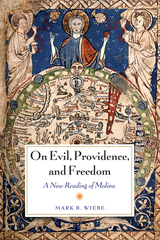 On Evil, Providence, and Freedom: A New Reading of Molina
Mark B. Wiebe
Northern Illinois University Press, 2017 This original study is concerned with the reconciliation of divine providence, grace, and free will. Mark Wiebe explores, develops, and defends Luis de Molina’s work in these areas, and bridges the main sixteenth-century conversations surrounding Molina’s writings with relevant sets of arguments in contemporary philosophical theology and philosophy of religion. The result fills a gap between theologians and philosophers working in related areas of study and is a unique contribution to the field of analytic theology.
Wiebe begins by sketching the historical and theological context from which Molina’s work emerged in the late sixteenth century. He then lays out Thomas Aquinas’s understanding of God’s nature and activity, as well as his understanding of the relationship between God’s action and creaturely activity. In the face of challenges like the Problem of Evil, Wiebe argues, Molina’s work is a helpful supplement to Aquinas’s thought. Turning to direct consideration of Molina’s work, Wiebe responds to several of the most well-known objections to Molinism. In support of Molina’s understanding of creaturely freedom, he then develops some twentieth-century work in free will philosophy, focusing on the work of thinkers like Austin Farrer, Timothy O’Connor, and Robert Kane. He argues that there are good reasons to defend a restrained version of libertarian or noncompatibilist free will, and also good reasons to believe this sort of freedom obtains among human agents.
Wiebe concludes that a Molinistic revision of Eleonore Stump’s work on the relationship between providence and free will provides a well-rounded, coherent theological option for reconciling divine providence, grace, and free will. This thoughtful study will appeal to theologians and philosophers, as well as educated readers with a basic knowledge of Christian theology.
On Exile
Francesco Filelfo
Harvard University Press, 2013 Francesco Filelfo's philosophical dialogue On Exile (ca. 1440) depicts a prominent group of Florentine noblemen and humanists, driven from their city by Cosimo de’ Medici, discussing the sufferings imposed by exile such as poverty and loss of reputation, and the best way to endure and even profit from them. This volume contains the first complete edition of the Latin text and the first complete translation into any modern language.
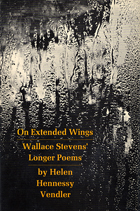 On Extended Wings: Wallace Stevens’ Longer Poems
Helen Vendler
Harvard University Press, 1969 “Vendler is a commentator almost clairvoyant...Her book ought to be read, with care and gratitude, by every reader of Stevens, for no critic before her has understood so well his major poems.”
—Harold Bloom, New York Times Book Review
A virtuosic reading of Stevens’s most difficult poems brings their austere beauty and elaborately mannered movements to life.
If “poetry is the subject of the poem,” as Wallace Stevens once declared, so too is the poet. A poet’s temperament, his attractions and repulsions, his sense of the world: all are integral to his style. And while Stevens’s short poems are perhaps his most anthologized, it is only in his longer works that we find his unique sensibilities on full display.
Tracing the great modernist’s development through fourteen poems, from “Sunday Morning” (1915) to “An Ordinary Evening in New Haven” (1949), Helen Vendler reveals the longer poems as the proving grounds where Stevens tested formal innovations and discovered his own formidable strengths. Chief among these, she argues, is a gift for equivocation. Neither ascetic nor hedonist, neither solipsist aesthete nor engaged poet of the social, Stevens “trembles always at halfway points.” He departs from his romantic forbears, deprecating the pure imagination by letting flights of poetic fancy degenerate into intentional decadence and triviality. But he finds desperate clutching at “things as they are” equally fruitless: “endless struggle with fact” is the poet’s inevitable lot. From this ambivalence springs a whole world of grammatical and syntactic innovation, from his ambiguous use of tense to the welter of qualifications that seem to thwart every affirmative declaration.
An unsurpassed classic in the canon of Stevens criticism, On Extended Wings gives us the full sweep his of his oeuvre—from the somber to the whimsical, from high stoic elegy to grotesque comedy—as no one but the brilliant Helen Vendler can.
 On Extended Wings: Wallace Stevens’ Longer Poems
Helen Vendler
Harvard University Press “Vendler is a commentator almost clairvoyant...Her book ought to be read, with care and gratitude, by every reader of Stevens, for no critic before her has understood so well his major poems.”
—Harold Bloom, New York Times Book Review
A virtuosic reading of Stevens’s most difficult poems brings their austere beauty and elaborately mannered movements to life.
If “poetry is the subject of the poem,” as Wallace Stevens once declared, so too is the poet. A poet’s temperament, his attractions and repulsions, his sense of the world: all are integral to his style. And while Stevens’s short poems are perhaps his most anthologized, it is only in his longer works that we find his unique sensibilities on full display.
Tracing the great modernist’s development through fourteen poems, from “Sunday Morning” (1915) to “An Ordinary Evening in New Haven” (1949), Helen Vendler reveals the longer poems as the proving grounds where Stevens tested formal innovations and discovered his own formidable strengths. Chief among these, she argues, is a gift for equivocation. Neither ascetic nor hedonist, neither solipsist aesthete nor engaged poet of the social, Stevens “trembles always at halfway points.” He departs from his romantic forbears, deprecating the pure imagination by letting flights of poetic fancy degenerate into intentional decadence and triviality. But he finds desperate clutching at “things as they are” equally fruitless: “endless struggle with fact” is the poet’s inevitable lot. From this ambivalence springs a whole world of grammatical and syntactic innovation, from his ambiguous use of tense to the welter of qualifications that seem to thwart every affirmative declaration.
An unsurpassed classic in the canon of Stevens criticism, On Extended Wings gives us the full sweep his of his oeuvre—from the somber to the whimsical, from high stoic elegy to grotesque comedy—as no one but the brilliant Helen Vendler can.
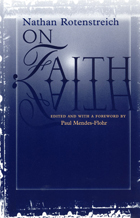 On Faith
Nathan Rotenstreich
University of Chicago Press, 1998 The concept of faith has remained inscrutable to thinkers for centuries. The late Nathan Rotenstreich believed that faith was such a difficult topic for so many because of its inextricable links to theology and religion. On Faith, Rotenstreich's last work which was edited and prepared for publication by Paul Mendes-Flohr, attempts to detach the concept from its religious underpinnings and consider it in its own right, as a human phenomenon and cognitive attitude. Faith, Rotenstreich contends, should not be confused with its historical manifestations. By making faith a philosophical rather than a theological matter, he explores its essence as an awareness of how we relate within mundane reality to all that is beyond the human world. Arguing for the intentionality of faith, Rotenstreich shows how it structures a variety of relations that range from the experience of the holy to the nature of cults, traditional religion, and the idea of servitude to God.
Rotenstreich's phenomenological study will be of great importance for religious scholars as well as for philosophers.
Nathan Rotenstreich (1913-93) was professor of philosophy at the Hebrew University of Jerusalem. He was elected to the Israel Academy of Sciences and Humanities, and his works include Jews and German Philosophy and Reason and Its Manifestations: A Study of Kant and Hegel.
On Faith: Summa Theologiae 2-2, qq.1-16 of St. Thomas Aquinas
Thomas Aquinas
University of Notre Dame Press, 1990 There are numerous Summas from the thirteenth century, but none quite like Thomas Aquinas's Summa Theologiae in simplicity, scope, and rigor of organization. The structure of the Summa may seem complex to those approaching it for the first time, but it is a remarkable feat of clarity in comparison with its predecessors. In his spare and accessible English translation, Mark D. Jordan captures this clarity in Thomas's discussion of the theological virtue of faith.
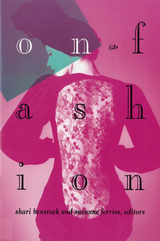 On Fashion
Benstock, Shari
Rutgers University Press, 1994 Until recently, fashion was considered the "F-word" in intellectual circles, dismissed as unworthy of serious attention. Yet no area of life, no individual moment, stands outside fashion's discourses. Intuitively, we all know that clothing is a language, incessantly communicating messages about its wearer. But who speaks this language, to whom is it addressed, what does it mean, and how are its meanings established and transformed? On Fashion explores the ways our material, political, psychological, sexual, even intellectual lives are woven into fashion's fabric. This stimulating collection of essays explores fashion's symbolic and figurative functions in photography, cinema, and video; in consumerism, postmodernism, and feminism; in political and material culture; and in self-definition and subjectivity. They demonstrate the pervasive reach of fashion and its expressions. This collection contains over sixty photographs and illustrations and includes essays by Barbara Brodman, Mary Ann Caws, Linda Benn DeLibero, Hlne Cixous, Diana Fuss, Cheryl Herr, Karla Jay, Deborah Jenson, Douglas Kellner, Ingeborg Majer O'Sickey, Leslie W. Rabine, Andrew Ross, Sonia Rykiel, Carol Shloss, Kaja Silverman, Maureen Turim, and Iris Marion Young.
On Faulkner: The Best from American Literature
Edwin H. Cady and Louis J. Budd, editors
Duke University Press, 1989 From 1929 to the latest issue, American Literature has been the foremost journal expressing the findings of those who study our national literature. The journal has published the best work of literary historians, critics, and bibliographers, ranging from the founders of the discipline to the best current critics and researchers. The longevity of this excellence lends a special distinction to the articles in American Literature.
Presented in order of their first appearance, the articles in each volume constitute a revealing record of developing insights and important shifts of critical emphasis. Each article has opened a fresh line of inquiry, established a fresh perspective on a familiar topic, or settled a question that engaged the interest of experts.
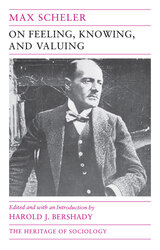 On Feeling, Knowing, and Valuing: Selected Writings
Max Scheler
University of Chicago Press, 1992 One of the pioneers of modern sociology, Max Scheler (1874-
1928) ranks with Max Weber, Edmund Husserl, and Ernst
Troeltsch as being among the most brilliant minds of his
generation. Yet Scheler is now known chiefly for his
philosophy of religion, despite his groundbreaking work in
the sociology of knowledge, the sociology of emotions, and
phenomenological sociology. This volume comprises some of
Scheler's most interesting work—including an analysis of the
role of sentiments in social interaction, a sociology of
knowledge rooted in global social and cultural comparisons,
and a cross-cultural theory of values—and identifies some of
his important contributions to the discussion of issues at
the forefront of the social sciences today.
Editor Harold J. Bershady provides a richly detailed
biographical portrait of Scheler, as well as an incisive
analysis of how his work extends and integrates problems of
theory and method addressed by Durkheim, Weber, and Parsons,
among others.
Harold J. Bershady, professor of sociology at the University
of Pennsylvania, is the author of Ideology and Social
Knowledge and the editor of Social Class and
Democratic Leadership.
Heritage of Sociology series
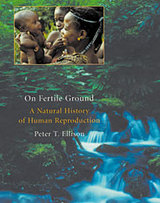 On Fertile Ground: A Natural History of Human Reproduction
Peter T. Ellison
Harvard University Press, 2003 Reproduction is among the most basic of human biological functions, both for our distant ancestors and for ourselves, whether we live on the plains of Africa or in North American suburbs. Our reproductive biology unites us as a species, but it has also been an important engine of our evolution. In the way our bodies function today we can see both the imprint of our formative past and implications for our future. It is the infinitely subtle and endlessly dramatic story of human reproduction and its evolutionary context that Peter T. Ellison tells in On Fertile Ground.
Ranging from the latest achievements of modern fertility clinics to the lives of subsistence farmers in the rain forests of Africa, this book offers both a remarkably broad and a minutely detailed exploration of human reproduction. Ellison, a leading pioneer in the field, combines the perspectives of anthropology, stressing the range and variation of human experience; ecology, sensitive to the two-way interactions between humans and their environments; and evolutionary biology, emphasizing a functional understanding of human reproductive biology and its role in our evolutionary history.
Whether contrasting female athletes missing their periods and male athletes using anabolic steroids with Polish farm women and hunter-gatherers in Paraguay, or exploring the intricate choreography of an implanting embryo or of a nursing mother and her child, On Fertile Ground advances a rich and deeply satisfying explanation of the mechanisms by which we reproduce and the evolutionary forces behind their design.
 On Fire
Larry Schwarm
Duke University Press, 2003 Inaugural Winner The Center for Documentary Studies/Honickman First Book Prize in Photography A startling, mesmerizing series of photographs of prairie fires, On Fire transports us from moments of almost apocalyptic splendor to the stillness of near abstraction. For over a decade Kansas-based photographer Larry Schwarm has been making extraordinary color photographs of the dramatic prairie fires that sweep across the vast grasslands of his native state each spring. Based on this stunning and extensive body of work, Schwarm was chosen from over 500 submissions as the inaugural winner of the CDS/Honickman Foundation First Book Prize in Photography. With publication of On Fire, Duke University Press, in association with the Center for Documentary Studies and The Honickman Foundation, launches this major biennial book prize for American photographers. Fire is an essential element of the ecosystem. Every spring, the expanses of tallgrass prairie in the Flint Hills of east-central Kansas undergo controlled burning. For photographer Larry Schwarm, documenting these fires has become a passion. He captures the essence of the fires and their distinct personalities—ranging from calm and lyrical to angry and raging. His photos allow us to see the redemptive power of fire and to remove ourselves from its tragic elements. Through Schwarm’s lens, the horizon takes on new meaning as we view the sublime, mystical, and sensual character of the burning landscape. Schwarm connects the enormous power and devastation of fire to what can only be identified as another kind of creation—the creation of beauty. Published by Duke University Press in association with Lyndhurst Books of the Center for Documentary Studies To view images from the book, please visit http://cds.aas.duke.edu/books/fire.html The Center for Documentary Studies/Honickman First Book Prize in Photography is open to American photographers who use their cameras for creative exploration, whether it be of places, people, or communities; of the natural or social world; of beauty at large or the lack of it; of objective or subjective realities. Information and guidelines about the prize are available at http://cds.aas.duke.edu/grants
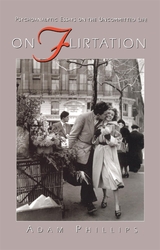 On Flirtation
Adam Phillips
Harvard University Press, 1994 People tend to flirt only with serious things--madness, disaster, other people's affections. So is flirtation dangerous, exploiting the ambiguity of promises to sabotage our cherished notions of commitment? Or is it, as Adam Phillips suggests, a productive pleasure, keeping things in play, letting us get to know them in different ways, allowing us the fascination of what is unconvincing? This is a book about the possibilities of flirtation, its risks and instructive amusements--about the spaces flirtation opens in the stories we tell ourselves, particularly within the framework of psychoanalysis.
Phillips looks at life as a tale to be told but rejects the idea of a master plot. Instead, he says, we should be open to the contingent, and flirtation shows us the way. His book observes children flirting with their parents, our various selves flirting with one another, and literature flirting with psychoanalysis. As Phillips explores the links between literature and psychoanalysis--ranging from Philip Roth to Isaac Rosenberg, Karl Kraus to John Clare--psychoanalysis emerges as a multi-authored autobiography. Its subjects are love, loss, and memory; its authors are the analyst and the analysand, as well as the several selves brought to life in the process. A passionate and delightfully playful defense of the virtues of being uncommitted, On Flirtation sets before us the virtue of a yet deeper commitment to the openendedness of our life stories.
On Frost: The Best from American Literature
Edwin H. Cady and Louis J. Budd, eds.
Duke University Press, 1991 From 1929 to the latest issue, American Literature has been the foremost journal expressing the findings of those who study our national literature. The jouranl has published the best work of literary historians, critics, and bibliographers, ranging from the founders of the discipline to the best current critics and researchers. The longevity of this excellence lends a special distinction to the articles in American Literature.
Presented in order of their first appearance, the articles in each volume constitute a revealing record of developing insights and important shifts of critical emphasis. Each article has opened a fresh line of inquiry, established a fresh perspective on a familiar topic, or settled a question that engaged the interest of experts.
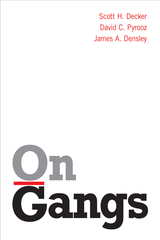 On Gangs
Scott H. Decker, David C. Pyrooz, and James A. Densley
Temple University Press, 2022 Gangs are multifaceted and varied, so any attempt to understand them cannot be restricted to a singular approach. On Gangs provides a diverse and comprehensive survey of the available theories for understanding this social issue as well as the broad range of responses to it. The authors look at the many influences on gangs’ operation, growth, prevention, and enforcement. The authors provide different criminological, psychological, and sociological approaches to gang studies, including interviews with past and current gang members. On Gangs presents the core issues for understanding gangs, including emerging topics like prison gangs, gender and gangs, and international gangs. There is also a focus on policing, legislation, and punishment. Weaving together research and policy findings to address the causes, contexts, and consequences of gangs, the authors address topics including joining, resisting, and leaving gangs, and how gangs operate in communities and institutions. An authoritative and sweeping tour of gang scholarship, On Gangs showcases the critical evidence-based solutions in prevention, enforcement, legislation, and intervention. The authors seek to answer the question: How do we effectively deal with gangs and gang membership?
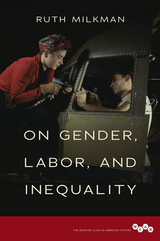 On Gender, Labor, and Inequality
Ruth Milkman
University of Illinois Press, 2016 Ruth Milkman's groundbreaking research in women's labor history has contributed important perspectives on work and unionism in the United States. On Gender, Labor, and Inequality presents four decades of Milkman's essential writings, tracing the parallel evolutions of her ideas and the field she helped define. Milkman's introduction frames a career-spanning scholarly project: her interrogation of historical and contemporary intersections of class and gender inequalities in the workplace, and the efforts to challenge those inequalities. Early chapters focus on her pioneering work on women's labor during the Great Depression and the World War II years. In the book's second half, Milkman turns to the past fifty years, a period that saw a dramatic decline in gender inequality even as growing class imbalances created greater-than-ever class disparity among women. She concludes with a previously unpublished essay comparing the impact of the Great Depression and the Great Recession on women workers. A first-of-its-kind collection, On Gender, Labor, and Inequality is an indispensable text by one of the world's top scholars of gender, equality, and work.
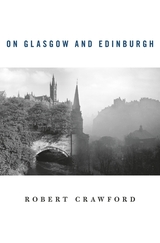 On Glasgow and Edinburgh
Robert Crawford
Harvard University Press, 2013 Edinburgh and Glasgow enjoy a famously scratchy relationship. Resembling other intercity rivalries throughout the world, from Madrid and Barcelona, to Moscow and St. Petersburg, to Beijing and Shanghai, Scotland’s sparring metropolises just happen to be much smaller and closer together—like twin stars orbiting a common axis. Yet their size belies their world-historical importance as cultural and commercial capitals of the British Empire, and the mere forty miles between their city centers does not diminish their stubbornly individual nature.
Robert Crawford dares to bring both cities to life between the covers of one book. His story of the fluctuating fortunes of each city is animated by the one-upping that has been entrenched since the eighteenth century, when Edinburgh lost parliamentary sovereignty and took on its proud wistfulness, while Glasgow came into its industrial promise and defiance. Using landmarks and individuals as gateways to their character and past, this tale of two cities mixes novelty and familiarity just as Scotland’s capital and its largest city do. Crawford gives us Adam Smith and Walter Scott, the Scottish Enlightenment and the School of Art, but also tiny apartments, a poetry library, Spanish Civil War volunteers, and the nineteenth-century entrepreneur Maria Theresa Short. We see Glasgow’s best-known street through the eyes of a Victorian child, and Edinburgh University as it appeared to Charles Darwin.
Crawford's lively account, drawing on a wealth of historical and literary sources, affirms what people from Glasgow and Edinburgh have long doubted—that it is possible to love both cities at the same time.
On Good Ground: The Story of the Sisters of Saint Joseph in St. Paul
Sister Helen Angela Hurley
University of Minnesota Press, 1951 On Good Ground was first published in 1951. Minnesota Archive Editions uses digital technology to make long-unavailable books once again accessible, and are published unaltered from the original University of Minnesota Press editions. Besides providing a vivid yet scholarly account of a religious order, this book reflects much of the regional history of the area where the nuns have done their work. The order maintains the College of St. Catherine and numerous other institutions in Minnesota and North Dakota.
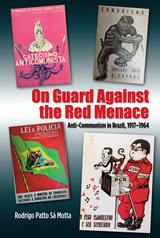 On Guard Against the Red Menace: Anti-Communism in Brazil, 1917-1964
Rodrigo Sá Motta
Sussex Academic Press, 2022 This book focuses on the values, beliefs, fears, and actions of Brazilian groups that throughout the twentieth century fought the "red menace." It is based on broad and diversified documentary sources, including police files, archives of political leaders, traditional press periodicals, newspapers, and brochures of right-wing organizations, monuments, caricatures, and photographs. The work is a major contribution to better understanding the political impact of right-wing movements in Brazil and the justifications made for the authoritarian coups of 1937 and 1964. The author explains the intricacy of the political movements, leaderships and organizations that gathered around the fight against communism, as well as the ideas and images used to disseminate their arguments, including international sources of inspiration. On Guard Against the Red Menace; helps to understand why a candidate of military origin who promises to rid the country of the reds won the October 2018 elections in Brazil, by adopting a discursive strategy that represents the appropriation of the anti-communist tradition analyzed in this book.
 On Guerrilla Warfare
Mao Tse-tung
University of Illinois Press, 1961 One of the most influential documents of our time, Mao Tse-tung's pamphlet on guerrilla warfare has become the basic textbook for waging revolution in underdeveloped and emergent areas throughout the world. Recognizing the fundamental disparity between agrarian and urban societies, Mao advocated unorthodox strategies that converted deficits into advantages: using intelligence provided by the sympathetic peasant population; substituting deception, mobility, and surprise for superior firepower; using retreat as an offensive move; and educating the inhabitants on the ideological basis of the struggle. This radical new approach to warfare, waged in jungles and mountains by mobile guerrilla bands closely supported by local inhabitants, has been adopted by other revolutionary leaders from Ho Chi Minh to Che Guevara. Mao wrote On Guerrilla Warfare in 1937 while in retreat after ten years of battling the Nationalist army of Chiang Kai-shek. Twelve years later, the Nationalist Chinese were rousted from the mainland, and Mao consolidated his control of a new nation, having put his theories of revolutionary guerrilla warfare to the test. Established governments have slowly come to recognize the need to understand and devise means to counter this new method of warfare. Samuel B. Griffith's classic translation makes Mao's treatise widely available and includes a comprehensive introduction that profiles Mao, analyzes the nature and conduct of guerrilla warfare, and considers its implications for American policy.
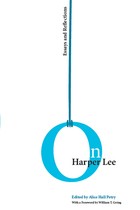 On Harper Lee: Essays and Reflections
Alice Hall Petry
University of Tennessee Press, 2008 Harper Lee's Pulitzer Prize-winning novel To Kill a Mockingbird remains one of the most enduring works of southern fiction ever written. Although a literary phenomenon-tens of millions of copies sold worldwide-there is surprisingly little secondary literature on Lee and her only novel. On Harper Lee: Essays and Reflections is the first collection of original essays on the author and her magnum opus.
On Harper Lee is an eclectic combination of academic and familiar essays. John Carlos Rowe discusses economic issues in the novel; Jacqueline Tavernier-Courbin looks at Lee's handling of humor; Robert Butler examines the novel within the context of Christian religious allegory; Jean Frantz Blackall traces the similarities between To Kill a Mockingbird and the novels of Lee's favorite author, Jane Austen; and Kathryn Lee Seidel examines how the character of Scout comes to approximate the ideals of Stoicism embodied in her father, Atticus Finch.
In what is perhaps the most controversial chapter in the collection, Laura Fine examines how To Kill a Mockingbird follows the pattern of lesbian coming-of-age fiction, arguing that the subtext “is the drama of Scout herself, of her conflicted private hopes to be accepted as an outsider.” Likewise controversial Lesley Marx recounts the reaction to Lee's novel in her native South Africa. Because Mockingbird holds such tremendous personal appeal for so many readers, Petry has included three familiar essays by noted writers Doris Betts, Gerald Early, and Nichelle D. Tramble.
Written for scholars as well as general readers, On Harper Lee is an accessible collection on one of America's most important novels and its often enigmatic creator.
 On Hashish
Walter BenjaminTranslated by Howard Eiland and Others
Harvard University Press, 2006 Walter Benjamin's posthumously published collection of writings on hashish is a detailed blueprint for a book that was never written--a "truly exceptional book about hashish," as Benjamin describes it in a letter to his friend Gershom Scholem. A series of "protocols of drug experiments," written by himself and his co-participants between 1927 and 1934, together with short prose pieces that he published during his lifetime, On Hashish provides a peculiarly intimate portrait of Benjamin, venturesome as ever at the end of the Weimar Republic, and of his unique form of thought.
Consciously placing himself in a tradition of literary drug-connoisseurs from Baudelaire to Hermann Hesse, Benjamin looked to hashish and other drugs for an initiation into what he called "profane illumination." At issue here, as everywhere in Benjamin's work, is a new way of seeing, a new connection to the ordinary world. Under the influence of hashish, as time and space become inseparable, experiences become subtly stratified and resonant: we inhabit more than one plane in time. What Benjamin, in his contemporaneous study of Surrealism, calls "image space" comes vividly to life in this philosophical immersion in the sensuous.
This English-language edition of On Hashish features a section of supplementary materials--drawn from Benjamin's essays, letters, and sketches--relating to hashish use, as well as a reminiscence by his friend Jean Selz, which concerns a night of opium-smoking in Ibiza. A preface by Howard Eiland discusses the leading motifs of Benjamin's reflections on intoxication.
On Hawthorne: The Best from American Literature
Edwin H. Cady and Louis J. Budd, eds.
Duke University Press, 1990 From 1929 to the latest issue, American Literature has been the foremost journal expressing the findings of those who study our national literature. The jouranl has published the best work of literary historians, critics, and bibliographers, ranging from the founders of the discipline to the best current critics and researchers. The longevity of this excellence lends a special distinction to the articles in American Literature.
Presented in order of their first appearance, the articles in each volume constitute a revealing record of developing insights and important shifts of critical emphasis. Each article has opened a fresh line of inquiry, established a fresh perspective on a familiar topic, or settled a question that engaged the interest of experts.
On Heidegger and Language
Edited and Translated by Joseph J. Kockelmans
Northwestern University Press, 1980 This collection contains original translations of essays, discussions, and papers including six previously unpublished works from the International Colloquium on Heidegger’s Conception of Language, held at The Pennsylvania State University in 1969. This volume endeavors to place Martin Heidegger’s ideas within a wide range of philosophical thought. It contains critical reflections on his conception of speech in Being and Time, linguistic meditations on Heidegger’s use of language, and analysis of his view on the relationship between thought and the language in which it is expressed. In this book, Heidegger scholars will find additional insights into his conception of language and his philosophy as a whole.
On Henry James: The Best from American Literature
Edwin H. Cady and Louis J. Budd, eds.
Duke University Press, 1990 From 1929 to the latest issue, American Literature has been the foremost journal expressing the findings of those who study our national literature. American Literature has published the best work of literary historians, critics, and bibliographers, ranging from the founders of discipline to the best current critics and researchers. The longevity of this excellence lends a special distinction to the articles in American Literature. Presented in order of their first appearance, the articles in each volume constitute a revealing record of developing insights and important shifts of critical emphasis. Each article has opened a fresh line of inquiry, established a fresh perspective on a familiar topic, or settled a question that engaged the interest of experts.
On Historians: Reappraisals of Some of the Masters of Modern History
J. H. Hexter
Harvard University Press J. H. Hexter, one of the nation’s most distinguished historians, reflects on some major historical works and their authors: Carl Becker, Wallace Ferguson, Hiram Hayden, Fernand Braudel, Lawrence Stone, Christopher Hill, and J. G. A. Pocock. The nature and condition of historical proof are Hexter’s continual concerns as he examines the varying interpretations of history in early modern times, probing each thesis and testing it by marshaling the evidence offered in its support and counter-evidence that displays its vulnerability. Writing with pungency and wit, Hexter engages the reader with his authoritative and often controversial frameworks of historical truth.
 On Histories and Stories: Selected Essays
A. S. Byatt
Harvard University Press, 2002 As writers of English from Australia to India to Sri Lanka command our attention, Salman Rushdie can state confidently that English fiction was moribund until the Empire wrote back, and few, even among the British, demur. A. S. Byatt does, and her case is persuasive. In a series of essays on the complicated relations between reading, writing, and remembering, the gifted novelist and critic sorts the modish from the merely interesting and the truly good to arrive at a new view of British writing in our time.
Whether writing about the renaissance of the historical novel, discussing her own translation of historical fact into fiction, or exploring the recent European revival of interest in myth, folklore, and fairytale, Byatt's abiding concern here is with the interplay of fiction and history. Her essays amount to an eloquent and often moving meditation on the commitment to historical narrative and storytelling that she shares with many of her British and European contemporaries. With copious illustration and abundant insights into writers from Elizabeth Bowen and Henry Green to Anthony Burgess, William Golding, Muriel Spark, Penelope Fitzgerald, Julian Barnes, Martin Amis, Hilary Mantel, and Pat Barker, On Histories and Stories is an oblique defense of the art Byatt practices and a map of the complex affiliations of British and European narrative since 1945.
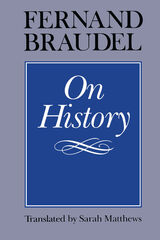 On History
Fernand Braudel
University of Chicago Press, 1980 The first English translation of Ecrits sur l'histoire—a collection of essays written over a twenty-year period following publication of Braudel's masterwork, La, Méditerranée—On History sets forth Braudel's reflections on the intellectual framework of his historical studies. Braudel calls on the historian to penetrate beneath the surface of political events to uncover and measure the forces shaping collective existence. Cycles of production, wages and prices, grids of communication and trade, fluctuations and climate, demographic trends, popular beliefs—all of these phenomena are proper subjects of the historian's investigations. It is only through study of the longue durée, Braudel argues, that one can discern structure, the supports and obstacles, the limits and his experience cannot escape.
"The great French historian Fernand Braudel has done what only giants can: he has made Western man confront the problem of time—individual time, historical time, relative time, real time. . . . Braudel, more than any other historian, has wrestled with man's conception of time over time. . . What a magnificent fight he has fought."—Virginia Quarterly Review
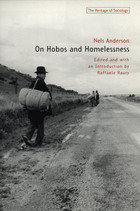 On Hobos and Homelessness
Nels Anderson
University of Chicago Press, 1998 Nels Anderson was a pioneer in the study of the homeless. In the early 1920s Anderson combined his own experience "on the bummery," with his keen sociological insight to give voice to a largely ignored underclass. He remains an extraordinary and underrated figure in the history of American sociology.
On Hobos and Homelessness includes Anderson's rich and vibrant ethnographic work of a world of homeless men. He conducted his study on Madison street in Chicago, and we come to intimately know this portion of the 1920s hobo underworld—the harshness of vagrant life and the adventures of young hobos who come to the big city. This selection also includes Anderson's later work on the juvenile and the tramp, the unattached migrant, and the family. Like John Steinbeck's Depression-era observations, Anderson's writings express the memory of those who do not seem entitled to have memory, whose lives were expressed in temporary labor.
On Homesickness: A Plea
Jesse Donaldson
West Virginia University Press, 2017 2017 Mountain Heritage Literary Festival Appalachian Book of the Year
One day, Jesse Donaldson wakes up in Portland, Oregon, and asks his wife to uproot their life together and move to his native Kentucky. As he searches for the reason behind this sudden urge, Donaldson examines both the place where he was born and the life he’s building.
The result is a hybrid—part memoir, part meditation on nostalgia, part catalog of Kentucky history and myth. Organized according to Kentucky geography, with one passage for each of the commonwealth’s 120 counties, On Homesickness examines whether we can ever return to the places we’ve called home.
On Howells: The Best from American Literature
Edwin H. Cady and Louis J. Budd, eds.
Duke University Press, 1993 From 1929 to the latest issue, American Literature has been the foremost journal expressing the findings of those who study our national literature. The jouranl has published the best work of literary historians, critics, and bibliographers, ranging from the founders of the discipline to the best current critics and researchers. The longevity of this excellence lends a special distinction to the articles in American Literature.
Presented in order of their first appearance, the articles in each volume constitute a revealing record of developing insights and important shifts of critical emphasis. Each article has opened a fresh line of inquiry, established a fresh perspective on a familiar topic, or settled a question that engaged the interest of experts.
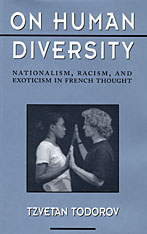 On Human Diversity: Nationalism, Racism, and Exoticism in French Thought
Tzvetan Todorov
Harvard University Press, 1993 How can we think about peoples and cultures unlike our own? In the early modern period, the fact of human diversity presented Europeans with little cause for anxiety: they simply assumed the superiority of the West. During the eighteenth century this view was gradually abandoned, as thinkers argued that other peoples possessed reason and sensibility, and thus deserved the same respect that Westerners accorded themselves. Since that time, however, Enlightenment belief in the universals of human nature has fallen into disrepute; critics allege that such notions have had disastrous consequences in the twentieth century, ranging from prejudice to persecution and outright genocide.
Tzvetan Todorov, an internationally admired scholar, aims in this book to salvage the good name of the Enlightenment so that its ideas can once more inspire humane thought and action. The question he poses is of urgent relevance to the conflicts of our age: How can we avoid the dangers of a perverted universalism and scientism, as well as the pitfalls of relativism? Since the French were the ideologues of universalism and played a preeminent role in the diffusion of Enlightenment ideas in Europe, Todorov focuses on the French intellectual tradition, analyzing writers ranging from Montaigne through Tocqueville, Michelet, and Renan, to Lévi-Strauss. He shows how theories of human diversity were developed in the eighteenth century, and later systematically distorted. The virtues of Enlightenment thought became vices in the hands of nineteenth-century thinkers, as a result of racism, nationalism, and the search for exoticism. Todorov calls for us to reject this legacy and to strive once again for an acceptance of human diversity, through a "critical humanism" prefigured in the writings of Rousseau and Montesquieu.
This is a work of impressive erudition and insight--a masterly synthesis that can help us think incisively about the racial and ethnic tensions confronting the world today.
On Human Nature: Twenty-Fifth Anniversary Edition, With a New Preface
Edward O. Wilson
Harvard University Press, 2004 In his new preface E. O. Wilson reflects on how he came to write this book: how The Insect Societies led him to write Sociobiology, and how the political and religious uproar that engulfed that book persuaded him to write another book that would better explain the relevance of biology to the understanding of human behavior.
 On Human Worth and Excellence
Giannozzo Manetti
Harvard University Press, 2018 Giannozzo Manetti (1396–1459) was a celebrated diplomat, historian, philosopher, and humanist scholar of the early Renaissance who mastered ancient Greek and Hebrew as well as classical Latin. In this treatise, dedicated to Alfonso of Aragon, King of Naples, Manetti addresses a question central to the anthropology of the Renaissance: what are the moral, intellectual, and spiritual capabilities of the unique amalgam of body and soul that constitutes human nature? The treatise takes issue with a popular work of medieval asceticism, On the Misery of the Human Condition, written by none other than Innocent III, one of the greatest of medieval popes. The pope’s diatribe expresses a revulsion against human nature and argues for the futility of ambition, the emptiness of pleasures, and the ultimate worthlessness of human achievements. Manetti’s treatise presents a comprehensive refutation of the pope’s pessimism, sometimes citing the achievements of the Renaissance as evidence for the potential divinity of human nature and its extraordinary capabilities. This edition contains the first complete translation into English.
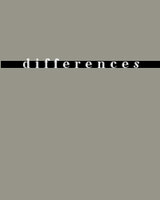 On Humanism, Volume 14
Elizabeth Weed and Ellen Rooney, eds.
Duke University Press Twentieth-century ideologies, from liberalism to fascism, are rooted in humanism—the faith in the sovereignty of human reason and potential that grew out of Renaissance thought and discovery. This special issue asks if it is true that all vestiges of humanism have been dismantled, or whether humanism has taken on new forms. Have new versions of historical analysis and cultural studies reanimated humanist themes? What is posthumanism? These essays examine relationships among structuralism, poststructuralism, and the subject; explore the challenge of anticolonialist critique to the coherence of antihumanism; reconsider the canon of antihumanists such as Heidegger and Foucault, and broach the intractable problems posed by efforts to comprehend the Holocaust, the camps, and ethnic cleansing. Contributors. Athena Athanasiou, Etienne Balibar, Mara de Gennaro, Carolyn J. Dean, Brady Thomas Heiner, Lynne Joyrich, Jacques Lezra
On Humor: The Best from American Literature
Louis J. Budd and Edwin H. Cady, eds.
Duke University Press, 1992 From 1929 to the latest issue, American Literature has been the foremost journal expressing the findings of those who study our national literature. American Literature has published the best work of literary historians, critics, and bibliographers, ranging from the founders of discipline to the best current critics and researchers. The longevity of this excellence lends a special distinction to the articles in American Literature. Presented in order of their first appearance, the articles in each volume constitute a revealing record of developing insights and important shifts of critical emphasis. Each article has opened a fresh line of inquiry, established a fresh perspective on a familiar topic, or settled a question that engaged the interest of experts.
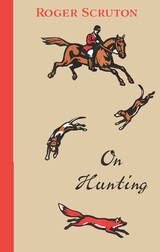 On Hunting
Roger Scruton
St. Augustine's Press, 2002 To say that On Hunting is a book on fox hunting is like saying that Moby-Dick is a whaling yarn. Modern people are as given to loving, fearing, fleeing, and pursuing other species as were their hunter-gatherer forebears. And in fox hunting, they join together with their most ancient friends among the animals, to pursue an ancient enemy. The feelings stirred by hunting are explored by Scruton, in a book that is both illuminating and deeply personal. Drawing on his own experiences of hunting and offering a delightful portrait of the people and animals who take part in it, Scruton introduces the reader to the mysteries of country life. His book is a plea for tolerance toward a sport in which the love of animals prevails over the pursuit of them, and in which Nature herself is the center of the drama.
Among the most dramatic and ironic discoveries that On Hunting offers the typical American reader is that hunting is about a love and respect for animals, rather than a blood-thirsty hatred of them, and that the sport, far from being limited to an upper-class, old-monied aristocracy, is really one promoting an egalitarian meritocracy.
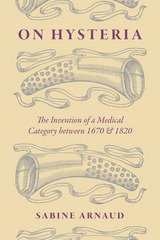 On Hysteria: The Invention of a Medical Category between 1670 and 1820
Sabine Arnaud
University of Chicago Press, 2015 These days, hysteria is known as a discredited diagnosis that was used to group and pathologize a wide range of conditions and behaviors in women. But for a long time, it was seen as a legitimate category of medical problem—and one that, originally, was applied to men as often as to women.
In On Hysteria, Sabine Arnaud traces the creation and rise of hysteria, from its invention in the eighteenth century through nineteenth-century therapeutic practice. Hysteria took shape, she shows, as a predominantly aristocratic malady, only beginning to cross class boundaries (and be limited to women) during the French Revolution. Unlike most studies of the role and status of medicine and its categories in this period, On Hysteria focuses not on institutions but on narrative strategies and writing—the ways that texts in a wide range of genres helped to build knowledge through misinterpretation and recontextualized citation.
Powerfully interdisciplinary, and offering access to rare historical material for the first time in English, On Hysteria will speak to scholars in a wide range of fields, including the history of science, French studies, and comparative literature.
On Illustrious Men
Saint Jerome
Catholic University of America Press, 1999 Often cited as a source of biographical information on ancient Christian authors, On Illustrious Men provides St. Jerome's personal evaluations of his forebears and contemporaries, as well as catalogs of patristic writings known to him
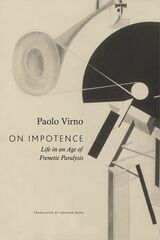 On Impotence: Life in an Age of Frenetic Paralysis
Paolo Virno
Seagull Books, 2026 An incisive and urgent book that explores the hidden roots of our contemporary powerlessness.
Contemporary life is marked by a paradoxical form of impotence. Whether in love, labor, or political struggle, we often find ourselves locked in a state of frenetic paralysis—unable to act as we wish or to endure what confronts us. This impotence is not born of lack, but of excess: an abundance of skills, capacities, and opportunities that, instead of taking form as coherent actions or speech, stagnate and turn in on themselves. In this thought-provoking meditation, philosopher Paolo Virno examines this strange impotence through the lens of classical thought, drawing especially on Aristotle and Marx.
To overcome this troubling state, Virno calls for a collective search for a shared spiritual and practical exercise aimed at reclaiming agency. He argues that only by learning to renounce renunciation can we cultivate deliberate words and timely decisions.
 On Integration in Plants
Rudolf Dostal
Harvard University Press Based on the author's long life of study, observation, and experimentation, this book clears the way for the exploration of many problems in an area of botanical research about which little substantial biochemical information is yet available. Mr. Dostál's investigations largely concern the interrelations among the different organs of plants and the ways in which the various components of the plant correlate to form an integrated whole.
Mr. Dostál writes that he "early acquired the certitude that all regulations in plants take place with an absolute determinism, an iron necessity." He describes many very simple experiments, such as removing all the leaves of a horse chestnut and all the new leaves that follow, until ultimately leaves of an entirely different form, pinnate like those of a legume, develop. Experiments on algae, in parallel with those on higher plants, add to the breadth of the coverage. Much of the work has not been published in scientific journals, and is here presented in simple terms comprehensible to the intelligent layman.
The author also discusses the vital part played by inhibiting substances in the development of the primordia of leaves and other organs, serving as regulators and conservators of reserves, so as to ensure unified organization instead of the chaos that would otherwise result. He finds, too, that his experiments support the idea, now becoming widely accepted, that food for plants may be regarded as a condition rather than a causal factor in their growth and development. As an extension of Mr. Dostál's experimental observations, 40 original figures containing 161 partial illustrations are of exceptional value.
 On Intellectual Activism
Patricia Hill Collins
Temple University Press, 2012 Sociologist Patricia Hill Collins has been called in Contemporary Sociology “one of the defining voices of contemporary feminist and race scholarship.” Well known for her contributions to sociology, social theory, and cultural studies, her numerous publications indicate why she has been a tireless voice for social justice causes such as the dynamics of race, social class, gender, and sexual equality, and also black feminist politics.
In On Intellectual Activism, Collins asks scholars and public intellectuals to assess the meaning of their work. She challenges readers to rethink the potential of speaking truth to power, and examines both the role of the intellectual in public life and how well questions of contemporary social issues are communicated to the public at large. The contents of this volume—public lectures, previously published pieces, interviews, and new essays—illustrate the important conceptual anchors of Collins’ work and reflect on the major themes of her illustrious career. These timely and thought-provoking essays include topics ranging from black feminist thought, critical education, public sociology, and resisting racism to new visions for activist intellectuals.
On Intelligence: A Biological Treatise on Intellectual Development, Expanded Edition
Stephen Ceci
Harvard University Press, 1996 Ceci argues that traditional conceptions of intelligence ignore the role of society in shaping intelligence and underestimate the intelligence of non-Western societies. He puts forth a "bio-ecological" framework of individual differences in intellectual development that is intended to address some of the major deficiencies of extant theories of intelligence. The focus is on alternative interpretations of phenomena that emerge when implicit assumptions of intelligence researchers are challenged.
 On Internal War: American and Soviet Approaches to Third World Clients and Insurgents
William E. Odom
Duke University Press, 1992 William E. Odom combines expertise in political science and military affairs to challenge both conventional and unconventional wisdom about insurgencies and political development. The author concludes that in all three components of U.S. strategy for counterinsurgency—political, economic, and military—faulty notions of causation inform policy. U.S. advice to embattled governments fails to recognize the inherent clash of development goals; direct fiscal aid hurts more often than it helps recipient governments; and the focus of U.S. military assistance on fighting insurgents plays to their strengths and fails to exploit their weaknesses.
On Internal War reviews the contrasting theory and practice in Soviet and American approaches to their competition in the Third World and relates them to indigenous causes of internal wars. Odom also integrates the military dimensions of insurgencies with external influences and internal politics. Drawing on political development theory, he underscores the sources of instability in Third World states that make insurgencies more likely and offers ways to assess the prospects for democracy in specific cases.
The centerpiece of the study is a practical application of the author’s analysis to three case studies—El Salvador, Guatemala, and the Philippines—and a regional assessment of the Middle East. Odom provides no panaceas but suggests that more promising strategies can be devised.
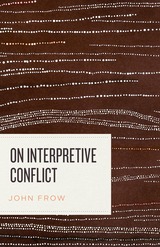 On Interpretive Conflict
John Frow
University of Chicago Press, 2019 “Interpretation” is a term that encompasses both the most esoteric and the most fundamental activities of our lives, from analyzing medical images to the million ways we perceive other people’s actions. Today, we also leave interpretation to the likes of web cookies, social media algorithms, and automated markets. But as John Frow shows in this thoughtfully argued book, there is much yet to do in clarifying how we understand the social organization of interpretation.
On Interpretive Conflict delves into four case studies where sharply different sets of values come into play—gun control, anti-Semitism, the religious force of images, and climate change. In each case, Frow lays out the way these controversies unfold within interpretive regimes that establish what counts as an interpretable object and the protocols of evidence and proof that should govern it. Whether applied to a Shakespeare play or a Supreme Court case, interpretation, he argues, is at once rule-governed and inherently conflictual. Ambitious and provocative, On Interpretive Conflict will attract readers from across the humanities and beyond.
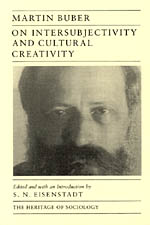 On Intersubjectivity and Cultural Creativity
Martin Buber
University of Chicago Press, 1992 One of the foremost religious and social philosophers of the twentieth century, Martin Buber also wrote extensively on sociological subjects, particularly as these affected his philosophical concerns. Collected here, these writings offer essential insights into the human condition as it is expressed in culture and society.
Buber's central focus in his sociological work is the relation between social interaction, or intersubjectivity, and the process of human creativity. Specifically, Buber seeks to define the nature and conditions of creativity, the conditions of authentic intersubjective social relations that nurture creativity in society and culture. He attempts to identify situations favorable to creativity that he believes exist to some extent in all cultures, though their fullest development occurs only rarely.
Buber considers the combination of open dialogue between human and human and a dialogue between man and God to be necessary for the crystallization of the common discourse that is essential for holding a free, just, and open society together.
Important for an understanding of Buber's thought, these writings—touching on education, religion, the state, and charismatic leadership—will be of profound value to students of sociology, philosophy, and religion.
ON INTIMATE TERMS: The Psychology of Difference in Lesbian Relationships
Beverly Burch
University of Illinois Press, 1993 On Intimate Terms looks at the internal logic of lesbian relationships, arguing that they are not patterned after heterosexual ones but rely on the interplay of psychosexual differences between women. The book suggests that everyone seeks psychic complementarity with an Other in intimate relationships as a way of supporting personal growth and development. A complementary partner is one who is different in some individually meaningful way, not necessarily in terms of gender.
"A very thoughtful and thought-provoking piece of work. . . . It will be a strong contribution to the fields of lesbian studies, gender relations, and feminist psychoanalysis." - Diane Ehrensaft, author of Parenting Together: Men and Women Sharing the Care of Their Children
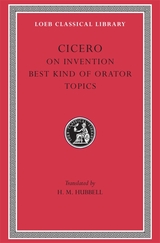 On Invention. The Best Kind of Orator. Topics
Cicero
Harvard University Press Three rhetorical treatises.
Cicero (Marcus Tullius, 106–43 BC), Roman lawyer, orator, politician, and philosopher, of whom we know more than of any other Roman, lived through the stirring era that saw the rise, dictatorship, and death of Julius Caesar in a tottering republic. In his political speeches especially and in his correspondence we see the excitement, tension and intrigue of politics and the part he played in the turmoil of the time. Of about 106 speeches, delivered before the Roman people or the Senate if they were political, before jurors if judicial, fifty-eight survive (a few of them incompletely). In the fourteenth century Petrarch and other Italian humanists discovered manuscripts containing more than 900 letters of which more than 800 were written by Cicero and nearly 100 by others to him. These afford a revelation of the man all the more striking because most were not written for publication. Six rhetorical works survive and another in fragments. Philosophical works include seven extant major compositions and a number of others; and some lost. There is also poetry, some original, some as translations from the Greek.
The Loeb Classical Library edition of Cicero is in twenty-nine volumes.
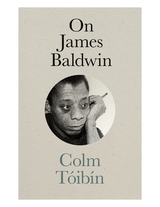 On James Baldwin
Colm Toibin
Brandeis University Press, 2024 Colm Tóibín’s personal account of encountering James Baldwin’s work, published in Baldwin’s centenary year.
Acclaimed Irish novelist Colm Tóibín first read James Baldwin just after turning eighteen. He had completed his first year at an Irish university and was struggling to free himself from a religious upbringing. He had even considered entering a seminary and was searching for literature that would offer illumination and insight. Inspired by the novel Go Tell It on the Mountain, Tóibín found a writer who would be a lifelong companion and exemplar.
From On James Baldwin
Baldwin was interested in the hidden and dramatic areas in his own being, and was prepared as a writer to explore difficult truths about his own private life. In his fiction, he had to battle for the right of his protagonists to choose or influence their destinies. He knew about guilt and rage and bitter privacies in a way that few of his White novelist contemporaries did. And this was not simply because he was Black and homosexual; the difference arose from the very nature of his talent, from the texture of his sensibility. “All art,” he wrote, “is a kind of confession, more or less oblique. All artists, if they are to survive, are forced, at last, to tell the whole story, to vomit the anguish up.”
On James Baldwin is a magnificent contemporary author’s tribute to one of his most consequential literary progenitors.
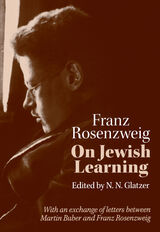 On Jewish Learning
Franz Rosenzweig; Edited by N. N. Glatzer
University of Wisconsin Press, 2002 Franz Rosenzweig is one of the greatest contributors to Jewish philosophy in the twentieth century and is, with Martin Buber and Abraham Heschel, one of the Jewish thinkers most widely read by Christians. On Jewish Learning collects essays, speeches, and letters that express Rosenzweig’s desire to reconnect the profound truths of Judaism with the lives of ordinary people. An assimilated Jew and scholar of German philosophy, Rosenzweig was on the point of conversion to Christianity when the experience of a Yom Kippur service in 1913 brought him back to Judaism, and he began to study with philosopher Hermann Cohen. Seeking how to be an observant Jew in the modern world, Rosenzweig refused to characterize the traditions of Jewish law as mere rituals, customs, and folkways. His aim for himself and for others was to find Judaism by living it, and to live it by knowing it more deeply. The Wisconsin edition is not for sale in the British Commonwealth, the Republic of Ireland, or South Africa.
 On Job
Blind Didymus the Blind
Catholic University of America Press This volume provides the first full length English translation of the commentary on the Book of Job by Didymus the Blind. One of the earliest line-by-line commentaries on Job to survive from late antiquity, it covers the entirety of the first sixteen chapters of the LXX text of Job with a few unfortunate lacunae. It represents the third commentary of Didymus published in the Fathers of the Church series (preceded by Didymus’ On Genesis and On Zechariah translated by Robert C. Hill) and the last of the commentaries discovered at Tura in 1941 that was edited for circulation in late antiquity, since Didymus’ comments on Ecclesiastes and Psalms are unedited transcripts of his public lectures, replete with student questions.
The Book of Job has garnered perpetual attention because of its intriguing dialogues between God and the Devil, Job and his wife, Job and his three friends and inevitably between Job and God. In recent years, it has become the focus of attention among scholars seeking to make sense of the horrors of the Holocaust and other 20th century atrocities where unlimited human cruelty and injustice strained any notions of Providence and the salvific nature of suffering by the righteous. Written at a pivotal time when Christianity and Rabbinic Judaism were emerging as distinct interpretive traditions, Didymus’ commentary on the book of Job offers important insights into the interpretation of Job based on the LXX translation which was a foundational text for early Christian doctrine, spirituality and liturgy. His presentation of Job as the icon of a student-loving teacher stands in contrast to the portrait of a blasphemous Job more familiar to modern audiences that value a bold iconoclastic character who puts God on trial for allowing human injustice. Didymus’ comments on Job hint at the blind teacher’s own mature consideration of his experience as a Christian teacher, concerned to train other potential leaders in the burgeoning post-Constantinian Church, whether as an ecclesiastical minister, monastic abba, governor, or teacher. As such, this early Christian commentary on the Book of Job merits further study because it illustrates an early exegetical trajectory that was already embedded in the Christian tradition prior Jerome’s advocacy of the Hebraica Veritas.
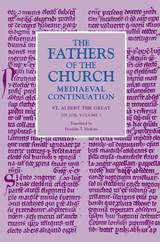 On Job, Volume 1
St. Albert The Great
Catholic University of America Press, 2019 Even prior to his death on 15 November 1280, the Dominican master Albert of Lauingen was legendary on account of his erudition. He was widely recognized for the depth and breadth of his learning in the philosophical disciplines as well as in the study of God, earning him the titles Doctor universalis and Doctor expertus. Moreover, his authoritative teaching merited him the moniker Magnus, an appellation bestowed on no other man of the High Middle Ages. This volume contains the first half of Albert the Great’s commentary On Job (on chs. 1-21), translated into English for the first time; a translation of the second half of the work will appear in a subsequent volume of the Fathers of the Church, Mediaeval Continuation series. Albert completed Super Iob in 1272 or 1274, when he was over seventy years old, at the Dominican Kloster of Heilige Kreuz in Cologne, where, as lector emeritus of the Order, he likely lectured on this profound biblical book. Significantly, Albert may have been inspired to produce On Job by his most famous student, Thomas Aquinas, who had written his own Joban commentary, the Expositio super Iob ad litteram, while serving as conventual lector at San Domenico in Orvieto from 1261 to 1264. Yet Albert occupies a unique position in the history of the interpretation of Job: he is the first and only exegete in history who explicitly reads the whole book as a debate in the mode of an academic or scholastic disputation among Job and his friends about divine providence concerning human affairs. The Introduction to this volume situates Albert’s On Job—its general approach and key exegetical features—in the broad context of Dominican theological education and pastoral formation in the thirteenth century.
 On Job, Volume 2
St. Albert the Great
Catholic University of America Press Even prior to his death on 15 November 1280, the Dominican master Albert of Lauingen was legendary for his erudition. He was widely recognized for the depth and breadth of his learning in the philosophical disciplines as well as in the study of God, earning him the titles Doctor universalis and Doctor expertus. Moreover, his authoritative teaching merited him the moniker Magnus, an appellation bestowed on no other man of the High Middle Ages.
This volume contains the second half of Albert the Great’s commentary On Job (on chs. 22-42), translated into English for the first time; a translation of the first half of the work appeared in an earlier volume of the Fathers of the Church, Mediaeval Continuation series (vol. 19, 2019). Albert completed Super Iob in 1272 or 1274, when he was over seventy years old, at the Dominican Kloster of Heilige Kreuz in Cologne, where, as lector emeritus of the Order, he likely lectured on this profound biblical book. Significantly, Albert may have been inspired to produce On Job by his most famous student, Thomas Aquinas, who had written his own Joban commentary, the Expositio super Iob ad litteram, while serving as conventual lector at San Domenico in Orvieto from 1261 to 1264. Yet Albert occupies a unique position in the history of the interpretation of Job: he is the first and only exegete in history who explicitly reads the whole book as a debate in the mode of an academic or scholastic disputation among Job and his friends about divine providence concerning human affairs. Albert understands God, in the final chapters of Job, to determine the disputed question in favor of Job and against his friends, namely declaring that He (i.e., God) rules human life with no consideration of human works, but rather that divine governance is dissimilar to every mode of human rule.
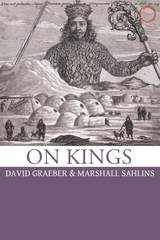 On Kings
David Graeber and Marshall Sahlins
HAU, 2017 In anthropology as much as in popular imagination, kings are figures of fascination and intrigue, heroes or tyrants in ways presidents and prime ministers can never be. This collection of essays by two of the world’s most distinguished anthropologists—David Graeber and Marshall Sahlins—explores what kingship actually is, historically and anthropologically. As they show, kings are symbols for more than just sovereignty: indeed, the study of kingship offers a unique window into fundamental dilemmas concerning the very nature of power, meaning, and the human condition.
Reflecting on issues such as temporality, alterity, and utopia—not to mention the divine, the strange, the numinous, and the bestial—Graeber and Sahlins explore the role of kings as they have existed around the world, from the BaKongo to the Aztec to the Shilluk and beyond. Richly delivered with the wit and sharp analysis characteristic of Graeber and Sahlins, this book opens up new avenues for the anthropological study of this fascinating and ubiquitous political figure.
On Kissing, Tickling, and Being Bored: Psychoanalytic Essays on the Unexamined Life
Adam Phillips
Harvard University Press, 1993 In a style that is writerly and audacious, Adam Phillips takes up a variety of seemingly ordinary subjects underinvestigated by psychoanalysis--kissing, worrying, risk, solitude, composure, even farting as it relates to worrying.
He argues that psychoanalysis began as a virtuoso improvisation within the science of medicine, but that virtuosity has given way to the dream of science that only the examined life is worth living. Phillips goes on to show how the drive to omniscience has been unfortunate both for psychoanalysis and for life. He reveals how much one's psychic health depends on establishing a realm of life that successfully resists examination.
 On Knowing: Essays for the Left Hand, Second Edition
Jerome Bruner
Harvard University Press, 1979 The left hand has traditionally represented the powers of intuition, feeling, and spontaneity. In this classic book, Jerome Bruner inquires into the part these qualities play in determining how we know what we do know; how we can help others to know—that is, to teach; and how our conception of reality affects our actions and is modified by them.
The striking and subtle discussions contained in On Knowing take on the core issues concerning man’s sense of self: creativity, the search for identity, the nature of aesthetic knowledge, myth, the learning process, and modern-day attitudes toward social controls, Freud, and fate. In this revised, expanded edition, Bruner comments on his personal efforts to maintain an intuitively and rationally balanced understanding of human nature, taking into account the odd historical circumstances which have hindered academic psychology’s attempts in the past to know man.
Writing with wit, imagination, and deep sympathy for the human condition, Jerome Bruner speaks here to the part of man’s mind that can never be completely satisfied by the right-handed virtues of order, rationality, and discipline.
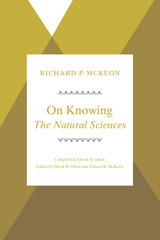 On Knowing--The Natural Sciences
Richard P. McKeon
University of Chicago Press, 1994 Well before the current age of discourse, deconstruction, and multiculturalism, Richard McKeon propounded a philosophy of pluralism showing how "facts" and "values" are dependent on diverse ways of reading texts. This book is a transcription of an entire course, including both lectures and student discussions, taught by McKeon. As such, it provides an exciting introduction to McKeon's conception of pluralism, a central aspect of neo-Pragmatism, while demonstrating how pluralism works in a classroom setting.
In his lectures, McKeon outlines the entire history of Western thinking on the sciences. Treating the central concepts of motion, space, time, and cause, he traces modern intellectual debates back to the ancient Greeks, notably Plato, Aristotle, Democritus, and the Sophists. As he brings the story of Western science up to the twentieth century, he uses his fabled semantic schema (reproduced here for the first time) to uncover new ideas and observations about cosmology, mechanics, dynamics, and other aspects of physical science.
Illustrating the broad historical sweep of the lectures are a series of discussions which give detail to the course's intellectual framework. These discussions of Plato, Aristotle, Galileo, Newton, and Maxwell are perhaps the first published rendition of a philosopher in literal dialogue with his students. Led by McKeon's pointed questioning, the discussions reveal the difficulties and possibilities of learning to engage in serious intellectual communication.
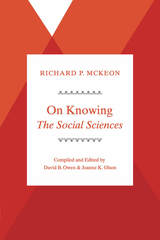 On Knowing--The Social Sciences
Richard P. McKeon
University of Chicago Press, 2017 As a philosopher, Richard McKeon spent his career developing Pragmatism in a new key, specifically by tracing the ways in which philosophic problems arise in fields other than philosophy—across the natural and social sciences and aesthetics—and showed the ways in which any problem, pushed back to its beginning or taken to its end, is a philosophic problem. The roots of this book, On Knowing—The Social Sciences, are traced to McKeon’s classes where he blended philosophy with physics, ethics, politics, history, and aesthetics.
This volume—the second in a series—leaves behind natural science themes to embrace freedom, power, and history, which, McKeon argues, lay out the whole field of human action. The authors McKeon considers—Hobbes, Machiavelli, Spinoza, Kant, and J. S. Mill—show brilliantly how philosophic methods work in action, via analyses that do not merely reduce or deconstruct meaning, but enhance those texts by reconnecting them to the active history of philosophy and to problems of ethics, politics, and history. The waves of modernism and post-modernism are receding. Philosophic pluralism is now available, fully formulated, in McKeon’s work, spreading from the humanities to the social sciences.
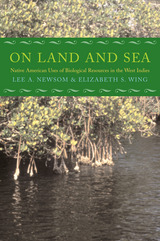 On Land and Sea: Native American Uses of Biological Resources in the West Indies
Lee A. Newsom and Elizabeth S. Wing
University of Alabama Press, 2003 During the vast stretches of early geologic time, the islands of the Caribbean archipelago separated from continental land masses, rose and sank many times, merged with and broke from other land masses, and then by the mid-Cenozoic period settled into the current pattern known today. By the time Native Americans arrived, the islands had developed complex, stable ecosystems. The actions these first colonists took on the landscape—timber clearing, cultivation, animal hunting and domestication, fishing and exploitation of reef species—affected fragile land and sea biotic communities in both beneficial and harmful ways. On Land and Sea examines the condition of biosystems on Caribbean islands at the time of colonization, human interactions with those systems through time, and the current state of biological resources in the West Indies. Drawing on a massive data set collected from long-term archaeological research, the study reconstructs past lifeways on these small tropical islands. The work presents a wide range of information, including types of fuel and construction timber used by inhabitants, cooking techniques for various shellfish, availability and use of medicinal and ritual plants, the effects on native plants and animals of cultivation and domestication, and diet and nutrition of native populations. The islands of the Caribbean basin continue to be actively excavated and studied in the quest to understand the earliest human inhabitants of the New World. This comprehensive work will ground current and future studies and will be valuable to archaeologists, anthropologists, botanists, ecologists, Caribbeanists, Latin American historians, and anyone studying similar island environments.
 On Language
Roman Jakobson
Harvard University Press, 1990 One measure of Roman Jakobson's towering role in linguistics is that his work has defined the field itself. Jakobson's contributions have now become a permanent part of American and European views on language. With his uncanny ability to survive devastating uprooting again and again--from Moscow to Prague to Upsalla to New York and finally to Cambridge--Jakobson was able to bring to each milieu new and stimulating ideas, which have broadened the perspective of linguistics while giving it new direction and specifying its domain. Linda Waugh and Monique Monville-Burston have assembled an intellectual overview of his work in linguistics from partial and complete works that they have arranged, introduced, and cross-referenced. Some appear here in print for the first time, others are newly translated into English. More than a convenient access to Jakobson's basic works, On Language presents a broad profile of the polymathic general linguist who suggested radical innovations in every area of linguistic theory.
The breadth of Jakobson's engagement in linguistics is captured by the editors' informative introduction and by their perspicacious presentation of topics. His general view of the science of linguistics is followed by his stunning contributions to linguistic metatheory in the areas of structure and function. Various aspects of historical, typological, and sociolinguistics are also explored along with his phonological theory--perhaps his most influential contribution--and his views on grammatical semantics. A topic that increasingly preoccupied Jakobson in his later career, the interrelationship between sound and meaning, is presented here in detail. The concluding three essays focus on the various relations between linguistics and the human and natural sciences, which led Jakobson ultimately to be characterized as an interdisciplinary thinker.
On Latin Adverbs
Harm Pinkster
Amsterdam University Press, 2006 This study deals with a number of aspects of the words which are usually called adverbs in Latin. It contains on the one hand a critical discussion of their treatment in Latin grammatical studies -- the characteristics attributed to them, their relationship to other words -- and on the other hand a discussion of the conditions that have to be met in order to achieve a better (sub)classification -- general problems of classification as well as criteria for affecting such classification -- and a better description of the functions of adverbs in larger constructions. The study contains, therefore, both language-specific sections and more general ones. The author wrote the passages specifically dealing with Latin in such a way that they are clear enough to the non-Latinist, the more general passages in such a way that they are understandable for Latinists who are not acquainted with recent developments in linguistics.
On Law and Justice
Paul A. Freund
Harvard University Press This collection of essays by Paul Freund, written over the past ten years, is divided into three parts. The first presents an appraisal of recent movements in constitutional law, putting contemporary criticism of the Supreme Court in historical perspective. The second part undertakes an analysis of the meaning of justice and rationality in judicial decisions, drawing on a wide range of illustrative cases. In the third group of essays, the author turns to the work of a number of distinguished judges—among them Chief Justice Stone and Justices Brandeis, Frankfurter, Jackson, and Black—and seeks to interpret their diverse approaches to the judicial function. Throughout the book, Freund is concerned with values in conflict, and the possibilities of their accommodation through the resources of the legal process.
 On Leaders and Tyrants
Poggio Bracciolini
Harvard University Press, 2024 The first complete English translation of a controversial Renaissance debate centering moral questions on power and leadership.
Poggio Bracciolini was a prominent scholar-official of the early Renaissance and a leading representative of Florentine humanism. He was employed as a secretary to seven popes and ended his career as Chancellor of the Republic of Florence. On Leaders and Tyrants contains texts, the majority by Poggio, relating to a controversy on the relative merits of the lives and deeds of Scipio Africanus and Julius Caesar. The debate addressed the nature of tyranny and military glory, as well as the qualities necessary for republican leaders, such as Stoic virtue, lawfulness, and good citizenship. Poggio’s primary opponent was the educator Guarino of Verona, a humanist in the service of the duke of Ferrara. The psychology of power, the demands placed on public servants, and the dividing line between leadership and tyranny are as topical today as they were when Poggio wrote. This volume contains a fresh edition of the Latin texts and the first complete translation of the controversy into English.
On Learning: A General Theory of Objects and Object-Relations
David Scott
University College London, 2021 A philosophical work that tackles the question, “What is learning?”.
What is learning? This book is a philosophical work that develops a general theory of ontological objects and object-relations, examining concepts as acquired dispositions. David Scott answers a series of questions about concepts in general and the concept of learning in particular. This volume offers a counterargument to empiricist conceptions of learning, rejecting the propagation of simple messages about learning, knowledge, curriculum, and assessment. Instead, Scott argues that values are central to understanding how we live, permeating our descriptions of the world, the attempts we make at creating better futures, and our relations with other people.
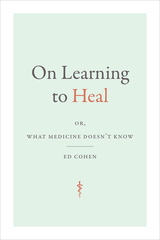 On Learning to Heal: or, What Medicine Doesn't Know
Ed Cohen
Duke University Press, 2023 At thirteen, Ed Cohen was diagnosed with Crohn’s disease—a chronic, incurable condition that nearly killed him in his early twenties. At his diagnosis, his doctors told him that the best he could hope for would be periods of remission. Unfortunately, doctors never mentioned healing as a possibility. In On Learning to Heal, Cohen draws on fifty years of living with Crohn’s to consider how Western medicine’s turn from an “art of healing” toward a “science of medicine” deeply affects both medical practitioners and their patients. He demonstrates that although medicine can now offer many seemingly miraculous therapies, medicine is not and has never been the only way to enhance healing. Exploring his own path to healing, he argues that learning to heal requires us to desire and value healing as a vital possibility. With this book, Cohen advocates reviving healing’s role for all those whose lives are touched by illness.
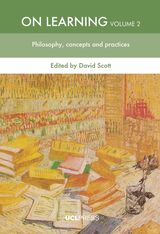 On Learning, Volume 2: Philosophies, Concepts and Practices
Edited by David Scott
University College London, 2024 An original and provocative interpretation of learning as a concept and as a practice.
The contributors to this volume focus on two meta-concepts: knowledge and learning, on the relationship between the two, and the way these can be framed in epistemic, social, political, and economic terms. Knowledge and learning, as meta-concepts, are positioned in various networks or constellations of meaning, principally: their antecedents, their relations to other relevant concepts, and the way the concepts are used in the lifeworld.
The various authors in this book explore several important concepts that are relevant to the idea of learning: Meta-concepts such as epistemology, inferential role semantics, phenomenology, rationality, thinking, hermeneutics, critical realism, and pragmatism. Meso-concepts such as probability, woman, training, assessment, education, system, race, friendship, Bildung, curriculum, ecology and pedagogy. Like David Scott’s first volume of On Learning, this collection also focuses on philosophy, concepts, and practices as a response to empiricist and positivist conceptions of knowledge. It challenges reductionist ideas of learning that have filtered through to the management of our schools, colleges, and universities; confronts over-simplified messages about learning, knowledge, curriculum, and assessment; and fosters the denial that values are central to understanding how we live and how we should live, the normative dimension to social policy and social theory.
 On Learning, Volume 3: Knowledge, Curriculum and Ethics
David Scott
University College London, 2025 Moving beyond test scores and outcomes, this volume redefines what it means to learn by intertwining ideas from philosophy, mathematics, and social theory.
What does it mean to learn? In On Learning, Volume 3: Knowledge, Curriculum and Ethics, David Scott probes the intricate relationship between knowledge and learning, questioning reductionist and empiricist perspectives that dominate contemporary education. This volume, like the first two in the series, critically analyzes the philosophical and ethical dimensions of learning, pushing beyond simplified notions of curriculum and assessment. Scott ties in a range of key concepts, including epistemology and critical realism, to offer a profound rethinking of what it means to know and engage with the world.
At the heart of this book is a call to recognize that learning is not merely a mechanical process or a set of measurable outcomes but a deeply human and ethical endeavor. On Learning, Volume 3 urges readers to reconsider the structures that shape education today and invites us to rethink how we understand knowledge and learning, and the values that underpin them.
 On Leaving: A Reading in Emerson
Branka Arsić
Harvard University Press, 2010 In his essay “Compensation,” Emerson makes a surprising claim: “Every soul is by this intrinsic necessity quitting its whole system of things, its friends, and home, and laws, and faith, as the shell-fish crawls out of its beautiful but stony case, because it no longer admits of its growth, and slowly forms a new house.”Branka Arsić unpacks Emerson’s repeated assertion that our reality and our minds are in constant flux. Arsić’s readings of a broad range of Emerson’s writings—the Early Lectures, Journals and Notebooks, and later lectures—are guided by a central question: what does it really mean to maintain that everything fluctuates, is relational, and so changes its identity?Reading Emerson through this lens, Arsić asks: How is the leaving of one’s own consciousness actually to be performed? What kind of relationship is predicated on the necessity of leaving? What does it mean for our system of values, our ethics and our political allegiances, and even our personal identities to be on the move? The bold new understanding of Emerson that results redefines inherited concepts of the Emersonian individual as all-composed, willful, appropriative, and self-reliant. In its place, Arsić reveals an Emersonian individual whose ideal being is founded in mutability.
 On Leibniz
Nicholas Rescher
University of Pittsburgh Press, 2003
Gottfried Wilhelm Leibniz (1646-1716) possessed one of history's great minds. The German philosopher, mathematician, and logician invented (independently of Sir Isaac Newton) calculus. His metaphysics bequeathed a set of problems and approaches that drove the course of Western philosophy, from Kant's eighteenth century until the present day.
For over fifty years, the study of Leibniz has been a consistent passion for distinguished philosopher Nicholas Rescher. On Leibniz offers eleven of his essays, written with signature clarity, exploring the aspects of Leibniz's work and life that still resonate in the discipline of philosophy.
Rescher's essays are snapshots of Leibniz, lucidly drawn case studies that explain the fundamentals of his ontology: the theory of possible worlds, the world's contingency, space-time frameworks, and intermonadic relationships.
Several illuminating pieces reveal Leibniz as a substantial contributor to theories of knowledge. Discussions of his epistemology and methodology, its relationship to John Maynard Keynes and Talmudic scholarship, broaden the traditional view of Leibniz as a uniquely metaphysical thinker.
Rescher also explores, in four absorbing biographical essays, Leibniz's scholarly development and professional career in historical context. As a "philosopher courtier" to the Hanoverian court, Leibniz was associated with the leading intellectuals and politicians of his era, including Spinoza, Huygens, Newton, Queen Sophie Charlotte, and Czar Peter the Great.
A concluding essay holds up Leibniz's mode of philosophy as a role model for today's scholars. Rescher argues that many current problems can be effectively addressed with principles of process philosophy along lines inspired by Leibniz's monadology. On Leibniz is essential reading for students of Leibniz and Rescher alike.
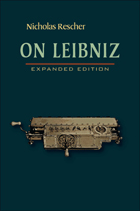 On Leibniz: Expanded Edition
Nicholas Rescher
University of Pittsburgh Press, 2013 Contemporary philosopher John Searle has characterized Gottfried Wilhelm Leibniz (1646–1716) as “the most intelligent human being who has ever lived.” The German philosopher, mathematician, and logician invented calculus (independently of Sir Isaac Newton), topology, determinants, binary arithmetic, symbolic logic, rational mechanics, and much more. His metaphysics bequeathed a set of problems and approaches that have influenced the course of Western philosophy from Kant in the eighteenth century until the present day.
On Leibniz examines many aspects of Leibniz’s work and life. This expanded edition adds new chapters that explore Leibniz’s revolutionary deciphering machine; his theoretical interest in cryptography and its ties to algebra; his thoughts on eternal recurrence theory; his rebuttal of the thesis of improvability in the world and cosmos; and an overview of American scholarship on Leibniz.
Other chapters reveal Leibniz as a substantial contributor to theories of knowledge. Discussions of his epistemology and methodology, its relationship to John Maynard Keynes and Talmudic scholarship, broaden the traditional view of Leibniz. Rescher also views Leibniz’s scholarly development and professional career in historical context. As a “philosopher courtier” to the Hanoverian court, Leibniz was associated with the leading intellectuals and politicians of his era, including Spinoza, Huygens, Newton, Queen Sophie Charlotte, and Tsar Peter the Great.
Rescher extrapolates the fundamentals of Leibniz’s ontology: the theory of possible worlds, the world’s contingency, space-time frameworks, and intermonadic relationships. In conclusion, Rescher positions Leibniz as a philosophical role model for today’s scholars. He argues that many current problems can be effectively addressed with principles of process philosophy inspired by Leibniz’s system of monadology.
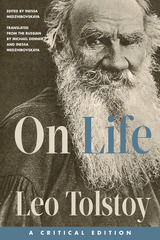 On Life: A Critical Edition
Leo Tolstoy, Edited by Inessa Medzhibovskaya, Translated from the Russian by Michael Denner and Inessa Medzhibovskaya
Northwestern University Press, 2018 In the summer of 1886, shortly before his fifty-eighth birthday, Leo Tolstoy was seriously injured while working in the fields of his estate. Bedridden for over two months, Tolstoy began writing a meditation on death and dying that soon developed into a philosophical treatise on life, death, love, and the overcoming of pessimism. Although begun as an account of how one man encounters and laments his death and makes this death his own, the final work, On Life, describes the optimal life in which we can all be happy despite our mortality.
After its completion, On Life was suppressed by the tsars, attacked by the hierarchs of the Russian Orthodox Church, and then censored by the Stalinist regime. This critical edition is the first accurate translation of this unsung classic of Russian thought into English, based on a study of manuscript pages of Tolstoy's drafts, and the first scholarly edition of this work in any language. It includes a detailed introduction and annotations, as well as historical material, such as early drafts, documents related to the presentation of an early version at the Moscow Psychological Society, and responses to the work by philosophers, religious leaders, journalists, and ordinary readers of Tolstoy's day.
On Liturgical Asceticism
David W. Fagerberg
Catholic University of America Press, 2013 Drawing on the Eastern Orthodox tradition of asceticism and integrating it with recent Western thought on liturgy, David W. Fagerberg examines the interaction between the two and presents a powerful argument that asceticism is necessary for understanding liturgy as the foundation of theology
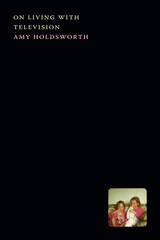 On Living with Television
Amy Holdsworth
Duke University Press, 2021 In On Living with Television, Amy Holdsworth examines the characteristics of intimacy, familiarity, repetition, and duration that have come to exemplify the medium of television. Drawing on feminist television studies, queer theory, and disability studies as well as autobiographical life-writing practices, Holdsworth shows how television shapes everyday activities, from eating and sleeping to driving and homemaking. Recounting her own life with television, she offers a sense of the joys and pleasures Disney videos brought to her disabled sister, traces how bedtime television becomes part of a daily routine between child and caregiver, explores her own relationship to binge-eating and binge-viewing, and considers the idea of home through the BBC family drama Last Tango in Halifax. By foregrounding the ways in which television structures our relationships, daily routines, and sense of time, Holdsworth demonstrates how television emerges as a potent vehicle for writing about life.
On Location: Theory and Practice in Classroom-Based Writing Tutoring
edited by Candace Spigelman & Laurie Grobman
Utah State University Press, 2005 Classroom-based writing tutoring is a distinct form of writing support, a hybrid instructional method that engages multiple voices and texts within the college classroom. Tutors work on location in the thick of writing instruction and writing activity. On Location is the first volume to discuss this emerging practice in a methodical way. The essays in this collection integrate theory and practice to highlight the alliances and connections on-location tutoring offers while suggesting strategies for resolving its conflicts. Contributors examine classroom-based tutoring programs located in composition courses as well as in writing intensive courses across the disciplines.
 On Long Winter Nights…: Memoirs of a Jewish Family in a Galician Township, 1870–1900
Hinde Bergner
Harvard University Press, 2005 The reader is given an intimate memoir of Jewish adolescence and life from a young woman’s perspective in an Eastern European shtetl at the end of the nineteenth century. Hinde Bergner, future mother of one of Yiddish literature’s greatest poets and grandmother of one of Israel’s leading painters, recalls the gradual impact of modernization on a traditional world as she finds herself caught between her thirst for a European education and true love, and the expectations of her traditional family. Written during the late 1930s as a series of episodes mailed to her children, and never completed due to Bergner’s murder at the hand of the Nazis, the memoir provides details about her teachers and matchmakers, domestic religion and customs, and the colorful characters that peopled a Jewish world that is no more.
Translated from the Yiddish and with a critical introduction by Justin Cammy, it is a lively addition to the library of Jewish women’s memoir, and should be of interest to students of Eastern European Jewish culture and women’s studies.
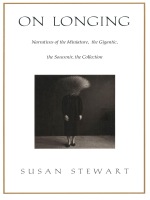 On Longing: Narratives of the Miniature, the Gigantic, the Souvenir, the Collection
Susan Stewart
Duke University Press, 1993 Miniature books, eighteenth-century novels, Tom Thumb weddings, tall tales, and objects of tourism and nostalgia: this diverse group of cultural forms is the subject of On Longing, a fascinating analysis of the ways in which everyday objects are narrated to animate or realize certain versions of the world. Originally published in 1984 (Johns Hopkins University Press), and now available in paperback for the first time, this highly original book draws on insights from semiotics and from psychoanalytic, feminist, and Marxist criticism. Addressing the relations of language to experience, the body to scale, and narratives to objects, Susan Stewart looks at the "miniature" as a metaphor for interiority and at the "gigantic" as an exaggeration of aspects of the exterior. In the final part of her essay Stewart examines the ways in which the "souvenir" and the "collection" are objects mediating experience in time and space.
On Louise Gluck: Change What You See
Joanne Feit Diehl, Editor
University of Michigan Press, 2005 On Louise Glück features essays by leading critics, poets, and scholars that explore the work of recent U.S. poet laureate Louise Glück.
Glück, author of nine books of poetry, including the Pulitzer Prize-winning The Wild Iris, is noted for her searing honesty and compelling first-person personae. Though compared to world-famous verse by Sappho and Dickinson, Glück's poetry has remained curiously undigested among readers of contemporary poetry for some time. On Louise Glück gathers for the first time a diverse array of essays by the leading critics of this preeminent poet. Featuring a probing, extended interview with Glück, On Louise Glück traces the critical reception of her work and offers new insights into her imaginative, mysterious poetry.
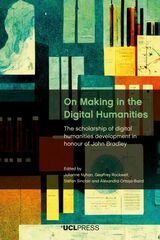 On Making in the Digital Humanities: The Scholarship of Digital Humanities Development in Honour of John Bradley
Edited by Julianne Nyhan, Geoffrey Rockwell, Stéfan Sinclair, and Alexandra Ortolja-Baird
University College London, 2023 A collection that explores the processes of making within the digital humanities.
On Making in the Digital Humanities fills a gap in our understanding of digital humanities projects and craft by exploring the processes of making as much as the products that arise from it. Focusing on the interwoven layers of human and technological textures that constitute digital humanities scholarship, it assembles a group of well-known, experienced, and emerging scholars in the digital humanities to reflect on various forms of making. The chapters gathered here are individually important, but together provide a very human view of what it is to do the digital humanities, in the past, present, and future. This book will accordingly be of interest to researchers, teachers, and students of the digital humanities; creative humanities, including maker spaces and culture; information studies; the history of computing and technology; and the history of science and the humanities.
 On Manly Courage: A Study of Plato's Laches
Walter T. Schmid. Foreword by George Kimball Plochmann
Southern Illinois University Press, 1992 Walter T. Schmid offers the first original interpretation of the Laches since Hermann Bonitz in the nineteenth century in the only full-length commentary on the Laches available in English. Schmid divides the book into five main discussions: the historical background of the dialogue; the relation of form and content in a Platonic dialogue and specific structural and aesthetic features of the Laches; the first half of the dialogue, which introduces the characters and considers the theme of the education of young men; the inquiry with Laches, which examines the traditional Greek conception of military courage; and the inquiry with Nicias in which two nontraditional conceptions of courage are mooted, one closely associated with the sophistic movement in Athens, the other with Socrates himself. Furnishing a detailed paragraph-by-paragraph reading that traces Socrates’ ongoing quest for virtue and wisdom—a wisdom founded in the action of a whole human life—Schmid conclusively shows how and why the Laches fills an important niche in Plato’s moral theory.
On Mark Twain: The Best from American Literature
Louis J. Budd and Edwin H. Cady, eds.
Duke University Press, 1987 From 1929 to the latest issue, American Literature has been the foremost journal expressing the findings of those who study our national literature. American Literature has published the best work of literary historians, critics, and bibliographers, ranging from the founders of discipline to the best current critics and researchers. The longevity of this excellence lends a special distinction to the articles in American Literature. Presented in order of their first appearance, the articles in each volume constitute a revealing record of developing insights and important shifts of critical emphasis. Each article has opened a fresh line of inquiry, established a fresh perspective on a familiar topic, or settled a question that engaged the interest of experts.
On Married Love. Eridanus
Giovanni Gioviano Pontano
Harvard University Press Giovanni Pontano (1429–1503), whose academic name was Gioviano, was one of the great scholar-poets of the Renaissance as well as a leading statesman who served as prime minister to the Kings of Aragon and southern Italy. The dominant literary figure of quattrocento Naples, Pontano produced literary works in several genres and was the leader of the Neapolitan academy. Among his large poetic output are the two brilliantly original poetical cycles that comprise the present volume. On Married Love stakes out new ground in the Western tradition as the first sustained exploration of married love in first-person poetry. In Eridanus, which celebrates the poet’s love for a mistress, Pontano combines the familiar motifs of courtly love with the allusive matrix of classical elegy and his own distinctive vision. Both works are here translated into English for the first time.
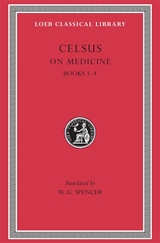 On Medicine, Volume I: Books 1–4
Celsus
Harvard University Press A Roman layman’s account of medicine in his time.
A. Cornelius Celsus was author, probably during the reign of the Roman Emperor Tiberius (AD 14–37), of a general encyclopedia of agriculture, medicine, military arts, rhetoric, philosophy, and jurisprudence, in that order of subjects. Of all this great work there survives only the eight books on medicine (De Medicina).
In Book I, after an excellent survey of Greek schools (Dogmatic, Methodic, Empiric) of medicine come sensible dietetics that will always be applicable. Book II deals with prognosis, diagnosis of symptoms (which he stresses strongly), and general therapeutics. Book III addresses internal ailments, fevers, and general diseases. Book IV treats local bodily diseases. Next come two pharmacological books, Book V on treatment by drugs of general diseases, and Book VI on local diseases. Books VII and VIII deal with surgery; these books contain accounts of many operations, including amputation.
Celsus was not a professional doctor of medicine or a surgeon, but a practical layman whose On Medicine, written in a clear and neat style for lay readers, is partly a result of his medical treatment of his household (slaves included), and partly a presentation of information gained from many Greek authorities. From no other source can we learn so much of the condition of medical science up to his own time.
The Loeb Classical Library edition of Celsus is in three volumes.
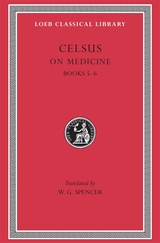 On Medicine, Volume II: Books 5–6
Celsus
Harvard University Press A Roman layman’s account of medicine in his time.
A. Cornelius Celsus was author, probably during the reign of the Roman Emperor Tiberius (AD 14–37), of a general encyclopedia of agriculture, medicine, military arts, rhetoric, philosophy, and jurisprudence, in that order of subjects. Of all this great work there survives only the eight books on medicine (De Medicina).
In Book I, after an excellent survey of Greek schools (Dogmatic, Methodic, Empiric) of medicine come sensible dietetics that will always be applicable. Book II deals with prognosis, diagnosis of symptoms (which he stresses strongly), and general therapeutics. Book III addresses internal ailments, fevers, and general diseases. Book IV treats local bodily diseases. Next come two pharmacological books, Book V on treatment by drugs of general diseases, and Book VI on local diseases. Books VII and VIII deal with surgery; these books contain accounts of many operations, including amputation.
Celsus was not a professional doctor of medicine or a surgeon, but a practical layman whose On Medicine, written in a clear and neat style for lay readers, is partly a result of his medical treatment of his household (slaves included), and partly a presentation of information gained from many Greek authorities. From no other source can we learn so much of the condition of medical science up to his own time.
The Loeb Classical Library edition of Celsus is in three volumes.
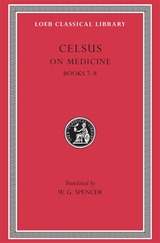 On Medicine, Volume III: Books 7–8
Celsus
Harvard University Press A Roman layman’s account of medicine in his time.
A. Cornelius Celsus was author, probably during the reign of the Roman Emperor Tiberius (AD 14–37), of a general encyclopedia of agriculture, medicine, military arts, rhetoric, philosophy, and jurisprudence, in that order of subjects. Of all this great work there survives only the eight books on medicine (De Medicina).
In Book I, after an excellent survey of Greek schools (Dogmatic, Methodic, Empiric) of medicine come sensible dietetics that will always be applicable. Book II deals with prognosis, diagnosis of symptoms (which he stresses strongly), and general therapeutics. Book III addresses internal ailments, fevers, and general diseases. Book IV treats local bodily diseases. Next come two pharmacological books, Book V on treatment by drugs of general diseases, and Book VI on local diseases. Books VII and VIII deal with surgery; these books contain accounts of many operations, including amputation.
Celsus was not a professional doctor of medicine or a surgeon, but a practical layman whose On Medicine, written in a clear and neat style for lay readers, is partly a result of his medical treatment of his household (slaves included), and partly a presentation of information gained from many Greek authorities. From no other source can we learn so much of the condition of medical science up to his own time.
The Loeb Classical Library edition of Celsus is in three volumes.
On Melville: The Best from American Literature
Louis J. Budd and Edwin H. Cady, eds.
Duke University Press, 1988 From 1929 to the latest issue, American Literature has been the foremost journal expressing the findings of those who study our national literature. The journal has published the best work of literary historians, critics, and bibliographers, ranging from the founders of the discipline to the best current critics and researchers. The longevity of this excellence lends a special distinction to the articles in American Literature.
Presented in order of their first appearance, the articles in each volume constitute a revealing record of developing insights and important shifts of critical emphasis. Each article has opened a fresh line of inquiry, established a fresh perspective on a familiar topic, or settled a question that engaged the interest of experts.
On Merleau-Ponty
Jean-Paul Sartre
Seagull Books, 2021 A moving tribute to phenomenologist Maurice Merleau-Ponty in the wake of his early death.
Iconic French novelist, playwright, and essayist Jean-Paul Sartre is widely recognized as one of the most important philosophers of the twentieth century, and his work has remained relevant and thought-provoking through the decades. The Seagull Sartre Library now presents some of his most incisive philosophical, cultural, and literary critical essays in twelve newly designed and affordable editions.
This volume consists of a single long essay that analyzes the work of Maurice Merleau-Ponty (1908–1961), who was the leading phenomenological philosopher in France and the lead editor of the influential leftist journal Les Temps modernes, which he established with Sartre and Simone de Beauvoir in 1945. Written in the wake of Merleau-Ponty’s death, this essay is a moving tribute from one major philosopher to another.
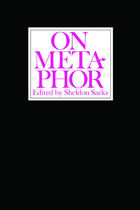 On Metaphor
Edited by Sheldon Sacks
University of Chicago Press, 1979 On Metaphor, a collection of fourteen essays by eminent philosophers, literary critics, theologians, art historians, and psychologists, illustrates and explores a striking phenomenon in modern intellectual history: the transformation of metaphor from a specialized concern of rhetoricians and literary critics to a central concept in the study of human understanding. These lively and provocative essays probe the nature, function, and meaning of metaphor and collectively demonstrate the multidisciplinary implications of the concept.
Because of its comprehensive scope, the volume is useful both as a resource for those interested in contemporary philosophy and theories of language and as a text for courses in such areas as the philosophy of language, critical theory, and the philosophy of knowledge. Originally published as a special issue of Critical Inquiry, the present collection includes two new contributions by Max Black and Nelson Goodman, along with a comprehensive index to the work.
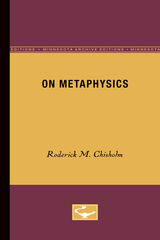 On Metaphysics
Roderick Chisholm
University of Minnesota Press, 1989
On Metaphysics was first published in 1989.On Metaphysics brings together eighteen essays by a self-described analytic philosopher who is concerned with redirecting the linguistic emphasis in contemporary philosophy toward the traditional questions of metaphysics. The essays explore the most fundamental categories of reality: substance and attribute; parts and wholes; human freedom and the self; coming into being and passing away; and the nature of objective reference. Chisholm combines an “internal” approach to theory of knowledge with an “intentional” approach to metaphysics. The book thus presupposes that the self is better known to the self that is any other individual thing, and that our knowledge of ourselves provides us with the key to understanding the problems of ontology.Chisholm has made both minor and major revisions in many of the essays since their initial publication. “The Categories,” written expressly for this book, represents a summation of the ontology set forth in On Metaphysics.
 On Methods
Jacopo Zabarella
Harvard University Press, 2013 Jacopo Zabarella's two treatises On Methods and On Regressus (1578) are among the most important Renaissance discussions of how scientific knowledge should be acquired, arranged, and transmitted. They belong to a lively debate about the order in which sciences should be taught and the method to be followed in scientific demonstration that roiled the Late Renaissance world for decades. In these famous works Zabarella rejected the views of Ramists and modern Galenists in favor of the pure doctrine of Aristotle, freed from misunderstandings foisted upon it by medieval interpreters. The influence of these works on Galileo's scientific method and Descartes' famous Discourse on Method (1637) has long been debated. They are here translated into English for the first time, along with a new Latin text based on the corrected 1586 edition.
Volume 1 contains On Methods, Books I-II. Volume 2 contains On Methods, Books III-IV, and On Regressus.
 On Methods
Jacopo Zabarella
Harvard University Press, 2013 Jacopo Zabarella's two treatises On Methods and On Regressus (1578) are among the most important Renaissance discussions of how scientific knowledge should be acquired, arranged, and transmitted. They belong to a lively debate about the order in which sciences should be taught and the method to be followed in scientific demonstration that roiled the Late Renaissance world for decades. In these famous works Zabarella rejected the views of Ramists and modern Galenists in favor of the pure doctrine of Aristotle, freed from misunderstandings foisted upon it by medieval interpreters. The influence of these works on Galileo's scientific method and Descartes' famous Discourse on Method (1637) has long been debated. They are here translated into English for the first time, along with a new Latin text based on the corrected 1586 edition.
Volume 1 contains On Methods, Books I-II. Volume 2 contains On Methods, Books III-IV, and On Regressus.
On Modern Art
Jean-Paul Sartre
Seagull Books, 2021 A collection of insightful essays by the French philosopher on contemporary art.
Iconic French novelist, playwright, and essayist Jean-Paul Sartre is widely recognized as one of the most important philosophers of the twentieth century, and his work has remained relevant and thought-provoking through the decades. The Seagull Sartre Library now presents some of his most incisive philosophical, cultural, and literary critical essays in twelve newly designed and affordable editions.
Sartre was a prodigious commentator on contemporary art, as is evident from the short but incisive essays that make up this important volume. Sartre examines here the work of a wide range of artists, including recognized masters such as Alberto Giacometti, Alexander Calder, and André Masson, alongside unacknowledged greats like French painter Robert Lapoujade and German painter-photographer Wols.
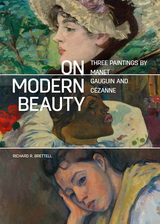 On Modern Beauty: Three Paintings by Manet, Gauguin, and Cézanne
Richard R. Brettell
J. Paul Getty Trust, The, 2019 A thought-provoking examination of beauty using three works of art by Manet, Gauguin, and Cézanne. As the discipline of art history has moved away from connoisseurship, the notion of beauty has become increasingly problematic. Both culturally and personally subjective, the term is difficult to define and nearly universally avoided. In this insightful book, Richard R. Brettell, one of the leading authorities on Impressionism and French art of the nineteenth and early twentieth centuries, dares to confront the concept of modern beauty head-on. This is not a study of aesthetic philosophy, but rather a richly contextualized look at the ambitions of specific artists and artworks at a particular time and place.
Brettell shapes his manifesto around three masterworks from the collection of the J. Paul Getty Museum: Édouard Manet’s Jeanne (Spring), Paul Gauguin’s Arii Matamoe (The Royal End), and Paul Cézanne’s Young Italian Woman at a Table. The provocative discussion reveals how each of these exceptional paintings, though depicting very different subjects—a fashionable actress, a preserved head, and a weary working woman—enacts a revolutionary, yet enduring, icon of beauty.
 On Modern Poetry
Guido Mazzoni
Harvard University Press, 2022 An incisive, unified account of modern poetry in the Western tradition, arguing that the emergence of the lyric as a dominant verse style is emblematic of the age of the individual.
Between the end of the eighteenth century and the beginning of the twentieth, poetry in the West was transformed. The now-common idea that poetry mostly corresponds with the lyric in the modern sense—a genre in which a first-person speaker talks self-referentially—was foreign to ancient, medieval, and Renaissance poetics. Yet in a relatively short time, age-old habits gave way. Poets acquired unprecedented freedom to write obscurely about private experiences, break rules of meter and syntax, use new vocabulary, and entangle first-person speakers with their own real-life identities. Poetry thus became the most subjective genre of modern literature.
On Modern Poetry reconstructs this metamorphosis, combining theoretical reflections with literary history and close readings of poets from Giacomo Leopardi to Louise Glück. Guido Mazzoni shows that the evolution of modern poetry involved significant changes in the way poetry was perceived, encouraged the construction of first-person poetic personas, and dramatically altered verse style. He interprets these developments as symptoms of profound historical and cultural shifts in the modern period: the crisis of tradition, the rise of individualism, the privileging of self-expression and its paradoxes. Mazzoni also reflects on the place of poetry in mass culture today, when its role has been largely assumed by popular music.
The result is a rich history of literary modernity and a bold new account of poetry’s transformations across centuries and national traditions.
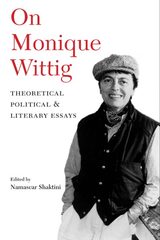 On Monique Wittig: Theoretical, Political, and Literary Essays
Edited by Namascar Shaktini
University of Illinois Press, 2004 Monique Wittig, who died in January 2003, was a leading French feminist, social theorist, prose poet, and novelist--and an activist who helped start the lesbian and women's liberation movements in France. This collection of essays by Wittig and on her work is the first sustained examination in English of her broad-ranging political, literary, and theoretical viewpoints.
On Monique Wittig contains twelve essays, representing French, Francophone, and U.S. critics, including three previously unpublished pieces by Wittig herself. Among the essays is Diane Griffin Crowder's discussion of the U.S. feminist movement, Linda Zerilli's consideration of gender and will, and Teresa de Lauretis's examination of the development of lesbian theory. Together, these essays situate Wittig's work in terms of the cultural contexts of its production and reception. This volume also contains the first authenticated chronology of Wittig's life and features the first translation of "For a Movement of Women's Liberation," which Wittig published with other "militantes" in May 1970.
As the first book to appear on Wittig following her death, On Monique Wittig is an indispensable tool for feminist scholars.
On Monsters and Marvels
Ambroise Pare
University of Chicago Press, 1983 Ambroise Paré, born in France around 1510, was chief surgeon to both Charles IX and Henri III. In one of the first attempts to explain birth defects, Paré produced On Monsters and Marvels, an illustrated encyclopedia of curiosities, of monstrous human and animal births, bizarre beasts, and natural phenomena. Janice Pallister's acclaimed English translation offers a glimpse of the natural world as seen by an extraordinary Renaissance natural philosopher.
 On Moral Personhood: Philosophy, Literature, Criticism, and Self-Understanding
Richard Eldridge
University of Chicago Press, 1989 In this remarkable blend of sophisticated philosophical analysis and close reading of literary texts, Richard Eldridge presents a convincing argument that literature is the most important and richest source of insights in favor of a historicized Kantian moral philosophy. He effectively demonstrates that only through the interpretation of narratives can we test our capacities as persons for acknowledging the moral laws as a formula of value and for acting according to it.
Eldridge presents an extensive new interpretation of Kantian ethics that is deeply informed by Kant's aesthetics. He defends a revised version of Kantian universalism and a Kantian conception of the content of morality. Eldridge then turns to literature armed not with any a priori theory but with an interpretive stance inspired by Hegel's phenomenology of self-understanding, more or less naturalized, and by Wittgenstein's work on self-understanding as ongoing narrative-interpretive activity, a stance that yields Kantian results about the universal demands our nature places on itself.
Eldridge goes on to present readings of novels by Conrad and Austen and poetry by Wordsworth and Coleridge. In each text protagonists are seen to be struggling with moral conflicts and for self-understanding as moral persons. The route toward partial resolution of their conflicts is seen to involve multiple and ongoing activities of reading and interpreting. The result of this kind of interpretation is that such literature—literature that portrays protagonists as themselves readers and interpreters of human capacities for morality—is a primary source for the development of morally significant self-understanding. We see in the careers of these protagonists that there can be genuine and fruitful moral deliberation and valuable action, while also seeing how situated and partial any understanding and achievement of value must remain.
On Moral Personhood at once delineates the moral nature of persons; shows various conditions of the ongoing, contextualized, partial acknowledgment of that nature and of the exercise of the capacities that define it; and enacts an important way of reading literature in relation to moral problems. Eldridge's work will be important reading for moral philosophers (especially those concerned with Kant, Hegel, and issues dividing moral particularists from moral universalists), literary theorists (especially those concerned with the value of literature and its relation to philosophy and to moral problems), and readers and critics of Conrad, Wordsworth, Coleridge, and Austen.
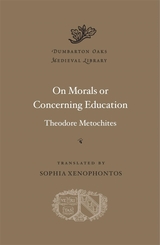 On Morals or Concerning Education
Theodore Metochites
Harvard University Press, 2020 On Morals or Concerning Education is an exhortation on the importance of education by the prolific late-Byzantine author and statesman Theodore Metochites (1270–1332), who rose to the aristocracy from a middle-class background but fell from favor late in life and died as a monk. As a manual of proper living and ethical guidance, the treatise offers unique insights into the heightened roles of philosophy and rhetoric at a time when the elite engaged intensely with their Hellenic heritage, part of a larger imperial attempt to restore Byzantium to its former glories.
On Morals probes hotly disputed issues in fourteenth-century Byzantine society, such as the distinction between the active and contemplative life and the social position of scholars. Metochites’s focus on the character and function of Christian faith also reflects ongoing debates regarding the philosophy of religion. Occasional autobiographical digressions offer fascinating glimpses of Metochites’s distinctive personality.
This volume provides the full Byzantine Greek text alongside the first English translation of one of Metochites’s longest works.
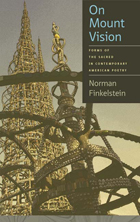 On Mount Vision: Forms of the Sacred in Contemporary American Poetry
Norman Finkelstein
University of Iowa Press, 2010
Plumbing what the poet Michael Palmer calls “the dimension of the Spirit, with that troublesome, rebarbative capital letter,” Norman Finkelstein’s On Mount Vision asks how and why the sacred has remained a basic concern of contemporary experimental poets in our secular age. By charting the wandering, together and apart, of poetry and belief, Finkelstein illustrates the rich tapestry formed by the warp and woof of poetry, and the play of Gnosticism, antinomianism, spiritualism, and shamanism, which have commonly been regarded as heretical and sometimes been outright suppressed.
This beautifully written work begins with an overview of the spiritual problematics found in nineteenth- and early twentieth-century American poetry. Traveling slightly outside of the realm of the contemporary, Finkelstein’s discussions of Emerson, Whitman, and Eliot yield to close readings of the works of Robert Duncan, Jack Spicer, Ronald Johnson, Michael Palmer, Susan Howe, Nathaniel Mackey, and Armand Schwerner. In restoring verse to its place alongside scripture, Finkelstein reminds us why the sacred remains crucial to our understanding of postmodern American poetry.
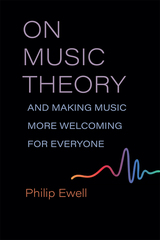 On Music Theory, and Making Music More Welcoming for Everyone
Philip Ewell
University of Michigan Press, 2023 Since its inception in the mid-twentieth century, American music theory has been framed and taught almost exclusively by white men. As a result, whiteness and maleness are woven into the fabric of the field, and BIPOC music theorists face enormous hurdles due to their racial identities. In On Music Theory,Philip Ewell brings together autobiography, music theory and history, and theory and history of race in the United States to offer a black perspective on the state of music theory and to confront the field’s racist roots. Over the course of the book, Ewell undertakes a textbook analysis to unpack the mythologies of whiteness and western-ness with respect to music theory, and gives, for the first time, his perspective on the controversy surrounding the publication of volume 12 of the Journal of Schenkerian Studies. He speaks directly about the antiblackness of music theory and the antisemitism of classical music writ large and concludes by offering suggestions about how we move forward. Taking an explicitly antiracist approach to music theory, with this book Ewell begins to create a space in which those who have been marginalized in music theory can thrive.
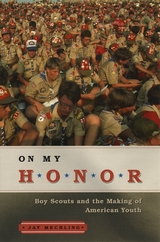 On My Honor: Boy Scouts and the Making of American Youth
Jay Mechling
University of Chicago Press, 2001 In a timely contribution to current debates over the psychology of boys and the construction of their social lives, On My Honor explores the folk customs of adolescent males in the Boy Scouts of America during a summer encampment in California's Sierra Nevada. Drawing on more than twenty years of research and extensive visits and interviews with members of the troop, Mechling uncovers the key rituals and play events through which the Boy Scouts shapes boys into men. He describes the campfire songs, initiation rites, games, and activities that are used to mold the Scouts into responsible adults.
The themes of honor and character alternate in this new study as we witness troop leaders offering examples in structure, discipline, and guidance, and teaching scouts the difficult balance between freedom and self-control. What results is a probing look into the inner lives of boys in our culture and their rocky transition into manhood. On My Honor provides a provocative, sometimes shocking glimpse into the sexual awakening and moral development of young men coming to grips with their nascent desires, their innate aggressions, their inclination toward peer pressure and violence, and their social acculturation.
On My Honor ultimately shows how the Boy Scouts of America continues to edify and mentor young men against the backdrop of controversies over freedom of religious expression, homosexuality, and the proposed inclusion of female members. While the organization's bureaucracy has taken an unyielding stance against gay men and atheists, real live Scouts are often more open to plurality than we might assume. In their embrace of tolerance, acceptance, and understanding, troop leaders at the local level have the power to shape boys into emotionally mature men.
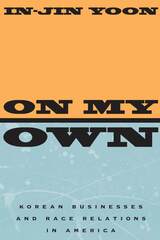 On My Own: Korean Businesses and Race Relations in America
In-Jin Yoon
University of Chicago Press, 1997 The Los Angeles riots shattered Korean immigrants’ naive belief in the American dream. As many as 2,300 Korean shopkeepers lost their lifetime investments in one day. Korean immigrants had struggled for years to become economically independent through small businesses of their own. However, the riots made them realize how fragile their economic base is because their businesses are dependent on the impoverished, oppressed, and rebellious classes.
In On My Own, In-Jin Yoon combines an intimate fieldwork account of Korean-black relations in Chicago and Los Angeles with extensive quantitative analysis at the national level. Yoon argues that a complete understanding of the contemporary Korean-American community requires systematic analyses of patterns of Korean immigration, entrepreneurship, and race relations with other minority groups. He explains how small business has become the major economic activity of Korean immigrants and how Korean businesses in minority neighborhoods have intensified racial tensions between Koreans and minorities like blacks and Latinos.
“A groundbreaking study of Korean-black relations. Yoon’s insights on immigration, entrepreneurship, and race relations significantly enhance our understanding of urban racial tensions.”—William Julius Wilson, Harvard University
On Narrative
W. J. T. Mitchell
University of Chicago Press, 1981 The fourteen distinguished contributors to this volume explore ways we tell, understand, and use stories. More important, through their exploration they collectively demonstrate that the study of narrative, like the study of other significant human creations, has taken a quantum leap in the modern era. No longer the province of literary specialists who borrow their terms from psychology or linguistics, the study of narrative has become and invaluable source of insight for all the branches of human and natural science. Multidisciplinary in scope, these essays dramatize and and clarify the most fundamental debates about the nature and value of narrative as a means by which human beings attempt to represent and make sense of the world.
On Nature
Leroy S. Rouner
University of Notre Dame Press, 1984
On Niebuhr: A Theological Study
Langdon Gilkey
University of Chicago Press, 2001 Langdon Gilkey's insightful, engaging book offers a detailed—and not uncritical—examination of one of the most influential American theologians of the twentieth century.
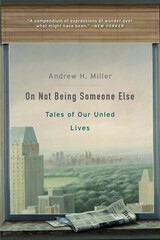 On Not Being Someone Else: Tales of Our Unled Lives
Andrew H. Miller
Harvard University Press, 2020 “To be someone—to be anyone—is about…not being someone else. Miller’s amused and inspired book is utterly compelling.”
—Adam Phillips
“A compendium of expressions of wonder over what might have been…Swept up in our real lives, we quickly forget about the unreal ones. Still, there will be moments when, for good or ill, we feel confronted by our unrealized possibilities.”
—New Yorker
We live one life, formed by paths taken and untaken. Choosing a job, getting married, deciding on a place to live or whether to have children—every decision precludes another. But what if you’d gone the other way?
From Robert Frost to Sharon Olds, Virginia Woolf to Ian McEwan, Jane Hirshfield to Carl Dennis, storytellers of every stripe consider the roads not taken, the lives we haven’t led. What is it that compels us to identify with fictional and poetic voices tantalizing us with the shadows of what might have been? Not only poets and novelists, but psychologists and philosophers have much to say on this question. Miller finds wisdom in all of these, revealing the beauty, the allure, and the danger of sustaining or confronting our unled lives.
“Miller is charming company, both humanly and intellectually. He is onto something: the theme of unled lives, and the fascinating idea that fiction intensifies the sense of provisionality that attends all lives. An extremely attractive book.”
—James Wood
“An expertly curated tour of regret and envy in literature…Miller’s insightful and moving book—both in his own discussion and in the tales he recounts—gently nudges us toward consolation.”
—Wall Street Journal
“I wish I had written this book…Examining art’s capacity to transfix, multiply, and compress, this book is itself a work of art.”
—Times Higher Education
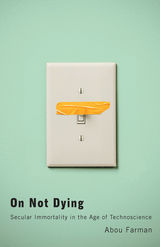 On Not Dying: Secular Immortality in the Age of Technoscience
Abou Farman
University of Minnesota Press, 2020 An ethnographic exploration of technoscientific immortality
Immortality has long been considered the domain of religion. But immortality projects have gained increasing legitimacy and power in the world of science and technology. With recent rapid advances in biology, nanotechnology, and artificial intelligence, secular immortalists hope for and work toward a future without death. On Not Dying is an anthropological, historical, and philosophical exploration of immortality as a secular and scientific category. Based on an ethnography of immortalist communities—those who believe humans can extend their personal existence indefinitely through technological means—and an examination of other institutions involved at the end of life, Abou Farman argues that secular immortalism is an important site to explore the tensions inherent in secularism: how to accept death but extend life; knowing the future is open but your future is finite; that life has meaning but the universe is meaningless. As secularism denies a soul, an afterlife, and a cosmic purpose, conflicts arise around the relationship of mind and body, individual finitude and the infinity of time and the cosmos, and the purpose of life. Immortalism today, Farman argues, is shaped by these historical and culturally situated tensions. Immortalist projects go beyond extending life, confronting dualism and cosmic alienation by imagining (and producing) informatic selves separate from the biological body but connected to a cosmic unfolding. On Not Dying interrogates the social implications of technoscientific immortalism and raises important political questions. Whose life will be extended? Will these technologies be available to all, or will they reproduce racial and geopolitical hierarchies? As human life on earth is threatened in the Anthropocene, why should life be extended, and what will that prolonged existence look like?
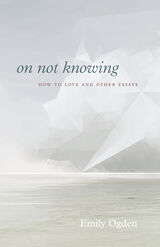 On Not Knowing: How to Love and Other Essays
Emily Ogden
University of Chicago Press, 2022 A beautifully written suite of personal essays on the value of not knowing.
Moments of clarity are rare and fleeting; how can we become comfortable outside of them, in the more general condition of uncertainty within which we make our lives? Written by English professor Emily Ogden while her children were small, On Not Knowing forays into this rich, ambivalent space. Each of her sharply observed essays invites the reader to think with her about questions she can’t set aside: not knowing how to give birth, to listen, to hold it together, to love.
Unapologetically capacious in her range of reference and idiosyncratic in the canon she draws on, Ogden moves nimbly among the registers of experience, from the operation of a breast pump to the art of herding cattle; from one-night stands to the stories of Edgar Allan Poe; from kayaking near a whale to a psychoanalytic meditation on drowning. Committed to the accumulation of knowledge, Ogden nonetheless finds that knowingness for her can be a way of getting stuck, a way of not really living. Rather than the defensiveness of willful ignorance, On Not Knowing celebrates the defenselessness of not knowing yet—possibly of not knowing ever. Ultimately, this book shows how resisting the temptation of knowingness and embracing the position of not knowing becomes a form of love.
On Novels and Novelists
Jean-Paul Sartre
Seagull Books, 2021 A collection of essays on renowned French writers, including Sarraute, Renard, and Gide.
Iconic French novelist, playwright, and essayist Jean-Paul Sartre is widely recognized as one of the most important philosophers of the twentieth century, and his work has remained relevant and thought-provoking through the decades. The Seagull Sartre Library now presents some of his most incisive philosophical, cultural, and literary critical essays in twelve newly designed and affordable editions.
In this collection of brief, insightful essays, we find ourselves face to face with Sartre the literary critic, as he carefully examines the works of renowned French writers such as François Mauriac, Nathalie Sarraute, Jean Giraudoux, and Jules Renard. Most moving is an essay on André Gide, written right after his death, in which Sartre writes, “We thought him scared and embalmed; he dies and we discover how alive he was.”
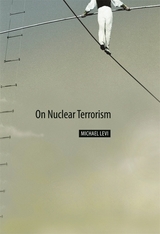 On Nuclear Terrorism
Michael Levi
Harvard University Press, 2007 Nuclear terrorism is such a disturbing prospect that we shy away from its details. Yet as a consequence, we fail to understand how best to defeat it. Michael Levi takes us inside nuclear terrorism and behind the decisions a terrorist leader would be faced with in pursuing a nuclear plot. Along the way, Levi identifies the many obstacles, large and small, that such a terrorist scheme might encounter, allowing him to discover a host of ways that any plan might be foiled.
Surveying the broad universe of plots and defenses, this accessible account shows how a wide-ranging defense that integrates the tools of weapon and materials security, law enforcement, intelligence, border controls, diplomacy, and the military can multiply, intensify, and compound the possibility that nuclear terrorists will fail. Levi draws from our long experience with terrorism and cautions us not to focus solely on the most harrowing yet most improbable threats. Nuclear terrorism shares much in common with other terrorist threats--and as a result, he argues, defeating it is impossible unless we put our entire counterterrorism and homeland security house in order.
As long as we live in a nuclear age, no defense can completely eliminate nuclear terrorism. But this book reminds us that the right strategy can minimize the risks and shows us how to do it.
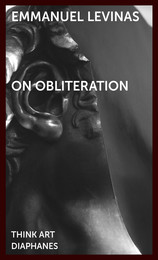 On Obliteration: An Interview with Françoise Armengaud Concerning the Work of Sacha Sosno
Emmanuel Levinas
Diaphanes, 2019 Emmanuel Levinas’s interview with Françoise Armengaud in 1988 is one of the only statements we have from the philosopher, who became influential in various disciplines through his ethics that focuses on the fine arts specifically. Presented in English for the first time here, this interview brings us Levinas’s understanding of “obliteration” as an uncanny, disruptive, and even “unavailable” concept. Discussing the work of the French sculptor Sacha Sosno, Levinas parses the complex relationship between ethics and aesthetics, examining how they play out in artistic operations and practices. In doing so, he turns away from the “ease and lighthearted casualness of the beautiful” to shed light instead on the processes of material wear and tear and the traces of repair that go into the creation and maintenance of works of art, and which ultimately give them a profound uniqueness of presence. This evocative interview uncovers a hidden thread of aesthetic thinking in Levinas’s work and introduces a new way of looking at artistic practices in general.
 On Old Age. On Friendship. On Divination
Cicero
Harvard University Press, 1992 Three late dialogues.
Cicero (Marcus Tullius, 106–43 BC), Roman lawyer, orator, politician, and philosopher, of whom we know more than of any other Roman, lived through the stirring era that saw the rise, dictatorship, and death of Julius Caesar in a tottering republic. In his political speeches especially and in his correspondence we see the excitement, tension and intrigue of politics and the part he played in the turmoil of the time. Of about 106 speeches, delivered before the Roman people or the Senate if they were political, before jurors if judicial, fifty-eight survive (a few of them incompletely). In the fourteenth century Petrarch and other Italian humanists discovered manuscripts containing more than 900 letters of which more than 800 were written by Cicero and nearly 100 by others to him. These afford a revelation of the man all the more striking because most were not written for publication. Six rhetorical works survive and another in fragments. Philosophical works include seven extant major compositions and a number of others; and some lost. There is also poetry, some original, some as translations from the Greek.
The Loeb Classical Library edition of Cicero is in twenty-nine volumes.
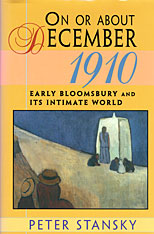 On or About December 1910: Early Bloomsbury and Its Intimate World
Peter Stansky
Harvard University Press, 1996 On or about December 1910 human character changed, Virginia Woolf remarked, and well she might have. The company she kept, the Bloomsbury circle, took shape before the coming of World War I, and would have a lasting impact on English society and culture after the war. This book captures the dazzling world of Bloomsbury at the end of an era, and on the eve of modernism.
Peter Stansky depicts the vanguard of a rising generation seizing its moment. He shows us Woolf in that fateful year, in the midst of an emotional breakdown, reaching a turning point with her first novel, The Voyage Out, and E. M. Forster, already a success, offering Howards End and acknowledging his passion for another man. Here are Roger Fry, prominent art critic and connoisseur, remaking tradition with the epochal exhibition “Manet and the Post-Impressionists”; Vanessa Bell and Duncan Grant beginning their most interesting phase as artists; Lytton Strachey signing the contract for his first book; and John Maynard Keynes entering a significant new stage in his illustrious career.
Amid the glittering opulence and dismal poverty, the swirl of Suffragists, anarchists, agitators, and organizers, Stansky—drawing upon his historical and literary skills—brings the intimate world of the Bloomsbury group to life. Their lives, relationships, writings, and ideas entwine, casting one member after another in sharp relief. Even their Dreadnought Hoax, a trick played on the sacred institution of the navy, reveals their boldness and esprit. The picture Stansky presents, with all its drama and detail, encompasses the conflicts and sureties of a changing world of politics, aesthetics, and character.
On Our Own Ground: The Complete Writings of William Apess, a Pequot
William Apess
University of Massachusetts Press, 1992 William Apess was the first Native American’s to fully, and publicly, speak out regarding the racism and unfair treatment that he and others endured. The author’s writing is eloquently delivered, instilling the reader with a realistic framework of a polit
 On Our Own, Together: Peer Programs for People with Mental Illness
Sally Clay
Vanderbilt University Press, 2005 On Our Own, Together describes the inner workings of eight successful peer-run services for mental health consumers, including drop-in centers, educational programs, and peer support/mentoring programs. Written by people who developed such programs, it reveals these services as a valuable resource within the mental health system and a precious necessity for many consumers.
The book clusters the COSPs into three key types: drop-in centers, which provide varied services for their members, including meals, housing assistance, and stigma-free environments; educational programs, which train mental health consumers in recovery skills for themselves and for other consumers; and services based on peer support and mentoring.
Despite their differences, the book shows, the programs share many essential characteristics. Most significantly, they demonstrate the benefits of allowing mental health consumers to operate and govern their own organizations. Also important is their emphasis on equality, mutuality, empowerment, recovery, belonging, and hope in administering services. Such core values, the book suggests, distinguish peer-run programs from the professional services that have long dominated the mental health system.
In contrast to the dry, clinical reports that make up much of the current literature, this book is written "from the inside out" and, for the most part, by the people who developed the programs and who live them every day. It reveals peer-run programs as valuable resources within the mental health system and, indeed, a precious necessity for many consumers.
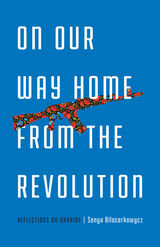 On Our Way Home from the Revolution: Reflections on Ukraine
Sonya Bilocerkowycz
Ohio State University Press, 2019 One of USA Today's “10 books to help understand what's happening in Russia and Ukraine” In 2014 Sonya Bilocerkowycz is a tourist at a deadly revolution. At first she is enamored with the Ukrainians’ idealism, which reminds her of her own patriotic family. But when the romantic revolution melts into a war with Russia, she becomes disillusioned, prompting a return home to the US and the diaspora community that raised her. As the daughter of a man who studies Ukrainian dissidents for a living, the granddaughter of war refugees, and the great-granddaughter of a gulag victim, Bilocerkowycz has inherited a legacy of political oppression. But what does it mean when she discovers a missing page from her family’s survival story—one that raises questions about her own guilt? In these linked essays, Bilocerkowycz invites readers to meet a swirling cast of post-Soviet characters, including a Russian intelligence officer who finds Osama bin Laden a few weeks after 9/11; a Ukrainian poet whose nose gets broken by Russian separatists; and a long-lost relative who drives a bus into the heart of Chernobyl. On Our Way Home from the Revolution muddles our easy distinctions between innocence and culpability, agency and fate.
 On Painting: Courses, March-June 1981
Gilles Deleuze
University of Minnesota Press, 2025 Available for the first time in English: the complete and annotated transcripts of Deleuze’s 1981 seminars on painting From 1970 until 1987, Gilles Deleuze held a weekly seminar at the Experimental University of Vincennes and, starting in 1980, at Saint-Denis. In the spring of 1981, he began a series of eight seminars on painting and its intersections with philosophy. The recorded sessions, newly transcribed and translated into English, are now available in their entirety for the first time. Extensively annotated by philosopher David Lapoujade, On Painting illuminates Deleuze’s thinking on artistic creation, significantly extending the lines of thought in his book Francis Bacon. Through paintings and writing by Rembrandt, Delacroix, Turner, Cézanne, Van Gogh, Klee, Pollock, and Bacon, Deleuze explores the creative process, from chaos to the pictorial fact. The introduction and use of color feature prominently as Deleuze elaborates on artistic and philosophical concepts such as the diagram, modulation, code, and the digital and the analogical. Through this scrutiny, he raises a series of profound and stimulating questions for his students: How does a painter ward off grayness and attain color? What is a line without contour? Why paint at all? Written and thought in a rhizomatic manner that is thoroughly Deleuzian—strange, powerful, and novel—On Painting traverses both the conception of art history and the possibility of color as a philosophical concept. Retail e-book files for this title are screen-reader friendly with images accompanied by short alt text and/or extended descriptions.
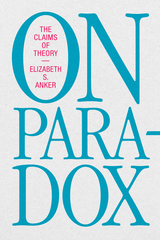 On Paradox: The Claims of Theory
Elizabeth S. Anker
Duke University Press, 2022 In On Paradox literary and legal scholar Elizabeth S. Anker contends that faith in the logic of paradox has been the cornerstone of left intellectualism since the second half of the twentieth century. She attributes the ubiquity of paradox in the humanities to its appeal as an incisive tool for exposing and dismantling hierarchies. Tracing the ascent of paradox in theories of modernity, in rights discourse, in the history of literary criticism and the linguistic turn, and in the transformation of the liberal arts in higher education, Anker suggests that paradox not only generates the very exclusions it critiques but also creates a disempowering haze of indecision. She shows that reasoning through paradox has become deeply problematic: it engrains a startling homogeneity of thought while undercutting the commitment to social justice that remains a guiding imperative of theory. Rather than calling for a wholesale abandonment of such reasoning, Anker argues for an expanded, diversified theory toolkit that can help theorists escape the seductions and traps of paradox.
 On Parliamentary War: Partisan Conflict and Procedural Change in the U.S. Senate
James I. Wallner
University of Michigan Press, 2017
Dysfunction in the contemporary Senate is driven by the deteriorating relationship between the majority and minority parties in the institution. In this environment, regular order is virtually nonexistent and unorthodox parliamentary procedures are frequently needed to pass important legislation. This is because Democrats and Republicans are now fighting a parliamentary war in the Senate to help steer the future direction of the country. James Wallner presents a new, bargaining model of procedural change to better explain the persistence of the filibuster in the current polarized environment, and focuses on the dynamics ultimately responsible for the nature and direction of contested procedural change. Wallner’s model explains why Senate majorities have historically tolerated the filibuster, even when it has been used to defeat their agenda, despite having the power to eliminate it unilaterally at any point. It also improves understanding of why the then-Democratic majority chose to depart from past practice when they utilized the nuclear option to eliminate the filibuster for one of President Barack Obama’s judicial nominees in 2013. On Parliamentary War’s game-theoretic approach provides a more accurate understanding of the relationship between partisan conflict and procedural change in the contemporary Senate.
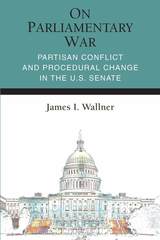 On Parliamentary War: Partisan Conflict and Procedural Change in the U.S. Senate
James I. Wallner
University of Michigan Press, 2019 Dysfunction in the Senate is driven by the deteriorating relationship between the majority and minority parties. Regular order is virtually nonexistent and unorthodox parliamentary procedures are frequently needed to pass important legislation. Democrats and Republicans are fighting a parliamentary war in the Senate to steer the future of the country. James Wallner presents a bargaining model of procedural change to explain the persistence of the filibuster in this polarized environment, focusing on the dynamics responsible for contested procedural change. Wallner’s model explains why Senate majorities have historically tolerated the filibuster, even when it has defeated their agendas, despite having the power to eliminate it. It also shows why the then-Democratic majority deployed the nuclear option to eliminate the filibuster for an Obama judicial nominee in 2013. On Parliamentary War’s game-theory approach unveils the relationship between partisan conflict and procedural change in the Senate.
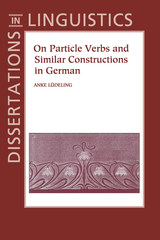 On Particle Verbs and Similar Constructions in German
Anke Lüdeling
CSLI, 2001 Linguistic distinctions between the notions of a phrase, a word, and their components are challenged by so-called particle verbs in German and similar features in other languages. Particle verbs look like single words, yet are typically assembled from word-like fragments that together behave more like components of a phrase than of a word. The resolution of existing scholarly ambivalence has exciting ramifications, from questioning the existence of particle verbs to a broader understanding of what constitutes a word.
Particle verbs have previously been analyzed as morphological objects or as phrasal constructions, but neither approach fits cleanly within its chosen framework. The resolution presented here is that particle verbs should be seen as lexicalized phrasal constructions. Emphasizing morphological and syntactic testability, over a hundred colloquial examples are shown to break the rules of previous approaches while remaining consistent with this book's proposition. To distinguish particle verbs from similar constructions, and to demonstrate how structural and morphological factors have been misidentified in the past, preverb verb constructions (PVCs) are introduced and diagrammed. This reveals the roles of listedness and non-transparency in word formation and clarifies the conclusion that particle verbs do not form a definable class of words.
 On Persistence
Rebecca Comay
Seagull Books, 2026 A bold meditation on endurance as interruption rather than progress, offering a radical rethinking of time, agency, and survival.
On Persistence is an exploration into the elusive, unruly force of endurance—not as moral virtue or capitalist work ethic, but as a temporal and affective structure that resists assimilation. In these wide-ranging philosophical and literary essays, Rebecca Comay interrogates what it means to persist when progress stalls and resolution fails to arrive. Engaging figures from Freud to Beckett, Proust to Benjamin, Hamlet to Niobe, Comay tracks the strange temporality of suspended life: interminable mourning, unfinished projects, the persistence of the past, the undead stirrings of the death drive. What emerges is a radically different model of time—neither static nor teleological, but a form of interruption that opens space for rethinking agency, grief, resistance, and repair.
On Persistence offers a profound meditation on what it means to endure—and to endure differently—in a time that demands something else of us.
 On Petrocultures: Globalization, Culture, and Energy
Imre Szeman
West Virginia University Press, 2019 On Petrocultures brings together key essays by Imre Szeman, a leading scholar in the field of energy humanities and a critical voice in debates about globalization and neoliberalism. Szeman’s most important and influential essays, in dialogue with exciting new pieces written for the book, investigate ever-evolving circuits of power in the contemporary world, as manifested in struggles over space and belonging, redefinitions of work and individual autonomy, and the deep links between energy use and climate change.
These essays explore life lived in the twenty-first century by examining critically the vocabulary through which capitalism makes sense of itself, focusing on concepts like the nation, globalization, neoliberalism, creativity, and entrepreneurship. At the heart of the volume is the concept of “petrocultures,” which demands that we understand a fundamental fact of modern life: we are shaped by and through fossil fuels. Szeman argues that we cannot take steps to address global warming without fundamentally changing the social, cultural, and political norms and expectations developed in conjunction with the energy riches of the past century. On Petrocultures maps the significant challenge of our dependence on fossil fuels and probes ways we might begin to leave petrocultures behind.
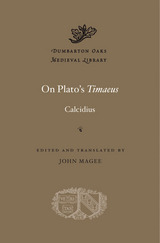 On Plato’s Timaeus
Calcidius
Harvard University Press, 2016 Until the Renaissance, the work of Calcidius offered the medieval West almost the only direct access to Plato’s corpus not dispersed in fragments. In the 4th century CE, Calcidius translated into Latin an important section of Plato’s Timaeus, complemented by extensive commentary and organized into coordinated parts. The first part is broadly devoted to the architecture of the world, to its intelligible structure. The second delves into the nature of the living creatures that inhabit it. This basic division subsequently informed the sense of macrocosm and microcosm—of the world and our place in it—which is prevalent in western European thought in the Middle Ages. At the same time, this medieval volume altered perspectives on Plato by drawing on other philosophical traditions, particularly the Stoic and Peripatetic, while including Judeo-Christian cosmology and anthropology. The present edition provides the first English translation of Calcidius’s work.
On Poe: The Best from American Literature
Louis J. Budd and Edwin H. Cady, eds.
Duke University Press, 1993 From 1929 to the latest issue, American Literature has been the foremost journal expressing the findings of those who study our national literature. The journal has published the best work of literary historians, critics, and bibliographers, ranging from the founders of the discipline to the best current critics and researchers. The longevity of this excellence lends a special distinction to the articles in American Literature.
Presented in order of their first appearance, the articles in each volume constitute a revealing record of developing insights and important shifts of critical emphasis. Each article has opened a fresh line of inquiry, established a fresh perspective on a familiar topic, or settled a question that engaged the interest of experts.
On Poetry
Jean-Paul Sartre
Seagull Books, 2021 Two long Sartre essays that explore the Négritude poetry movement and the work of French writer Francis Ponge.
Iconic French novelist, playwright, and essayist Jean-Paul Sartre is widely recognized as one of the most important philosophers of the twentieth century, and his work has remained relevant and thought-provoking through the decades. The Seagull Sartre Library now presents some of his most incisive philosophical, cultural, and literary critical essays in twelve newly designed and affordable editions.
On Poetry includes two long essays in this slim volume. The first explores the Négritude poetry movement by analyzing the work of several Black poets of the time. The second is a meditation on the poetry of renowned French author Francis Ponge (1899–1988), who, influenced by surrealism, developed his unique form of prose poetry.
 On Poetry
Glyn Maxwell
Harvard University Press, 2016 “This is a book for anyone,” Glyn Maxwell declares of On Poetry. A guide to the writing of poetry and a defense of the art, it will be especially prized by writers and readers who wish to understand why and how poetic technique matters. When Maxwell states, “With rhyme what matters is the distance between rhymes” or “the line-break is punctuation,” he compresses into simple, memorable phrases a great deal of practical wisdom.
In seven chapters whose weird, gnomic titles announce the singularity of the book—“White,” “Black,” “Form,” “Pulse,” “Chime,” “Space,” and “Time”—the poet explores his belief that the greatest verse arises from a harmony of mind and body, and that poetic forms originate in human necessities: breath, heartbeat, footstep, posture. “The sound of form in poetry descended from song, molded by breath, is the sound of that creature yearning to leave a mark. The meter says tick-tock. The rhyme says remember. The whiteness says alone,” Maxwell writes. To illustrate his argument, he draws upon personal touchstones such as Emily Dickinson and Robert Frost. An experienced teacher, Maxwell also takes us inside the world of the creative writing class, where we learn from the experiences of four aspiring poets.
“You master form you master time,” Maxwell says. In this guide to the most ancient and sublime of the realms of literature, Maxwell shares his mastery with us.
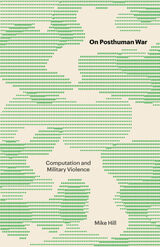 On Posthuman War: Computation and Military Violence
Mike Hill
University of Minnesota Press, 2022 Tracing war’s expansion beyond the battlefield to the concept of the human being itself
As military and other forms of political violence become the planetary norm, On Posthuman War traces the expansion of war beyond traditional theaters of battle. Drawing on counterinsurgency field manuals, tactical manifestos, data-driven military theory, and asymmetrical-war archives, Mike Hill delineates new “Areas of Operation” within a concept of the human being as not only a social and biological entity but also a technical one. Delving into three human-focused disciplines newly turned against humanity, OnPosthuman War reveals how demography, anthropology, and neuroscience have intertwined since 9/11 amid the “Revolution in Military Affairs.” Beginning with the author’s personal experience training with U.S. Marine recruits at Parris Island, Hill gleans insights from realist philosophy, the new materialism, and computational theory to show how the human being, per se, has been reconstituted from neutral citizen to unwitting combatant. As evident in the call for “bullets, beans, and data,” whatever can be parted out, counted, and reassembled can become war materiel. Hill shows how visible and invisible wars within identity, community, and cognition shift public-sphere activities, like racial identification, group organization, and even thought itself, in the direction of war. This shift has weaponized social activities against the very notion of society. On Posthuman War delivers insights on the latest war technologies, strategies, and tactics while engaging in questions poised to overturn the foundations of modern political thought.
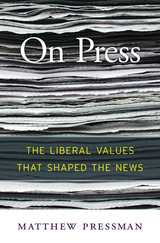 On Press: The Liberal Values That Shaped the News
Matthew Pressman
Harvard University Press, 2018 “The ultimate story behind all the stories… In an age when the press is alternately villain or hero, Pressman serves as a kind of medicine man of journalism, telling us how we got from there to here.”—Graydon Carter, former editor of Vanity Fair
In the 1960s and 1970s, the American press embraced a new way of reporting and selling the news. The causes were many: the proliferation of television, pressure to rectify the news media’s dismal treatment of minorities and women, accusations of bias from left and right, and the migration of affluent subscribers to suburbs. As Matthew Pressman’s timely history reveals, during these tumultuous decades the core values that held the profession together broke apart, and the distinctive characteristics of contemporary American journalism emerged.
Simply reporting the facts was no longer enough. In a country facing assassinations, a failing war in Vietnam, and presidential impeachment, reporters recognized a pressing need to interpret and analyze events for their readers. Objectivity and impartiality, the cornerstones of journalistic principle, were not jettisoned, but they were reimagined. Journalists’ adoption of an adversarial relationship with government and big business, along with sympathy for the dispossessed, gave their reporting a distinctly liberal drift. Yet at the same time, “soft news”—lifestyle, arts, entertainment—moved to the forefront of editors’ concerns, as profits took precedence over politics.
Today, the American press stands once again at a precipice. Accusations of political bias are more rampant than ever, and there are increasing calls from activists, customers, advertisers, and reporters themselves to rethink the values that drive the industry. As On Press suggests, today’s controversies—the latest iteration of debates that began a half-century ago—will likely take the press in unforeseen directions and challenge its survival.
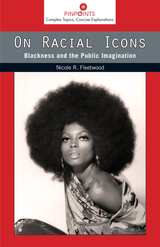 On Racial Icons: Blackness and the Public Imagination
Fleetwood, Nicole R
Rutgers University Press, 2015 What meaning does the American public attach to images of key black political, social, and cultural figures? Considering photography’s role as a means of documenting historical progress, what is the representational currency of these images? How do racial icons “signify”?
Nicole R. Fleetwood’s answers to these questions will change the way you think about the next photograph that you see depicting a racial event, black celebrity, or public figure. In On Racial Icons, Fleetwood focuses a sustained look on photography in documenting black public life, exploring the ways in which iconic images function as celebrations of national and racial progress at times or as a gauge of collective racial wounds in moments of crisis.
Offering an overview of photography’s ability to capture shifting race relations, Fleetwood spotlights in each chapter a different set of iconic images in key sectors of public life. She considers flash points of racialized violence in photographs of Trayvon Martin and Emmett Till; the political, aesthetic, and cultural shifts marked by the rise of pop stars such as Diana Ross; and the power and precarity of such black sports icons as Serena Williams and LeBron James; and she does not miss Barack Obama and his family along the way. On Racial Icons is an eye-opener in every sense of the phrase.
Images from the book. (http://rutgerspress.rutgers.edu/pages/Fleetwood.aspx)
On Reading the Constitution
Laurence H. Tribe and Michael C. Dorf
Harvard University Press, 1991 Our Constitution speaks in general terms of “liberty” and “property,” of the “privileges and immunities” of citizens, and of the “equal protection of the laws”—open-ended phrases that seem to invite readers to reflect in them their own visions and agendas. Yet, recognizing that the Constitution cannot be merely what its interpreters wish it to be, this volume’s authors draw on literary and mathematical analogies to explore how the fundamental charter of American government should be construed today.
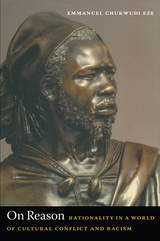 On Reason: Rationality in a World of Cultural Conflict and Racism
Emmanuel Chukwudi Eze
Duke University Press, 2008 Given that Enlightenment rationality developed in Europe as European nations aggressively claimed other parts of the world for their own enrichment, scholars have made rationality the subject of postcolonial critique, questioning its universality and objectivity. In On Reason, the late philosopher Emmanuel Chukwudi Eze demonstrates that rationality, and by extension philosophy, need not be renounced as manifestations or tools of Western imperialism. Examining reason in connection to the politics of difference—the cluster of issues known variously as cultural diversity, political correctness, the culture wars, and identity politics—Eze expounds a rigorous argument that reason is produced through and because of difference. In so doing, he preserves reason as a human property while at the same time showing that it cannot be thought outside the realities of cultural diversity. Advocating rationality in a multicultural world, he proposes new ways of affirming both identity and difference. Eze draws on an extraordinary command of Western philosophical thought and a deep knowledge of African philosophy and cultural traditions. He explores models of rationality in the thought of philosophers from Aristotle, René Descartes, Francis Bacon, and Thomas Hobbes to Noam Chomsky, Richard Rorty, Hilary Putnam, and Jacques Derrida, and he considers portrayals of reason in the work of the African thinkers and novelists Chinua Achebe, Ngugi wa Thiong’o, and Wole Soyinka. Eze reflects on contemporary thought about genetics, race, and postcolonial historiography as well as on the interplay between reason and unreason in the hearings of South Africa’s Truth and Reconciliation Commission. He contends that while rationality may have a foundational formality, any understanding of its foundation and form is dynamic, always based in historical and cultural circumstances.
On Record: Files and Dossiers in American Life
Stanton Wheeler
Russell Sage Foundation, 1970 On Record provides descriptive accounts of record keeping in a variety of important organizations: schools, from elementary to graduate school; consumer credit agencies, general business organizations, and life insurance companies; the military and security agencies; the Census Bureau and the Social Security Administration; public welfare agencies, juvenile courts, and mental hospitals. It also examines the legal status of records. The authors pose questions such as the following: Who determines what records are kept? Who has access to the records?
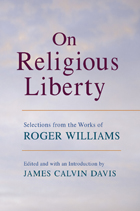 On Religious Liberty: Selections from the Works of Roger Williams
Roger Williams
Harvard University Press, 2012 Banished from the Massachusetts Bay Colony for his refusal to conform to Puritan religious and social standards, Roger Williams established a haven in Rhode Island for those persecuted in the name of the religious establishment. He conducted a lifelong debate over religious freedom with distinguished figures of the seventeenth century, including Puritan minister John Cotton, Massachusetts governor John Endicott, and the English Parliament.
James Calvin Davis gathers together important selections from Williams’s public and private writings on religious liberty, illustrating how this renegade Puritan radically reinterpreted Christian moral theology and the events of his day in a powerful argument for freedom of conscience and the separation of church and state. For Williams, the enforcement of religious uniformity violated the basic values of Calvinist Christianity and presumed upon God’s authority to speak to the individual conscience. He argued that state coercion was rarely effective, often causing more harm to the church and strife to the social order than did religious pluralism.
This is the first collection of Williams’s writings in forty years reaching beyond his major work, The Bloody Tenent, to include other selections from his public and private writings. This carefully annotated book introduces Williams to a new generation of readers.
 On Religious Liberty: Selections from the Works of Roger Williams
Roger Williams
Harvard University Press Banished from the Massachusetts Bay Colony for his refusal to conform to Puritan religious and social standards, Roger Williams established a haven in Rhode Island for those persecuted in the name of the religious establishment. He conducted a lifelong debate over religious freedom with distinguished figures of the seventeenth century, including Puritan minister John Cotton, Massachusetts governor John Endicott, and the English Parliament.
James Calvin Davis gathers together important selections from Williams’s public and private writings on religious liberty, illustrating how this renegade Puritan radically reinterpreted Christian moral theology and the events of his day in a powerful argument for freedom of conscience and the separation of church and state. For Williams, the enforcement of religious uniformity violated the basic values of Calvinist Christianity and presumed upon God’s authority to speak to the individual conscience. He argued that state coercion was rarely effective, often causing more harm to the church and strife to the social order than did religious pluralism.
This is the first collection of Williams’s writings in forty years reaching beyond his major work, The Bloody Tenent, to include other selections from his public and private writings. This carefully annotated book introduces Williams to a new generation of readers.
|
|

